I forgot about my face
Travel Book
In the course of the last twenty years, I have wandered all over the Earth. Here is what I saw, here is what I felt.
 Maria Palombi
Stefano
Maria Palombi
Stefano

In the course of the last twenty years, I have wandered all over the Earth. Here is what I saw, here is what I felt.
 Maria Palombi
Stefano
Maria Palombi
Stefano
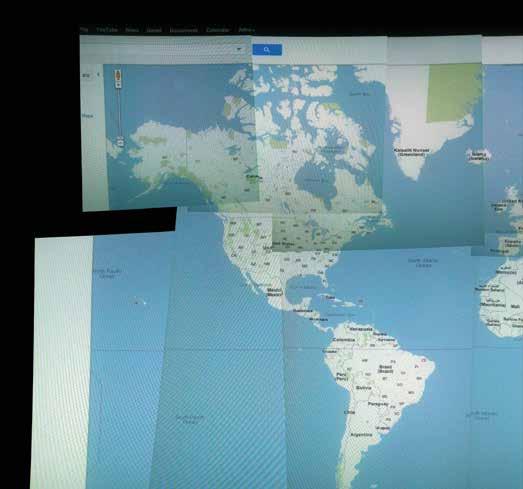



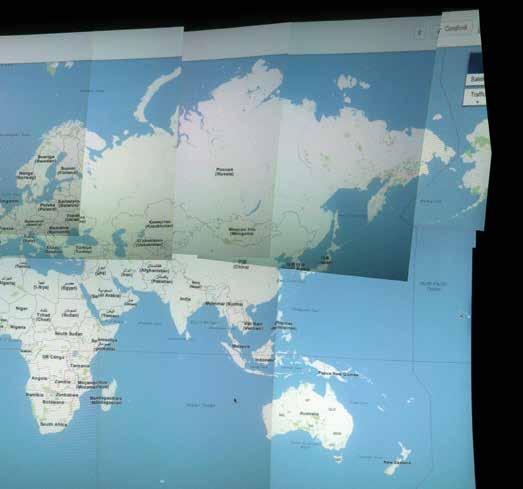






«Too many people busy themselves with sense. Start walking. You are the sense and the path.» (Jean Sullivan)
«On the strength of my long experience as an unemployed person ...». That was how my short CV began when, at the end of 1988, I presented myself for an interview at Saatchi&Saatchi, the famous advertising agency. Marketing, advertising, timetable were all terms entirely foreign to me. In my backpack, I was carrying a few stories and, in my head, a vague idea that perhaps I might have been able to become a copywriter. They told me I could stay for a week. As it turned out, I wound up staying a bit longer: fifteen years. After one month, I was hired, after three years I became a supervisor, after five, a creative director or, rather, the creative director with the greatest number of awards to his name in all of Italy. Coming as I had from a family of lawyers, and perhaps so as to not to feel the burden of guilt for having betrayed a tradition, I started to dedicate a lot of my free time to social campaigns. By day, I worked for the important clients and, by night, for those who were unable to pay. In brief, I became the creative director of lost causes. From the “Panther” student movement to
Doctors Without Borders, from the WWF to the Community of Saint Egidio, from Greenpeace to the Tribunal for Patients’ Rights, from etcetera to etcetera. Then, one fine day, I threw my career to the wind, flushed my prizes down the toilet, and took the decision to dedicate myself to film directing, once again as a self-taught practitioner. I began writing and directing documentaries, short films and the Catholic Church’s campaigns. I traveled to the most forsaken corners of the Earth and told many invisible stories taking place in our own Country. In the course of these travels, in those rare moments when I was neither working nor too tired to do anything but sleep, I wrote. It is not a reportage, or a novel, or even a collection of poems. They are words, my words.
TIRED OR, RATHER, EXHAUSTED after a day of sweat, dust, and emotions squared, I get on the jeep that will take us back to a bed or, perhaps, a simple hammock. I force my sight out the windows as we pass from village to village.
The scenes that were filmed a few hours or many months and miles ago get confused with the images that are now passing in front of my eyes, in a series of very slow dissolves.
EVERYTHING IS MOVING at fifty frames per second, in front of my eyes without a backdrop.
I’M HERE, IN THE POOR AND STARRY CHACO, but also along the Rio Madeira lit and shaken by lightning and thunder. Or in the sky, red as the bill of the Tucans, while behind me the huts of the Bakairi indios fade out.
who, swept like a cloud by the wind of Patagonia, crosses the drunken and sweet Sunday of Antigua Guatemala and leaps across the shit-fragrant puddles of the slum at Kibera or enjoys through his tears the panorama of faces and shacks of the favela Rocinha.
LORD OF AN EMOTIONAL ENERGY, OF A HYPERSENSITIVITY THAT LEADS ME INSIDE, INSIDE, INSIDE ALL THAT I SEE.
And so, all that I have not been, that I lost along the way, all that has made living difficult, made me feel uncomfortable, alone, and perhaps unhappy, now comes back to me in a rush, with open arms. And hugs me tightly and kisses me and caresses me and whispers sweet words to me that make me fall in love.
THERE ISN’T A FRAGILE INSTANT, THERE ISN’T A DETAIL WHICH ESCAPES THE FRAME OF MY GAZE. IN THIS WAY, I SUCCEED IN COMING IN TOUCH WITH THE LIFE THAT IS FLOWING BEFORE ME.

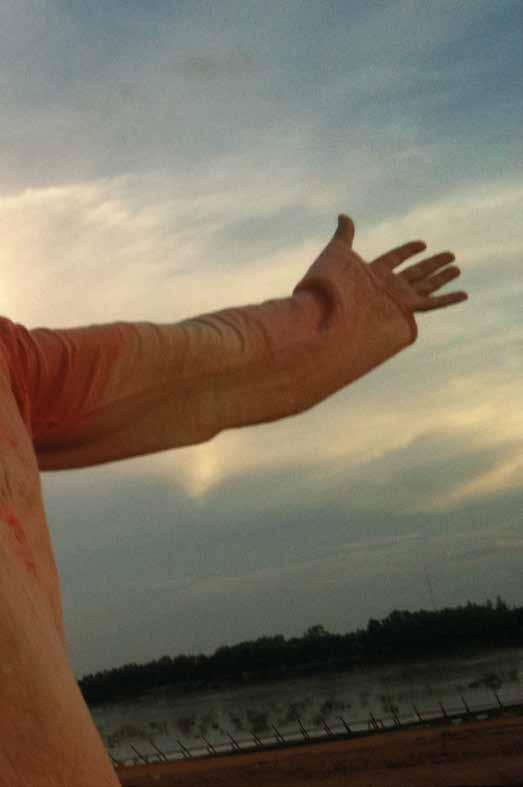
Full of thoughts that make me feel light, full of limpid visions that bestow an infinite number of existences upon me. A peace as contagious as one of the diseases that so worry me and that in this moment make me smile.
A PEACE THAT MOVES WITH THE SLOW PACES of a young girl with wood on her shoulders and arrives in the beds of those who love me and have loved me. Peace and visions. Without the peyote of the Mexican sorcerers, without the smoke shot up the nose by the blowguns of the Yanomani indios.
This is where the international-aid planes leave from. We are still in Kenya, a few miles from the border with Sudan. On one side, the hangars and planes of the United Nations, on the other, amidst dust and filth, the huts of the Turkana robbed of all their charm, whose dwellers feed on the left-overs of the various bases.
in the sad bars of their maverick air carriers, staring in the air and air pockets. Two flights a day, four beers at 6 PM, and then some black girl to take with them under a mosquito net full of holes.
The barbed-wire fences that surround the airport, cutting the world in half, catch plastic bags swept by the scalding wind.
THE POPE IS NO MORE. THE MAN FROM DARFUR SITTING IN FRONT OF US, INSTEAD, IS STILL. And even he cannot explain to us how, why. He saw his wife and children butchered by the janjaweed. He felt a knife cutting into his throat. Then, on the back of a donkey ambulance, he was taken to hospital. When he speaks, he closes the hole in his throat with one hand to prevent air from getting in. He is alive, but at his every word his eyes seem to be breathing their last.
A TUSKER BEER FOR US TOO, then Father Kizito’s transparent eyes and his stories about a nudist missionary among a tribe of cannibals cut the five-hour wait in half.
LIKE A SMALL FORT, THE PLANE IS FIRST SURROUNDED, THEN STORMED. Everybody is sweating, not just us. Outside it’s over 100 degrees, inside at least 115. It’s not a plane, it’s a matatu!
THEY
THAT DIED ELECTROCUTED WHILE ATTEMPTING TO ESCAPE.
the famous poet chieftain who died a few years back, and many Nuba from the diaspora who are going back to their land for the great Conference, the first after the signing of the peace treaty. There is nothing doing: after hours of exhausting discussions in the sauna-like compartment about seats and baggage, we are all told to get out. The plane is too full, it’s too late, and we are all too tired to take the pilot and hang him from one of the propellers of his damned plane.
THEN OUR PLANE ARRIVES. Yesterday it was carrying Queen Elizabeth’s dogs, today it is we who will be doing the barking inside. We are being tossed about, damn it, then the clouds break and, like in open-heart surgery, the throbbing organ appears: the Nuba Mountains. I set my feet on the ground and walk about like a guru on burning coals. The heat is sovereign, heedless of the wars and attempts at making peace. I look around as we climb towards Kerker.
GROUPS OF MEN UNDER
WAIT FOR LIFE TO PASS, a kid brandishing a kalashnikov appears and disappears as if in a conjuring trick, then the women’s animal eyes, the phantom baobabs, the rock sculptures, the stone huts and straw roofs.
for you to smile, to greet them, then immediately respond with a graceful and sweet smile of their own. The eldest get up and come towards you, the children run away laughing. Along the crests of the first mountains in the late evening, we come across small Nuba who have never seen anyone like me and their gaze looks much like my own. Because I too have never seen anyone like them.
of the earth light up and burn the Earth. The latest two to arrive on the planet suck life from two young and shy Tira mothers. Their eyes flee but, when they stop, they pierce me through and through. A good way to die.
IN THE SAME VILLAGE, A MOSQUE AND A CHURCH made out of mud, straw, and touching murals drawn with simple pieces of colored chalk abide peacefully a few yards apart from one another.
THE SUDANESE MILITIA KIDNAPPED, RAPED, SET ABLAZE.
And the kidnapped, raped, set ablaze Nuba struggled to defend their land and villages. With prehistoric weapons and their name as a flag: “Nuba”, the only word capable of uniting the ninety-nine legendary languages of these legendary mountains.
FROM HERE, TOMORROW AT DAWN, I shall see girl and boy children and adolescents running to the Koinonia Model School created by Kizito and Amani.
NIGHT, ONCE AGAIN.
KERKER
BUT UP UNTIL TWO YEARS AGO SMILES WERE AS PRECIOUS AND RARE AS SUGAR AND TEA.
FALLS IN AN INSTANT, I SEE IT RACING TOWARDS US FROM ATOP THE SACRED ROCK OF THE GREAT SERPENT.
HERE THE STARS DANCE, yelling questions, insults, enraptured poems. How the hell am I supposed to call upon sleep, in the middle of this havoc, of this screaming stadium, and say to it: «Sock it to me!»? I pick up a broom and ram its stick against this ceiling of lights, but on the floor above nobody hears me, the party goes on…
Nothing budges, but something speaks to you anyway. And I, from time to time, pretend I don’t understand. We sleep in their huts after having shared rice and goat and sky with them. My so-called mosquito net, Alessandro’s spray and, even more, our excited dreams keep the spiders, bats, and snakes in stitches.
IN THE MORNING, AT THE SCHOOL: we explain to the kids how to use the thirty disposable cameras we are about to give them.
I’M ALREADY QUIVERING WITH EXCITEMENT at the thought of the moment when I shall have their developed photos layed out in front of me.
WITH MY SUPER 8, I TACKLE THE BEST WRESTLER, everyone laughs and they laugh even more when I put on their gift to me, a traditional little gown. I dance waving my but, what luck to be here! The boys and girls, who up until a few years ago didn’t know other languages even existed, speak English much better than I do. They are smart, proud, cheerful.
I HAVE ALREADY BEEN HERE, along the paths of Kerker and the huts at Gidela, years ago, in a dream. A dream with eyes half-shut and pen in hand. I think back to the days when I wrote the campaign to help Amani in his solitary commitment to this people. To do so, I dived headlong into the pictures Francesco Zizola had taken, trying to become one of them, maybe succeeding at it.
I
OF THEIR SNAPSHOTS, DESCRIBED IN THEIR OWN WORDS.
MAYBE I AM ONE OF THEM, maybe I am that man who is coming towards me and, as is the custom among the Nuba, in order to greet me first puts his right hand on my heart and then smiles as he clasps my five fingers in his own.
WE LEAVE KERKER HEADED FOR KAUDA, it is there that the Conference will be held. The potholes, the sudden stops and starts have cured my back ache. More large trees and magical women underneath them, colored by phosphorescent veils, like ripe fruit just fallen to the ground. Here is Kauda with its mango forest. We are welcomed by the chiefs of the SPLA, the Sudan People Liberation Army.
HERE EVERYTHING IS PRECIOUS, EVEN A BOTTLE DISINHERITED OF ITS LIQUID AND TRANSPARENT WEALTH. HERE, THAT CONTAINER IS NOT RUBBISH, IT IS A PRESENT. HERE NOTHING IS PRECIOUS, BECAUSE YOU KNOW HOW TO DO WITHOUT EVERYTHING, BECAUSE YOU CAN DO WITHOUT EVERYTHING, BECAUSE YOU HAVE TO DO WITHOUT EVERYTHING.
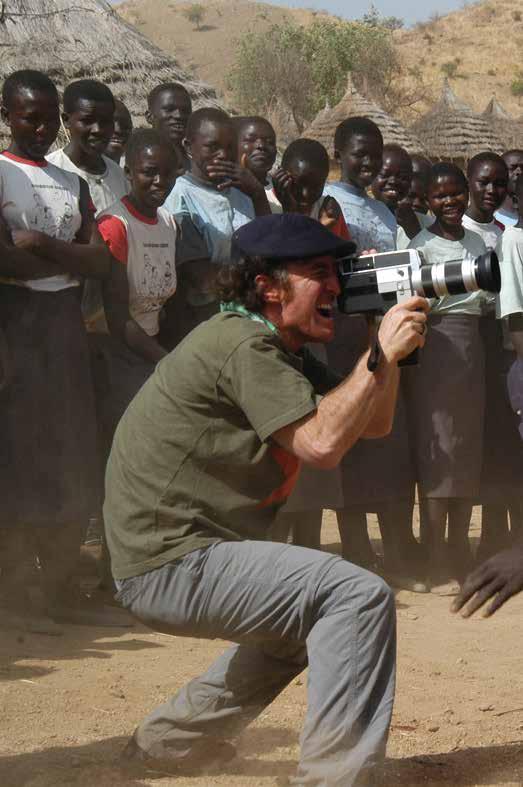
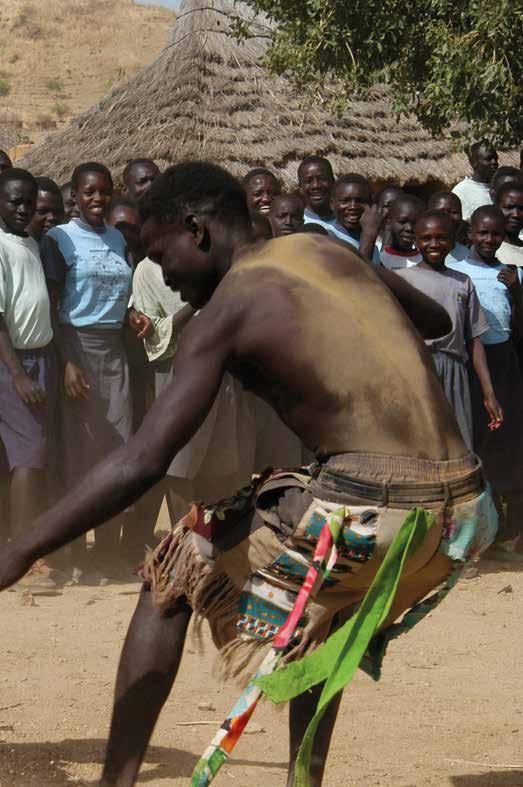
THEY HAVE NOT FORGOTTEN
HELPED THEIR PEOPLE IN DIFFICULT MOMENTS, so they greet Father Kizito and Gianmarco Elia with reverence, and shake my hand with their chest thrown out under their battledress.
THE ROAD TOWARD KUJUR SHABIA, where the other school awaits us, is a pain in the ass if you are seated on the trunk on the back of a jeep, it is a pain for the eyes if you have the guts to keep them open, because everything is absolutely beautiful.
WE CLIMB LIKE ANTS, the wind sweeps Africa into our faces, the Nuba huts, the women balancing water jugs on their heads, the red eyes of black men. Past bombardments by pictures and videos fail to rob my eyes of the excitement of the first look.
NOW LIGHT IS MASTERFUL. Everything is too much. Now it fills me so and later, I know, it will deplete me, spur me far away.
and, the next moment, I am walking around with Gianmarco. The figures of Nuba kids stand out upon the rocks, against a sky choking a sun moon.
COOKED IN EARTHEN KITCHENS, on a fire from another age. Here, too, the school is honey. They reach it on foot, often after walking for hours, sometimes on just one leg, like a girl whom Kizito tries immediately to help. Here, too, the kids are split between shyness, curiosity, and the urge to laugh.
HOT, HOT, HOT!
Motionless, often speechless, we wait. An unfamiliar wait. Nothing to chase after. No appointments. In my stillness, the wind blows past me.
I look and learn from the Sudanese masters. They speak with barely open mouths and eyes. They breathe the breath of the earth, five of them close to one another, like a mysterious circle of baobabs. Like trees born from a seed of rock. I look at their feet, dust and nails and repaired sandals.
rice and goat, the dish is blue and the sky white hot. The wait and written words slip away from me like lizards only to stop here, on these pages, where they bake in the sun. Now we laugh between ourselves and at ourselves. Now we walk, descend as surefooted as the goats we ate, as the goats we sometimes run into. My travel companions Alessandro, Angelo, and Stefano move swiftly along.
I RAISE MY EYES, THERE IS A CEILING AS ANCIENT AS LOVE AND HATE. AND, MOTIONLESS, I LET TIME GO PAST ME.
OUR GUIDE IS FAST, but we won’t be left behind. People always answer, with their voice, hands, legs, eyes.
WHEN JESUS LET OUT HIS FANATIC REBEL SCREAMS, here everything was the way it is now. Generals, poets, saints, and son-of-a-bitch plunderers, these rocks, these trees have been stronger and more patient than you. Today I am here and around me are the same gestures of billions of months ago. They have won. Because here a tree is a tree and a man is a man. Much very much, little very little. Almost everything and almost nothing.
NEVER A GET LOST, ALWAYS AN OPEN DOOR IN THESE DWELLINGS WITHOUT DOORS. WHY IS IT THIS WAY HERE, WHEREAS WHERE WE’RE FROM THERE ARE BARBED WIRE AND ARMOR-PLATED HEARTS? WE ARE FAR AWAY BY NOW, OUR OWN UNKNOWN RELATIVES. WHAT HAS MADE US SO EXTRAORDINARILY SAD AND ALONE AND USELESS?
WALKING AS USUAL makes me feel alright, elegant pink flowers grow on awkward fat bushes. Along the path that takes us down to Kauda, Nuba children appear up above. To my eyes, microscopic and immense.
IN THE YELLOW OF A FIELD, A MAN dressed in white kneels down and prays, his head touches the earth, but he seems to want to descend even further. Like a dowser senses water, he perhaps can sense God.
HERE IS KAUDA BY NIGHT, LIT by the dim neon offspring of the new peace. The Conference is over, ended are the words and speeches stuffed with the future. Tomorrow only dances and songs. Dust on the merchandise of the small market and on us. Much has changed, Gianmarco tells me, here in the most important center, in the “capital” of the Nuba territory, in the wake of the ceasefire. There is even a 60-square foot restaurant.
AFTER THE NIGHTS SPENT IN ISOLATED VILLAGES, here one has the feeling of having come back to reality, or to the fiction of a war-movie set. CAMOUFLAGE BATTLEDRESS AND JEEPS of the various abbreviations, UNO, NGO, and the many that during the genocide did fuck-all and now want to raise their flags over everything.
THE MUSIC IS ARAB, like the white turbans, the two cups on minuscule tables set on the ground, the handshakes that last an hour.
THE KIDS THAT HAVE GROWN UNDER THE EYES OF FATHER KIZITO ARE BURSTING WITH INTELLIGENCE AND BEAUTY.
I look at the future leaders of this territory and think of our delegates, flaccid lumps of expired mozzarella.
MOUNTED ON TOP OF EMPTY BARRELS, ON THE LANDING STRIP SURROUNDED BY NOTHING other than a baobab and the wreck of a plane, I use my Super 8 as if it were a gun. And when I frame those gazes in the viewfinder and zoom into those eyes, I ask myself how the hell one can pull a trigger.
THE RUSSIAN PILOT TAKES OUT AND PUTS BACK IN SEATS, while outside his co-pilot pumps fuel by hand. He hates Africa and Africans, two more weeks and he’s off, «I’ve had a nervous breakdown», he tells Alessandro. Not bad for a Welcome on board. The wait, the wait on the runway, with more than 105 degrees in the shade, in the shadow of our airplane’s wing. You climb a ladder to get on board as if you were going to change a light bulb. THE
HOW MANY HAVE SPOKEN OF THE ELEGANCE of these female women, how many of the dazzling ebony color of these male men? Many, too many. A thousand and one, me. Nuba, Nuba, Nuba!
Kizito again tells us about them, about their open way of seeing the world, their faith, their existence, so unlike that of many other ethnic groups.
WE
ABOVE, SEE
branches and tributaries. Here the great explorers of the past lost their ways and wits and filled the heavens with curses. Here Sirs with their chest covered in medals and decorations have seen their assurance, hopes, and luggage drown amid hippopotamuses, crocodiles, and poisonous snakes. To this day, only the Shilluk know how to move around and live here. Here, even the Nuba were at a loss. Of the thousand that set out at the start of the conflict, to cross the immense river in order to get weapons and aid from the south, only two hundred survived. Their journey was such a nightmare they gave up all idea of returning home.The aftermath is meeting a Senegalese fan of the “magical Roma” soccer team and then more waiting, more heat, more planes and, luckily, more words from Kizito.
WE HAVE FINISHED SHOOTING IN THE PRISON AT FROSINONE. I’ll tell about it starting from the end, from me and Bruno and Antonio.
HERE IN THE COURTYARD, THE SUN HAS ALREADY SET. Three walls on three sides and on the fourth the face of Frosinone’s penitentiary, forty barred windows on the blank gaze of the maximum security section. A face looks at us, waves its arms, makes us gifts of bottles of prison-house coffee to be caught in the air and answers my question «How much longer?» with five fingers outstretched twice and a desperate smile, but without the voice saying the endless amount of time yet to be spent and re-spent and spent again.
HERE IN THE COURTYARD, WHERE EACH DAY THE THIEVES KILL TIME AND THE MURDERERS STEAL AN HOUR’S WORTH OF AIR, WE ARE FACE TO FACE, CLOSE UP, ALIKE.
ALL THREE OF US BREATHE.
All three of us have been, are, and will become babies, children, adolescents, adults, and old men. I’ll be out in a short while, where the sun has yet to set.
I WISH I COULD TEACH THEM TO LEAVE THAT PRISONER’S BODY TO SOME STAND-IN and to fly away light as the pollen that is snowing down on our heads. They laugh, sometimes bitterly, sometimes conspiratorially, sometimes ironically.
I KNOW THEIR RULES, THEIR PRIDE, their friendship, their violence, and my anger. One of them. Me here, perfectly at ease.
AS I PASS THROUGH THE LAST GATE, I DRAW A SIGH OF RELIEF, I’VE TAKEN SOMETHING. But no one noticed. Yet again I’m not going to be only myself. Perhaps that is why I sometimes catch myself looking at my kids with the blessed eyes of a fisherman who has survived a storm or making love with the same violent, absolute, and amazed love of an ex-con on his first day of freedom.
I WHO AM COMPLETELY A STRANGER, SHY, impatient and arrogant towards a world in which I live but which is not my own.
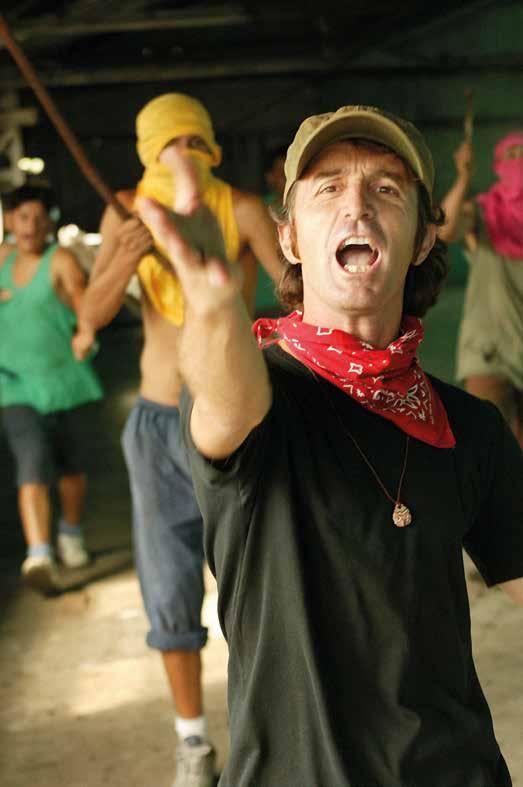
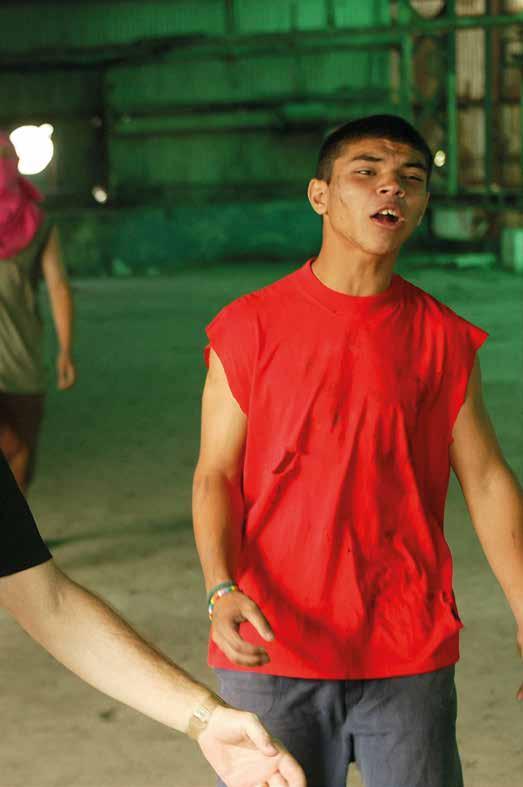
TWO KIDS SITTING ON THE GROUND. She caresses his face, he is serious and looks beyond her. Beyond the plains of Patagonia and the mountains of the Cordillera. Beyond the caresses and beyond that sheet he’s holding in his hand. Four or five lines, thirty or forty words. That keep him pinned there, that spur him further.
TOWARDS ALUMINÉ, TOWARDS THE CORDILLERA, increasingly dark clouds. Lonely gauchos and prehistoric silences. The wind of the Mapuche has told me something that I don’t know how to repeat.
THESE CLOUDS THAT MY EYES DEVOUR, these shadows, these lights that reach inside me, where will they finally wind up?
ON TOP OF THE PIEDRA PINTADA, ANCIENT MIRADOR OF THE MAPUCHE INDIOS, the air feels like air feels after a year spent in an isolation cell. AND MY EYES ARE FINALLY EYES.
Father Valerio, who sleeps for two years in a shack made out of scraps of laminated steel propped against a tree, challenging the cold, the wind, and the whole world. His love is so great that when he leaves the shack, the tree dies out of loneliness.
Father Valerio, who at the end of the shooting puts an ancient Mapuche pipe in my hands and says to me: «You have done your work not only with intelligence but also with a heart». Heart, this word that keeps coming back at me. I let it fly off, far away, and along unknown pathways it finds its way back, back to me.
All you need is a borracho, a love-sick drunkard at the nth binge of his life and it’s bye-bye to everything.
we are forced onto the red-dirt trails of uncharted Patagonia. Dances, columns of light and rain, colored stones, beer.
BANDERA BAJADA IS POVERTY, MUD, mouths that don’t know how to smile, rain, we move forward sliding down desperate paths.
LIGHT BUGS, LOU REED, HORSES THAT COME OUT OF THE DARK, sweat tattooed on the skin, tears inside the head. Feeling feeling feeling!
WE HAVE A FLAT TIRE, under the reggae sun there’s still dancing, in the darkness.
THE SMELL OF BURNT TIRES, FLASHES OF BLACK AND WHITE TVS, kissing of lovers without a peso in their pockets. Along the carretera that leads us away from Bandera Bajata. Light bugs like shooting stars, and vice versa. I am here now, with my travel companions at the center of a gigantic déjà vu. Catapulted on the way back to Earth. Clear minded, I feel what I should always be feeling, every moment is ready with suitcase and passport to be the last. There, it’s coming. It’s the amazement of life.
Enthusiastic and depressed. Too crazy and too wise. Inspired and banal. Simply happy and absolutely sad. On the same ticket, it carries you to the sky and underground. The days are dreamy and the nights sleepless. It’s your pride and your shame. Your strongest strength and your weakest weakness. It’s everything you are and that you don’t want to be.
Close by when you are far away, far away when you are nearby. Unique in the world and one of many among many. The eyes see like those of a shaman and cry like those of a blind man. I only know it will make you feel alive on a deathbed and dead in an evening full of life.
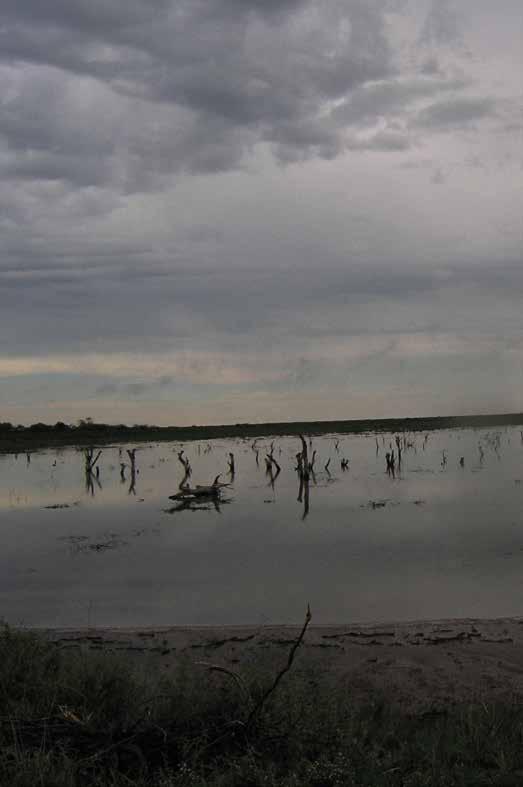
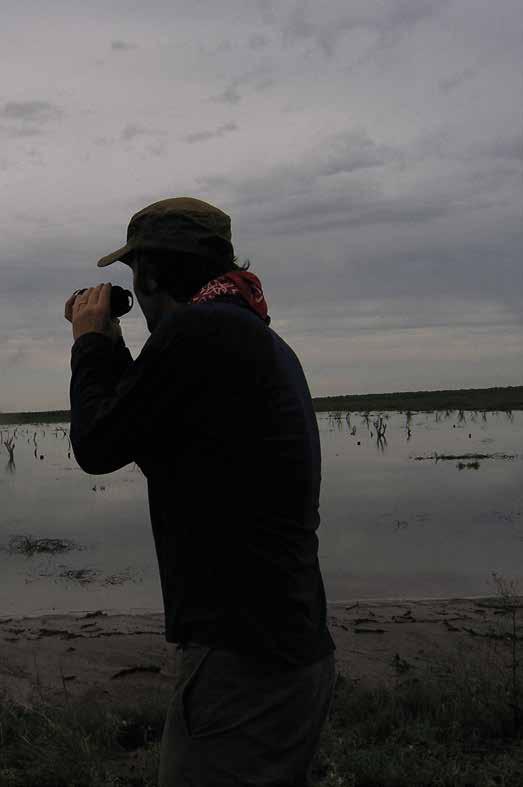
the Guarani indios went on and on in search of a land without evil, of fertile soil and living space without diseases: the Spaniards thought it was the Eldorado…
I
It means “Finally night”. The indios who were fleeing from death called it that when they found refuge here, exhausted. There, when my lips kiss you they smile sometimes and now you know why. They are saying “Finally night”. Or, if you prefer, Pulmarí.
on the roof of the shelter-home with the kids from the barrio Barracas, Father Charango, and Miguel. During the shooting they were great, when we showed them the spots of past years their eyes were larger than the screen. And when they left they couldn’t stop hugging and saying good-bye to us.
“Duele de placer tu cicatriz en mi” and again “Tu cuerpo lunar rifugio celestial”. Shit, I wish I had written them.
AFTER DAYS OF COMBAT, the very moment I said «We’re done», thunder lightning and pouring rain: on our smiles and over our cheers.
TIREDNESS IS BECOMING
AT MY HEELS. I try to escape, but my head spins, and my legs are so unwilling to act as legs… The Argentine chief electrician, thinking about the poor, out-of-the-way places where we did our filming, bids me farewell by saying: «Thanks for showing me Argentina.»
HORS D’OEUVRE.
Twelve flights in fourteen days. My guide will be Malinowski and not Lonely Planet. Three days’ travel, then, at the last boarding, brazenly prehistoric faces.
We’re greeted by all sorts of signs that seem to say: «Welcome to the most violent capital in the world!».
asks us whether we are tired and then, without waiting for a reply, leads us to our Salesian quarters. After a rest and before setting out, he shows us a wonderful documentary. It tells the story of the first Australian expedition to Papua. Until 1920, this region of the world was largely unexplored and, according to many, uninhabited territory. In reality, there were more than seven-hundred thousand aborigines living here.
in the course of the expedition are fantastic, but eye-witness accounts recorded around 1970 are even more so. An aborigine who had observed dumbfounded the arrival of those strange white beings, whom they thought were ancestors that had come back to visit them from the land of the dead, tells of his impressions at the time.
have distant past and future wound up meeting face to face as they have here. And it is almost unnecessary to recall how the world of these terrible head-eaters was in no time devoured by our omnivorous progress.
WE HAVE JUST LANDED AT ALOTAU, stopping place on the way to our final destination. On board of a nice van, we cross an immense palm grove planted by I don’t remember which multinational. The small town is in reality merely a village.
who will host us are in reality distinguished gentlemen with pink skin, too pink for the sun here, and short pants, not short enough for the heat here.
THEY ARE KIND. EXCEPT ONE. He almost doesn’t greet us, bent over his plate and his malaria. I will later discover that he is the most intelligent and sensitive one in the group. If it weren’t for Rita, the young and cheerful cook, there would be reason enough to shoot oneself from the embarrassment. She plays soccer and practices in the evening.
SO,
and I pay her a thousand compliments for the most inedible pasta I have ever eaten.
IT IS NIGHTTIME AND I WOULD LIKE TO GO FOR A STROLL, but I’ll be able to do so only with escorts. We are entrusted to Gregory and Philip. The latter is a small deaf-and-dumb man, it would seem that it is he who might need protection. But I am quite wrong.
IN ALOTAU, PHILIP IS A LEGEND, one gathers as much from the deference with which he is greeted on the street. He smiles and, on Gregory’s suggestion, shows me a bit of his repertory.
«KARATE MAN! KARATE MAN!», yell the children. We are left open-mouthed. He is all muscle, agility, and power. We are showered with stories about him of the type: «At Port Moresby, he was surrounded by three thieves armed with machetes and he rid them all of their machetes and bullishness.» In brief, I won’t forget him, whereas I would be glad to consign to oblivion the holes in the road we traveled on to reach the inland villages.

PILES, HUGE TREES, LIGHT RAINING UPON STREAMS AND LAUNDRESSES.
THE VILLAGE FOOL APPROACHES ME AND PROUDLY SHOWS ME THE OBJECT OF HIS PRIDE: A «WHITE OPOSSUM». It has yellow protruding eyes and claw-like nails. In a flash it is on my head, crawling on my thoughts and feelings. Now, finally, I’ll know what to answer when someone asks me «Stefano, what on earth is running through your mind?»
IN THE EVENING THE KIDS IN THE CHOIR SING, helping us to digest the dinners of Rita the center forward and the anger that has been pent up inside us since our visit to the “supermarket” at Alotau. Walking along the aisles, we understood why this land is known as “the world’s garbage bin”.
EXPIRED MEDICINE, inedible food, tainted products. Everything not good enough for the rest of the world is just fine for Papua New Guinea. I look at the map of our blue planet and think we are already as far as one can possibly go. And yet I sense that it is only the hors d’oeuvre.
FOR
Tomorrow the real journey begins. We fly over the Coral Sea. Atolls without a name or trace of human presence stick out of the unfathomed deep. My eyes shift from the painted blue of the water to the printed black of Malinowski’s words. The landing gear is lowered. There is a strong headwind and the twenty-passenger plane appears almost to hover, the bicycle of the nun pedaling alongside us on the dusty airstrip is faster.
BERMUDA
and a colorful Roman accent. An accountant and ex-employee of I don’t remember which government ministry, at the age of 45 he heard God’s calling: «Hey, Fred, how’s about doin’ somethin’ for the poor, huh?» He left everything and became a missionary.
HE HAS A HEART OF GOLD, but seems to be living here as if he were still in Viale Trastevere, in his old neighborhood, with the same fixation with tidiness and the same everyday habits.
after the stunned emotion that accompanies the trailer playing in front of our eyes. I was wondering whether the reality Malinowski described at the start of the 20th Century had not become only an anthropological curiosity by now. Well, no it hasn’t.
ON THESE ISLANDS THERE ARE NO HILLS OR FORESTS but forests of faces and smiles of surprise and excitement. The dim dims, the white men, are as rare as medicine here. There is no trace of the harsh, stone-age faces of the Papuans seen up to now. Savage hair bursts like fireworks from countenances shining with an ancient and rebel sensuality, in no way describable by the tame term “sexy”. Straw huts and, at the middle, the decorated storehouse of yam, the staple food of their diet, sacred food and fulcrum of the great feast that every year leads men to dis-acknowledge their women and women their men.
ARRIVAL, THE FIRST MOMENTS, the blessed minutes of slow-passing seconds and fast heartbeat. I don’t know how, but there is enough time to notice also the cyclopean leaves and fruits with amazing shapes, the fantastic offspring of orchards watered by magical rites.
THE LIGHT, THE NAMES OF VILLAGES, AND MY MOOD MAY CHANGE, but the greetings will always be like this: the children racing like mad, the men with an arm raised to the sky, the girls with deep and motionless eyes.
BLACK KIRIWINA WITH ITS WINGS SHUT. Black if you visit the hospital, without a doctor for the last ten years, broken windows and fragile old people stretched out on the ground, a three-year old child who has been horribly burnt, those heavy with tuberculosis next to women pregnant with child.
KIRIWINA, THAT IS THE NAME OF OUR ISLAND. KIRIWINA LIKE THE BUTTERFLY DANCING ABOUT ME.
Blue as the deep ocean where child-fishermen of octopus and colored fish dive with elastic harpoons and tricks inherited from some grandfather thousands of years ago. «Sharks? Go ahead and dive in, they’re afraid,» an old man holding a carved ebony stick tells me. And I, I dive in!
THE MISSION WHERE WE STOP LOOKS LIKE THE ONE IN THE MISSION . BIG GREEN OPEN SPACE, TWO HUGE RAIN TREES which to this very day sometimes proffer their shade to me in my dreams, the church with a trail of white flowers on the ground that take you by the hand with their fragrance and lead you to the altar, even if you have no desire to get married to God. Then the houses of wood and more wood where we will sleep.
Through the jalousie windows and worn out mosquito screens that have failed to prevent who knows how many a missionary’s malaria, I see palm trees and children playing. I catch a glimpse of mothers knocking on the nuns’ doors as if they were those of Heaven.
of the missionary founder of their order, on the little dark-wooden rooms, and on the flowers in a glass of water. The warm bread, the chair to sit on, a few moments in which smiles are exchanged, and then silence and a feeling I almost never have.
THAT MODEST SECRET, that incommunicable sensation of having already been there, of having already lived that life. A life of strange tongues that are difficult to tame, of villages crossed at evening amid the first fires, of unbearable loneliness, of laughs and games invented for the children.
A LIFE OF INSURMOUNTABLE PROBLEMS that get surmounted, of microscopic and gigantic projects, of days spent arguing with weeks of rain, of walls that need painting and light that isn’t there, of mold-stained pasta, of rainwater to be boiled and rainwater you’ve stopped boiling.
and unlike all those who are around you, and then, a short while later, to see yourself welcomed by them as the best of friends, as no one in your own land would ever welcome you.
and imagine the goals being scored while you say mass and celebrate them with the whole village and a pig you’re offering, when everyone, the pig included, has but a very vague idea of what Italy and the world championship might possibly be.
YOURSELF, looked after by a wordless and childless woman who cooks for you, and you who make a great deal of noise while eating and don’t notice it, just as you fail to notice that your rare guests have noticed it.
BEING A “FATHER” but practicing under the rain with the Nim, namely the “Mosquitoes”, the local soccer team, proud of the imitation tee-shirts of the Rome team you managed to get sent to you all the way here.
A LIFE OF ENORMOUS PURPLE CRABS GOTTEN AS PRESENTS and now how am I to cook them, a life of painful doubts about your faith and curious questions about the faith of others, a life of prayers, yes, and of a Jesus you by now treat as a buddy, of letters of reproach from the bishop: «Are you a man of the Church or a rabble rouser?».
A LIFE OF MASSES with beside you two altar boys who shut their eyes to concentrate just like you used to do when you were uncertain whether to become a soccer player for Roma or a missionary of Jesus.
AND AGAIN I ASK MYSELF: «IS THIS A PAST LIFE THAT I FEEL? OR A LIFE GRAZED IN PASSING?».
I RECOGNIZE THE CREAKING
of the mission’s wooden floor whence mice and red-headed snakes pop out. I walk and my steps seem already to know the path and the village fires, and my hands clasp hands never seen before and yet already familiar. With what ease I sleep on sheets worn threadbare from the perspiration of courageous fathers who have lived in Africas, Americas, and small forsaken islands, forgotten sons of an Italy desaparecida. I smile at the thought of all the pain my intestines would have suffered in their lost battles with these bacteria in full combat gear.
WHAT IS CERTAIN IS THAT WHEN I AM SO FAR AWAY I OFTEN SEE, FEEL, MY OTHER POSSIBLE AND IMPOSSIBLE EXISTENCES VERY CLOSE BY. NOT EVERYONE HAS SUCH A PRIVILEGE. MANY HAVE TO BE CONTENT WITH A FLEETING DÉJÀ VU, WITH AN UNWITTING FLASHBACK. I, INSTEAD, FIND MYSELF ENTIRELY PLUNGED INTO ANOTHER OF MY SELVES.
who will have been proud and yet exhausted by my missionary choice. I realize with dismay that here too all my qualities would have turned into shortcomings, just as in the life I lead now. But it is not a feeling of regret. My children, my loves, will not allow me to see it that way even for the briefest moment. Moreover, it is a life so much on the borderline of life that to exalt or dream or idealize or regret it, is a stupid and conceited exercise I shall not indulge in.
SISTER VALENTINA HAS SO MUCH TO OFFER and not only in the kitchen (what bread and what pasta!). I like the way she envisions her presence here. When I tell her that I don’t see what example, what model we might ever propose to these people, she nods in agreement. We are coming back from the island’s largest village, the same one the famous anthropologist Malinowski had set up base in.
ME HAS ALREADY BEEN
between the huts toward the lagoon, I expected to run into him from one moment to the next, so much is everything still the same now as it was then. Eighty, ninety years, what can they possibly mean to a millenarian civilization that is still walking in slow motion and doesn’t race ahead blindly and presumptuously as ours does?
It filters across straw rooftops, in between tree branches, through the leaves of the plants in the orchards that have grown under the influence of magic words and cyclopean moons, and falls skimming upon the natural pool where old witches and young angels wash themselves and smile showing their teeth and in fear or scream and escape or remain paralyzed before me the photographer.
They seem like cave paintings that tell of fishing scenes when man was homo. They plunge into the water their thin harpoons which are capable, as if by some miracle in an apocryphal Gospel, of procuring fish for a nearby fire that is already burning wood and smoke.
THE FOLLOWING DAY, after having become acquainted with the Coral Sea, we walk along the beach and laugh with the nuns about their misadventures with spiders as hairy as bears and mile-long snakes.
TERESINA, IS THE ELDEST, she is almost seventy years old. The youngest of ten children, she was born in the country of The Tree of Wooden Clogs. «I wash the dishes, I’m used to it, my mother always used to make me do it. She was strict, my mother, I got few caresses from her...». Perhaps that is why, as we cross the villages, she cannot laugh at the sight of the dirty and smiling children. She thinks of the dirt. She thinks of the many little Teresinas who grow up without caresses.
FATHER CESARE, A NATIVE OF MONREALE, builds and renovates the missions amid jokes, silences, whistled Sicilian songs, and pasta with four-cheese sauce doused with a drop of Altar Wine.
ONE
With a flat ass and one’s shoulders dislodged by the potholes. Look, look at how the third, fourth, and last on the list of the worlds welcomes you! Smiles and screams, a real welcome!
try greeting strangers passing by on the road as I am now doing. AND AGAIN, WHAT CAN WE DO? HEALTH AID, YES.
THE HOSPITAL IS A SHAME. No doctors, no medicines, and many many more no’s in reply to those who ask for help, help, help.
PAPUA NEW GUINEA IS STILL A BRITISH PROTECTORATE, here the people still celebrate the birthday of the Queen of England, a sovereign who in one day spends as much money on her dogs as is available to run the hospital here for a year.
I’ve run into them in many places, more or less scattered around the globe. In their often sad and harmful race to rush to where it is important and strategic to be.
I WANT TO READ MORE ABOUT THE MAGIC RITES OF THE ORCHARDS, the matrilineal structure of society, the meaning of a gift, the feast of the yam. I want to try to lend a hand to Sister Valentina and Sister Teresina in carrying forward their projects. I want to come back to shoot a documentary.
I VISIT THE SCHOOLS, SMALL AND BEAUTIFUL. But, aside from reading and writing, I really don’t know what we might teach the children here. What do we know more than they do? Have we perhaps discovered the secret of happiness? In the great meadow at the center of the village, whose name is too complicated to write down and remember, first one, then ten and, in the end, fifty children play with me freely and happily, as one very rarely sees happen at home these days. I look at them: the secret of happiness does not seem like a secret to them.
AMONGST
the red green and blue birds do the same, roosters greet the dawn and the sunset. I look at new stars and smell new wind and speak to them and speak to myself.
TO TURN UP. So, instead of going back to hybrid Alotau, we stay here. So I lie a bit longer on the bed moistened by the night’s rain. Then I get up and start to write these words, these here pages. Begun as travel notes to be expanded upon later on and then gone off on a journey all of their own. Rereading them is impossible. Written without pause, as I hardly ever do when I am working. Weariness, discomfort, exhaustion, the desire to get away from here have yet to show face. I put on my shoes and go out.
by candlelight, in a wooden house on the islands of love, surrounded by enormous trees and numberless stars, with the courageous nuns and my intrepid love. My missionary beard grows, outside there are downpours of wind and bursts of rain. Tomorrow we leave. Or so it seems. We cross the night: «The starry heavens above me and the moral law within me.»
and a slice of moon leaning on the sky like a slice of watermelon.
And every night a Jesus is born in a hut. Here you can read the Gospel, lift your eyes, and see the Gospel. Another farewell dinner, this time at Wapipi, with Father Cesare, the Sicilian, and three nuns from three different countries. To figure out where they are from, all you have to do is say hello to them. The cheeks that graze yours and avoid contact are those of Sister Rodna, from Bangladesh; the strong and cheerful handshake of someone who wants to let you know she has made the right choice and has no regrets is an Italian’s, Antonella’s; the tight hug, the physical contact, is Brazilian Sister Jane’s.
ONE MORE NIGHT with a wooden floor that doesn’t sleep and tells stories, the light of stars and of dawn that filters in accompanied by the wind accompanied by the song of night birds, the soundtrack of my Papuan dreams and nightmares. Fritters, bananas, and tea for the last breakfast, under the portrait of a missionary martyr.
SO LONG, LAND OF CANNIBALS, AND MYSTERIOUS GROTTOS, AND MACHETES that on the last night got raised and crossed in a fight over the body of a dead woman. The wounded man is taken away on our plane amid the women’s sobs. The first ones I’ve heard since I got here. Then, the Trobriand from above. They seem like paradise, perhaps they are. Then, white clouds.
THEN SISTER VALENTINA’S FAREWELL, A MIXTURE OF FAITH AND MELANCHOLY, AND THE WORDS OF SISTER TERESINA: «I WAS A FLOWER, NOW I AM A LEAF. BUT I AM HAPPY TO BE HERE, TO BE A NUN. MY BOYFRIEND LOVES ME.» SHE GAZES AT THE SKY FOR AN INSTANT AND THEN AT ME FOR AN INSTANT.
I REMEMBER THE DUST, I remember the shacks with their laminated steel roofs and walls.
I REMEMBER ONE MORNING, or rather one dawn when the sky was the same indios clay-like color as my pants, which I had bought, I recall, in that market at Antigua Guatemala.
I REMEMBER A BOY with a mask on his face that made his way down a street that wasn’t a street. I remember it was all stones and holes and timid eyes peeping through holes.
I REMEMBER AN OPEN DOOR, the four eyes of two sisters, angels who are defending a treasure I remember having thought, when in that small courtyard without water and light I saw the treasure.
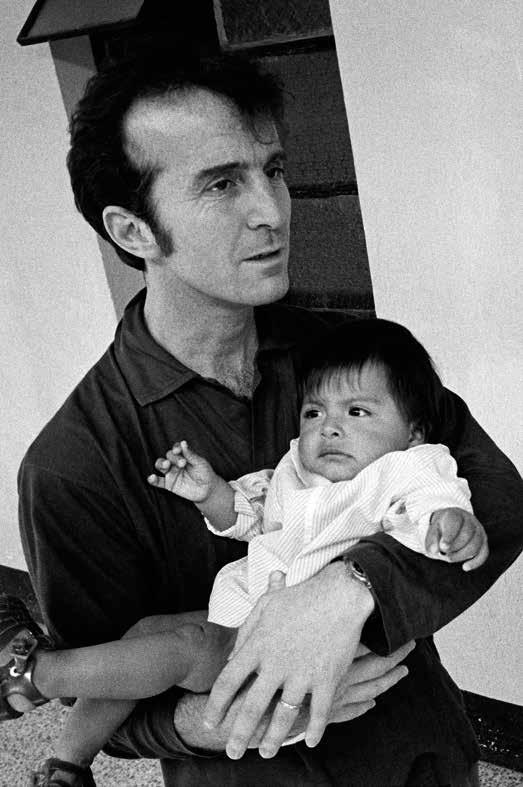
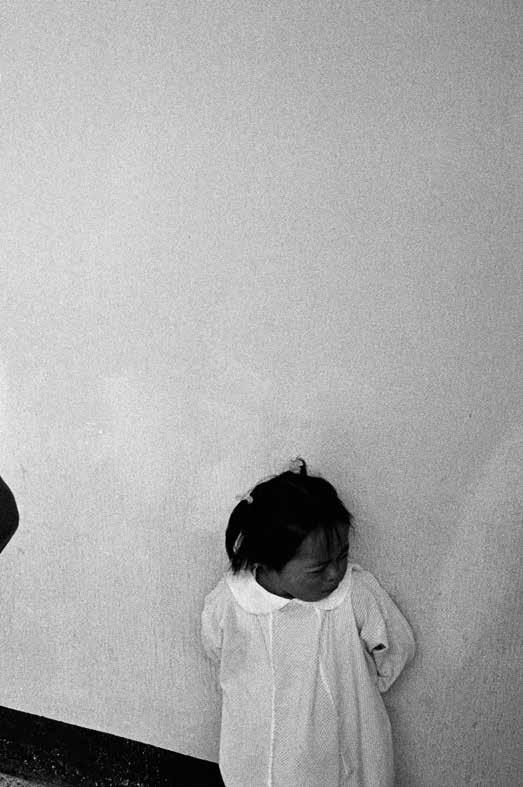
telling a story, their story, all the way from Spain, alone, to there, to pick up off the ground the little ones that the wind of indios poverty had snatched away from life.
I REMEMBER THE SORES OF INFECTIONS, the eyes of hunger, the mouths of fear, I remember that the children were only a few days old when they got there but seemed to have already been through eighty winters.
I remember that they were all brothers and sisters as I had never seen brothers and sisters before, that they were mothers as I had never seen mothers, that they were pure utopia in flesh and blood and happiness.
I REMEMBER THAT THEY DIDN’T HAVE ANYTHING, every day some bread had to be multiplied and divided, some carrots, and kisses and caresses, for the twenty hungry mouths in that nest hidden in a wall, in a hidden courtyard in a hidden village, in a hidden corner of Guatemala.
I REMEMBER A MIRACULOUS AND IMPOSSIBLE LOVE THAT CHANGED THEM BACK INTO BLACK HAIR
I REMEMBER STANDING THERE, BLOCKED, unable to leave, thinking I’ll come back, I’ll come back, and I came back, and I came back.
I REMEMBER WATCHING CICHI AND MISELA GROW, and grow inside the frame of my picture camera along with the nest, always larger and more resistant and beautiful. I remember as well that this story became both the story for a spot about the Catholic Church and the words that you are now reading. I remember that when I wrote them it was sunset and the sky had the same indios color as my shirt which I had bought, I recall, in that market of Antigua Guatemala.
I saw the spirit of a truck driver rise and meet in the sky the spirit of a dog that had died at the previous hairpin bend. On the ground, over the wet asphalt, a blood-red shroud hides to the volcanoes and the eyes of the campesinos bleared by Cerveza Gallo, the body of a dead man, dead as a dog, as the dog with which he now rises towards the Agua and Fuego volcanoes, and then further and further towards what’s above. In slow motion, I saw raindrops fall and them rising.
I OPEN THE CURTAINS. Look out the window. There is a man walking on the waters. It is the first miracle of my new African trip. «YOU WILL BE MY FRIEND FOREVER», a young Nuba teacher says to me as he watches our faces appear out of the blank white of a polaroid snapshot.
ON THE NUBA MOUNTAINS, among the yellow fields of Kerker. I am here but some part of me has been left behind. Perhaps it got lost in Gidel’s tall grass, white with the moon, after the fights and dances.
WHO
WHY IT IS NOT THE DRUMS BUT THE WALTZ-FULL HANDS OF MARGHERITA THAT LEAD ME THERE AGAIN.
LEFT FOR FARAWAY PLACES. The goings were long, the coming backs interminable.
TODAY, WHEN I COME BACK FROM THE DEEP VOYAGE OF A TRIP, the planes that drag me back, no matter how slow and so unlike planes they may be, are always too fast for me. MY
I HAD NEITHER THE STRENGTH NOR THE TIME TO TELL OF EVENTS AS THEY WERE HAPPENING. Many sighs, many voices, some gazes have perhaps gotten lost inside me. Who knows whether I shall be able to tell about them now, with a cold mind and body (winter has come to Rome), or whether they will re-appear suddenly, all of a sudden.
THE FIRST FEELING AS SOON AS I TOUCH GROUND and get out of the airport always comes to me through the nostrils.
THE SMELL OF SAN PAULO reminds me of Ouagadogou, Ouagadogou reminded me of Guatemala City.
and now I am on what yesterday was only a dot on the globe in Chicco’s room.
for Manaus. At the airport I buy the first gifts to bring home. During the flight I go over the shooting list, push my gaze outside the window and the forest appears to my eyes.
Rio Negro, Rio Madeira, Rio Amazonas. If one could untangle and unfold them, they could embrace the Earth.
there is Manaus, once richer and more populated than London and Paris and then, after the crisis of natural rubber, abandoned and disinherited. A fate shared by other ephemeral cities in South America like, for example, Potosí in Bolivia.
We have to take a small 14-seater plane to reach Borba, our first real destination. That is where the hospital boat is leaving from. We bargain over weight, between the Italian and the Brazilian crews and the equipment, it seems as if it is really too much for that motorized mosquito. In the end, we decide to rent two.
The captain tells us that at the back of the cabin there is an icebox with soft-drinks.
It’s only a starter, the main dish has yet to come... At this point I can already imagine the comments my next observation will get: «You are in the Amazon and thinking about soccer!» How can I not think about it, how can I fail to notice a small playing field with its two goals slipping away beneath us?
IT, without even a bit of room for benches. I can just see Mister Capello on top of a mango tree waving his arms to give his instructions. The field is red like mulatto earth, all around it is Amazon green.
IMPOSSIBLE NOT TO REMEMBER
the opposite color scheme that struck me upon my arrival in Ouagadogou. There everything was red sand lifted by the harmattan wind and, from above, the only green space that was visible was the magical green rectangle of the soccer field. Who knows what my little ones are doing this very moment, my little ones who really aren’t little any longer.
They lived along the rivers, almost all were peaceful, then they were forced to hide always closer to the heart of the forest, which from up here shows its scars. Large deforested areas, earth roads that cut like bistouries, in surgical fashion, the Amazonian belly. Many are not visible from up here. The rivers polluted by gold prospectors, the new diseases brought by yesterday’s and today’s adventurers and armies. But she still seems strong and proud. Suddenly we start to dance.
I WRITE PLACID IN ORDER TO
TO IT, or perhaps because from up here, while the wind makes us dance the samba, everything seems calm down there on the ground. The columns of water we cross and see touching the river like spotlights on a stage are very beautiful. We come out of the water to douse in the setting sun. We are landing on the small airstrip at Borba.
I
OFF OUR
IF I AM
The children sing a Brazilian song and we are moved. Then, we burst out laughing at the sound of the words O sole mio. They invade the runway and run toward us. We immediately go see a burnt area where we are supposed to shoot a few scenes. It’s a frightfully okay location. Now we are in the village. It is a poor settlement crossed by two paved streets, with many small houses that are simple, not to say wretched. But the atmosphere is rich, it is full of children, young couples walking about. In front of our micro-hotel, they are playing soccer. On the ground floor, there is a general store and a telephone.
I LOOK OUTSIDE, TWO-HUNDRED CHILDREN ARE WAITING FOR US. ACCOMPANIED BY THE BISHOP, THEY WAVE THEIR HANDS.
Matt tells me the Roma team is winning. It is so absurd, phoning from here and hearing them answer over there. I’ll never get used to it.
ROOMS
it is sweltering and the air conditioning is noisier than the airplane I took this morning. I wash and dry myself with an eight-inch long towel. I install my CD player with its small speakers and off you go with Santana.
many people look at us, we are the new thing of the month, perhaps of the year. A mother cooks some fish on a rusty grill, seated on the edge of the street in front of the shack are five little ones with ravenous appetites and thick hairdos that Margherita would relish. Many ride bikes, two on the same one like I like to do.
is managed by a fatso who, as we later learned, sells us tap water as if it were mineral water, putting us all at risk of a super Montezuma’s revenge. Waiting for us at our table, gigantic fish, rice, beans, and the bishop with his inseparable caipirinha. Then, to bed under the mosquito net, tomorrow wake up is at five o’clock. A spoonful of guaraná and off we go.
THE
IS BEAUTIFUL, it’s hot but when the boat is moving it is pleasant. We have to shoot the first scenes. After five or six months away from the set, it is never easy to break the ice. The viewfinder helps me.
AFTER
I feel as if I have been doing nothing else all my life: directing films. And yet I still want to laugh when someone on the crew calls me that. That’s perhaps why they all call me «Captain, my Captain».
I care about them and they never hold back when the going gets rough. And often enough, with me, the going gets rough... Like today.
me, Leo, Stefano, Adriano, and Emanuele, an Italian who lives in Rio and is my assistant. We have to film the hospital boat as it passes by. Our “pilot” gets the maneuver wrong and the prow of the Padre Goes (that’s how the hospital boat is called, after one of the first missionaries to come out this far) plunges straight into us.
and we all almost wind up eaten by piranhas and crocodiles. We were up shit creek without a paddle and almost lost the camera. But there isn’t time to sulk, we still have to get in a few more shots. At lunch, the Padre Goes’s kitchen satisfies our hunger with rice, fish, and the usual beans.
we risked sinking in before and, unfortunately, also with the same captain.
EVENING HAS COME, WE HAVE DONE OUR FILMING AT DUSK, AND IN AN INSTANT IT IS ALREADY DARK.
HE DOESN’T HAVE ANY LIGHTS, GOES TOO FAST, and twice we run into logs floating on the river and are almost capsized. We urge him to go slower and an electrician from the Brazilian crew manages to set up a makeshift, but effective, light. So we make it back to Borba.
BACK AT THE HOTEL, I OPEN THE DOOR to my room and am overcome by an atrocious heatwave. The air conditioning is off, the window shut, there is a strange smell of insecticide. Enough to kill you on the spot.
Tomorrow, wake up is at four thirty. Outside in the open air it’s more pleasant. To get to our dinner, we have to pass under an enormous, sixty-foot tall Saint Anthony. The Saint is looking towards the river, there is a light fog that perhaps reminds him of Padua. The guys and the bishop run on caipirinhas, I have two small beers, they seem safer than the water fatso serves us.
“HOTEL”, please note the quotation marks. I set up the mosquito net, kill a few spiders, take a sleeping pill and it’s good-bye everybody.
AT 4:25 THEY KNOCK AT MY DOOR, a spoonful of guaraná and I’m already on the river. Today we are going to a village on the banks of the Madeira. It’s called Trocana. Dawn on the river is very beautiful and at this early hour you can still breathe. From the riverbank, one reaches the village via a steep stairway. The houses are wooden huts, a handwritten note greets us. There are few people, young fishermen repair nets, a sudden burst of thunder makes us jump out of fear. Behind the huts there is the forest. With its rubber trees and thousand mysteries. A little monkey tied to a rope rests in the shade.
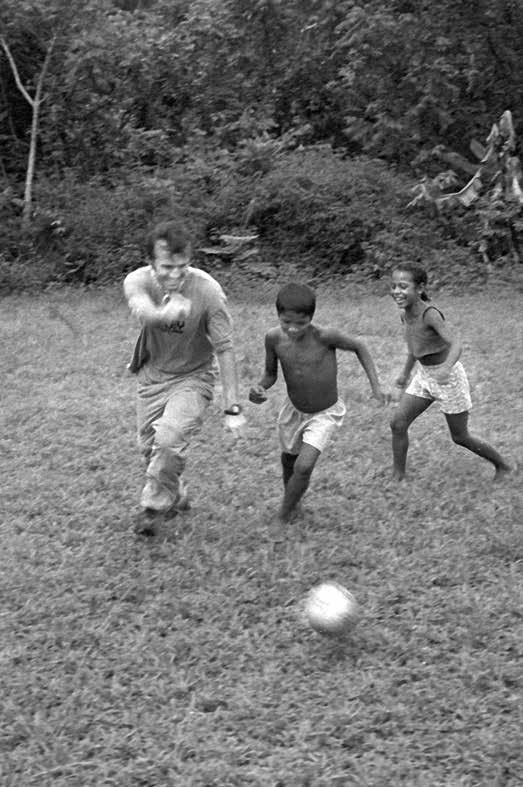

start to arrive from the neighboring small villages. They know the hospital boat and bishop are here. In two hours’ time, two-hundred people will have come. We start to work, drenched in sweat, I drink up to five or six liters of water a day and piss at most once. The children of the village proudly take me to see their soccer field surrounded by the forest. We kick the ball around for a while. I score the first and last goal of my Amazonian tour.
on a larger boat. Around us, thunderbolts light up the sky and the forest. They seem to be coming closer and closer. But the rain doesn’t find us.
We have to film the scenes in the deforested zone. The skeletons of trees greet us. It will be another anxious day. Mosquitoes and heat have started work very early today.
FATHER ANGELO ARRIVES, a missionary who is to be the protagonist of the second spot. He is a beautiful person. Will become my great friend. Seventy-three with the strength and spirit of a thirty-seven year old. For lunch, I eat bread and some canned tuna I brought over from Italy. I’ll digest them only twenty-four hours later. The scenes we shoot seem beautiful. Up to now, everything seems okay. Working hours and conditions are really tough, but everybody is rowing in the same direction.
URUBUS PERCH OPEN-WINGED ON TOP OF THE BURNT TREES. Dead tired, we make our way back to our rooms.
We say good-bye to everyone and take the mosquito back to Manaus. From above, we recognize the areas we visited in the course of our stay.
I call home, everyone is fine, but the Roma team had a goal scored against it at the ninetieth minute, two to two with Inter. From Brasilia another flight, to Cuiabá this time, where we arrive when it is already evening. Distances are immense. It’s as if we had been in Helsinki this morning and now had arrived in Rome. Instead, we are in the center of the Mato Grosso. The climate is worse than that at Manaus. I still don’t feel well. Once at the hotel, I go to my room.
Three hours of travel on a paved road and four on a hard and hard to digest unpaved one. What was once the Mato Grosso (Thick Woods) is today an endless plain without a single tree.
often transgenic, farms named after their owners, often Italian. Father Angelo tells me that to get here thirty years ago, one passed under a tunnel of trees. It is hard to believe him.
I had envisaged shooting some scenes today, to get on with the job: if I had known how hard it would be to get here... The scenes, in any case, are simple. We are in Father Angelo’s center, this is where he holds his reforestation course. A shower, in what is to be unanimously proclaimed the worst hotel of the journey.
IN THE ENTRANCE, A THIN AND UGLY
WEEPS AT A SOAP OPERA. She is holding a large handkerchief. Long columns of giant ants cross the walls of my room. Seen from above, they look like caravans of camels plowing through the desert. There is a mosquito net and air conditioning as well. It sounds like a helicopter, but it’s there. From time to time the mosquitoes dive down, however, and there isn’t a repellent that can repel them. We dine in a currascheria run by third-generation German immigrants.
IT IS QUITE SURPRISING TO SEE THE BLONDE AND WHITE
of the owner serving at the tables, they seem like ghosts.
Something squirts onto Fabrizio’s shirt, and he gets angry for the first time since we set out. We laugh, we laugh. We are in the Mato Grosso.
Paranatinga popped up like a mushroom twenty years ago, out of the ashes of the burnt mato. She grew alongside the fazendas and many different groups of immigrants. Poles, Italians, Germans. Split into very cloistered communities, they colonized this forsaken corner of the world. Tumbledown hotels provide lodging to the lovers of the day laborers, who on Sunday squander a week’s earnings. And sometimes a bit more.
In the public square of this absurd town, young and less young offspring of European, African, Portuguese spermatozoa run into one another, talk, dance to the soundtrack provided by two large and powerful speakers mounted on a truck.
AT FOUR FORTY-FIVE OF 18 NOVEMBER BEGINS
THE SECOND WEEK OF OUR TRIP.
We go to the indio village. Led by Father Angelo, after two hours on the road we enter the reservation of the Bakairi indios. Here nature is more beautiful, there are trees, animals grazing, many colored birds. Tucans are the ones I like best. With their orange bills. Our chauffeur whose name I do not recall points to a delicate animal that is running alongside us whose name I do not recall. It is the symbol of Mato Grosso. The day at the village is as precious as gold.
are the men who paint their face and body for the dance, the young girls who bathe in the river, the children with bows and arrows running wild, the women who show us rings made out of coconut and earrings fashioned from colored feathers, the planted and grown trees, the premonitory dreams of the shaman, and then the way back, in an enlightened light.
I SAW THEM COMING FROM THE WINDOW OF OUR SUBWAY CAR. They were black, they were enlightened, they possessed a power that I can neither express nor explain. Something made them different, not only from all the other musicians, panhandlers, beggars on the subway. But from the rest of the human species.
THEY CAME INTO OUR SUBWAY CAR and I saw a wave swell, pass over me and reach my kids. Flesh of my flesh, they felt what I felt.
THERE WAS NO NEED FOR WORDS, our smiles did the talking for us. While they sang their hymn to Jesus, everything was suspended and I thought the next stop wasn’t going to be Union Square but Paradise instead.
THEY WERE AS SWEET AND SERENE AS BUDDHA, light and innocent as the swallows Francis of Assisi confided with.
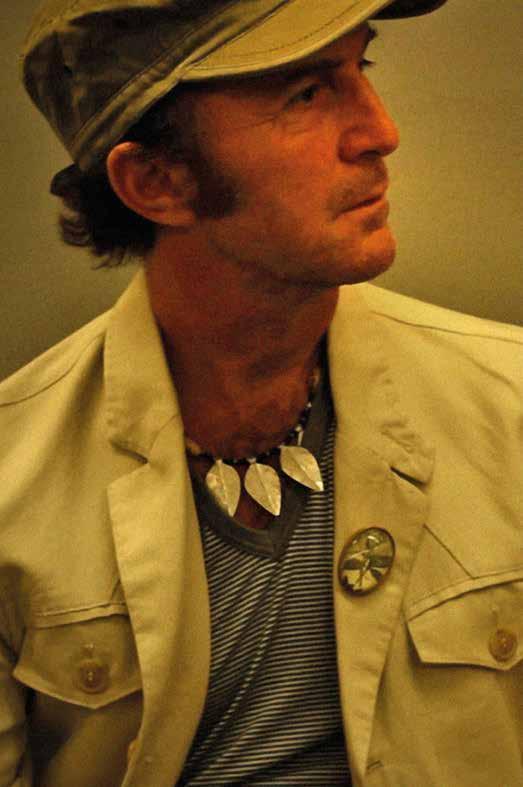
Happy and sleepless in front of an elephant. I envisaged the scene a few days ago and now we are ready to shoot it.
I WRITE TO MY WOMAN:
“Life is a magical feat”. A magical feat that will enable me, as I sit on the banks of a river in the north of Cambodia, to understand what Son Chai is saying to me. He speaks with his eyes and my eyes listen and answer. He is ten years old and cannot walk but his face keeps running back and forth inside me.
or, if you prefer, the extraordinary things that you see happen and cannot explain but which, after you have spent a lifetime in the forest as Father Angelo has, you learn to respect.
THE SHAMANS’
the witch doctors’ potions, the miracles of the Guatemalan patron saint of the prostitutes of Salvador who once intervened also on my behalf.
WE WERE AT CHICICASTENANGO,
I had just gone up the eighteen steps - one for each month of the ancient Maya calendar - of the sacred and blasphemous church of Saint Tomas, amid rose petals and votive offerings, offspring of that mad cocktail of Christianity and ancestral beliefs, when I realized that I had lost my return-flight ticket.
I FOLLOWED HER INSIDE A TAVERN and up a staircase to the first floor where, in a small room full of flowers and blinking lights, I came face to face with him or, rather, with Him, a statue dressed in civilian clothes, with a large mustache and all about him the offerings of followers: cigarettes and aguardiente.
I lit Him a big cigar and formulated my shy request.
LATER, as I was completely absorbed and stunned by stories and eye-witness accounts of the genocide perpetrated upon these meek people and of the murder of some courageous monks because of their communist beards, I forgot all about it, not least because the production company had managed to get me a duplicate of my ticket.
SO I FLEW BACK TO ROME. ONCE I WAS BACK HOME, as I emptied my suitcase, I found the darned ticket in the pocket of a jacket, the same one I had inspected a thousand times before.
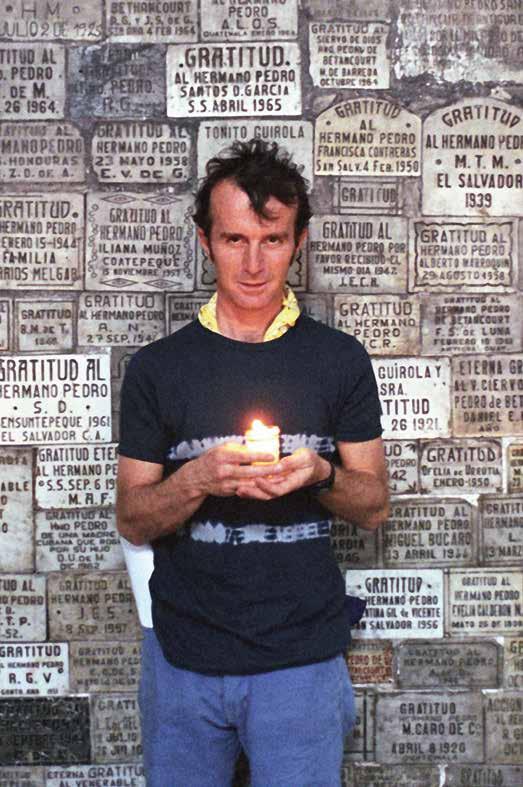

OUR CHARON, OR RATHER OUR VIRGIL, or better yet our Beatrice, is called Carlo Zaquini, a Consolata missionary.
HE TALKS TO ME OF THE EIGHTEEN YEARS spent in the Amazon forest as if they were eighteen days.
ZERO EMPHASIS, I MUST LEARN FROM HIM.
Born in a small town of the Valsesia at a time when Italy still gave birth to men such as him, the seventh of ten children, he heard while at school the adventurous stories of a missionary who had come back from Africa. He thought about those stories while climbing his rocky cliffs or lying on his back, dreaming with open eyes, on the haystack of his father’s family house.
THEN, HE MUSTERED THE COURAGE AND TOLD HIS PARENTS.
«DON’T CALL ME “FATHER”, I’M A BROTHER», HE SAYS TO ME. «I cannot celebrate mass and, if you really want to know it, I have never spoken to the indios about our God. Instead, I have asked them to speak to me about theirs». «You did well, I think that God is of your same mind», I replied.
HERE HE IS, MISTER 39 MALARIAS, fragile and indestructible, his every word forms an indelible image in my mind.
HIS EVERY STORY TURNS into the chapter of a book that I might not know how to write but would undoubtedly read until its pages had worn thin.
AT FIRST, HE LOOKED ME OVER, AS I TOO WOULD HAVE DONE IN HIS SHOES. HE WANTED TO UNDERSTAND WHO HE HAD IN FRONT OF HIM, whether I was worthy of the forest. In the end, he decided in my favor, I don’t know what it was that convinced him. My shoes, perhaps, dirty and shiny with the patina of so many out-of-the-way places on the Earth.
THERE IS AN ATMOSPHERE WITH WHICH I AM WELL ACQUAINTED, similar to that already experienced in other urban conglomerations that have developed in what, at one time, was indio territory. Something very similar to the atmosphere of an outpost in the Far West. In order to avoid problems, we enter the forest in the guise of missionaries and Armina in that of a lay nun.
BUT FIRST WE MUST GET READY, buy hammocks and water for ourselves, fish-hooks, cotton thread and other things for them. That’s right, them. THEY ARE THE YANOMAMI. And I and you and anyone in the world who is not a Yanomami is, for them, a nap.
date back three thousand years. But they are traces that are rare and hard to decipher because, when a Yanomami dies, all his possessions are buried along with him. So, as we pack our bags, I reflect that the presents we have bought for them today will someday wind up buried in the soil.
in brother Carlo’s room, we look at the map of the boundless reservation, nine and a half million hectares, almost one-third of the area of Italy. Without him, without his commitment, those boundaries would not be there today, nor, perhaps, would the Yanomami. Who instead are now about 20,000, a number that finally, after dipping many times, is beginning to grow again.
I force Carlo to tell some of his stories. Seated on the hammock he uses as a bed even though there is also a real bed available, he distils episodes, measures adventures out in small doses. It is true that he cannot celebrate mass, but we listen to him in religious silence all the same. Having arrived here from Italy without any training except in theology, he was assigned to the House of the Order of the Consolata Missionaries, here at Boa Vista, in the northernmost part of Brazil.
So, one fine day, he volunteered to fill in for an old sick missionary whom the forest had been devouring. All of a sudden he found himself alone, in the arms of that unknown mother. The first months, or rather the first few years, he spent learning how to build himself shelters, fish, hunt, defend himself against insects, jaguars, malaria, and loneliness. How to survive, day after day, night after night.
APROPOS OF THE NIGHT, «It’s late» he says to us, «tomorrow we set out early, it’s time to go to bed». And we obediently do as he says, even though I would very much like to throw a tantrum and roll on the ground the way I used to do as a child whenever my parents sent me to bed before the end of an adventure movie.
DAWN, I AM BEGINNING TO BECOME A VETERAN of breakfasts with missionaries, but it is always a pleasure to sit at table with them in the refectory, and to listen to the projects of the young and the reminiscences of the old. We stop by to pick up the pilot. He is there waiting for us, in front of his small, light-blue house.
HE SAYS GOOD-BYE TO HIS SMALL WIFE AND MINUSCULE DAUGHTER AND, AFTER A FEW MILES, INTRODUCES US TO HIS MICROSCOPIC AIR PLANE. His is a life in miniature, I reflect. Cristian, in order to exorcise fear, has himself photographed in a daring pose in front of the aircraft.
NOW WE ARE IN THE AIR, I am seated in the co-pilot’s seat, feel as if I am in a van except that if I look out the window... So I resort to my usual expedient: I turn to my travelling companions, who are terrified stiff by the bursts of wind that shake the plane as if it were a toy model in the hands of a hyperactive child, and immediately their fear becomes my courage. And I enjoy the show like a veritable reckless fool.
THE SURFACE OF THE GROUND LOOKS LIKE A PICTURE OUT OF A BOOK, there is no need for words to know what is going on down there. The paved roads and housy houses of “civilized” Boa Vista give way to the red-earth trails that connect small villages to areas of deforested land on which are built the solitary homes of the cablocos. The closer they are to the forest, the more they appear like isolated and fragile little forts built in enemy territory.
THE PILOT PUTS AWAY HIS PORTABLE NAVIGATOR AND STARTS TO CONTACT FLY HIS WAY FORWARD.
To avoid the worst that could happen, we trace bizarre trajectories in the air, not unlike sweeping graffiti-strokes on a wall. The worst being crashing on the ground and disappearing in that green ocean. It happened no longer than a month ago to a doctor, two male nurses, and, of course, their pilot, who had shuttled between the same mission we are heading to and a secluded medical outpost. When the plane started to lose altitude, they dumped all the boxes of medicines and everything else that was weighing it down. At the moment of impact, one of them threw himself out of the aircraft. By so doing, he managed to save himself but then had to witness first the pilot and then the other two passengers die in front of his eyes.
I
BEFORE ME I SEE COLUMNS OF RAIN THAT SEEM TO SUPPORT THE HEAVENS’ LUMINOUS VAULT.
AND HE FOUND HIMSELF ALONE AMID THE GIANTS.
HAS SWALLOWED.
THE
that even smoke from fires on the ground can be invisible to rescuers. The survivor knew that and, after having mangled his hands to create a small clearing around the plane wreck, he joined those same hands in prayer.
AFTER NINE DAYS, someone saw him from the sky. Perhaps it was God, perhaps another pilot, moral of the story they managed to carry him to safety. It was the second time he had come out of a plane crash in one piece or almost so. Now he works on the ground and says he has no intention of leaving it even if it is but to dust a chandelier.
WE, INSTEAD, ARE FLYING over Yanomami territory, which lets itself be admired like the reclining body of a lascivious divinity. I feel guilty because we are enjoying a view of their world that they themselves will never have. Or maybe they will, perhaps in a dream they might.
HERE IS THE FIRST UNEQUIVOCAL
OF THEIR PRESENCE: a yano, the collective hut, a characteristic circular structure with an empty space in the middle.
like shy guests would a party where they don’t know anyone and, when we emerge, we find ourselves face to face with the lady of the house, as big as a mountain, a mountain of red rocks. I turn to Carlo and ask him about it. He tells me that thirty years ago he climbed it to the very top, but that the indios who were with him had preferred, out of respect, to stop short of the summit.
AS
A CARTOON, we now pass under a rainbow, just as we begin our approach for landing. I laugh in the same insane manner I used to as a young boy, whenever I did something I wasn’t supposed to while playing in the family courtyard.
WE TOUCH GROUND and continue to move along as if we were in a jeep. The wings graze the banana trees and we come close to having a heart attack when we realize that we have almost reached the end of the landing strip.
is accomplished by a steep incline which, finally, puts an end to our mad course.
In a clearing surrounded by the forest and washed by the waters of Catrimani river is the missao that goes by the same name. Three or four wooden houses with God knows how many coats of paint on them, a paralytic tractor, three nuns grown wild and two vagabond missionaries just come back from a period spent in villages located even deeper inside the forest. And then, the first Yanomamis. It’s an emotion one gets used to having, like that of seeing chipmunks in Central Park.
under a porch, a few curious children, and two older kids who help us unload our bags from the plane. They are part of a small community that lives around the mission and are used to seeing strangers, naps I mean. The house where we are to spend the night hasn’t been lived in for three months and looks and smells like it too. A poisonous spider the size of the open hand of a basketball player bids us good-day. Without thinking twice, one of the young indios bids it good-night with his stick.
I recognize a gnawed-at Gospel, and a treatise by Leonardo Boff on Liberation Theology that some revolutionary mouse must have deemed worth sparing.
BUNDLES OF MISSIONARIES’ LETTERS, scattered sheets with the elements of a Yanomami dictionary, flash lights, cartridges, a fishing rod, and a representation of a shy Madonna.
THEN THERE ARE THE BEDS, covered by various layers of worn, almost transparent bedsheets, placed next to walls stippled with hundreds of small spots. I take a closer look and unravel the mystery: they are mosquitoes that have been squashed along with their cargo of blood.
IN THE EVENING WE COOK pasta with amatriciana sauce for everybody and our rating rises considerably.
THE BATHROOM, THE BATHROOM I SHALL NOT DESCRIBE TO YOU.
Tomorrow is already here and the day begins with six black, curious eyes that stare at me in silence from behind my mosquito net.
A knackered outboard motor propels our metal boat down the Catrimani river. The tide is at its full, fortunately, so that the rapids shouldn’t be too difficult to negotiate.
COMPETE WITH ONE ANOTHER TO
THE SKY. Others, exhausted, enjoy their eternal rest reclined on the river’s banks. Colorful birds sing a lullaby or perhaps a requiem at their bedside.
The water is brown, looks like the river in Charly and the Chocolate Factory . A bumble-bee rumbles about my nose and Carlo tells me something that has to do with the myth of the birth of the first Yanomami, but then the bumble-bee flies away carrying the details of the story with it. I must have been distracted by the foam of the rapids or perhaps by the sudden calm of a bight in which the clouds are reflected.
I saw the infinite spectrum of greens become stippled with red. And then the red disappear and reappear again. One, two, five indio girls, with their bright red little skirts and innocent bodies, have appeared among the leaves along the banks of the river. The tallest is holding a little boy in her arms, the others plunge into the water and silently watch us pass by.
Our eyes view with satisfaction the ruins of the bridge and road the army had built and the garimperos had exploited to exploit. The forest has surrounded them and the full tide has dealt them a fatal blow.
of the forest has something solemn about it. Fitzcarraldo’s absurd obsession with listening to opera arias in such a setting no longer seems so absurd to me.
So I invite Callas to sing inside me, for me alone, «Quando, rapito in estasi» and, with her voice in my ears, ravished and ecstatic, I slip off my pants and pull off my shirt. Heedless of the piranhas, alligators, and electric fish, and with the blessing of brother Carlo’s smile, I allow myself to be baptized by the river. I do a few arm strokes, then turn over and let myself be carried by the current, my eyes full of trees and sky to the brim, happy, much happier than the otter only a few feet away from me which, offended by my presence, dives under and disappears in the waters. Were I to continue my swim down the Catrimani I would end up in the Rio Branco, then the Rio Negro, then the Rio Madeira, and, finally, in the Rio Amazonas. Perhaps I had better climb back on board…
Let’s hope it’s the right one. We have left our river and are now navigating one of its smaller brethren. Sad tree trunks slow our progress to the mocking laughter of a large parrot.
into the forest along the river and the river and the forest penetrate ever deeper inside me.
I AM BEGINNING TO RECOGNIZE THE SIGNS OF THE YANOMAMI’S PRESENCE.
I feel as if I can almost sense, see the village awaiting us. Here are the banana trees, here are the children poised on the trunks of fallen trees. A call, and here are all the others popping out of that void, out of that fullness.
«They are so lacking in malice and so generous that one can hardly believe it. They never deny you something that belongs to them, on the contrary, they encourage you to ask for it and show themselves to be so loving that they might give you their very heart....».
I HAVE LET CHRISTOPHER COLUMBUS EXPRESS what one experiences when one penetrates the indio universe, so that no one will be able to accuse me of having been sickly sweet and infatuated.
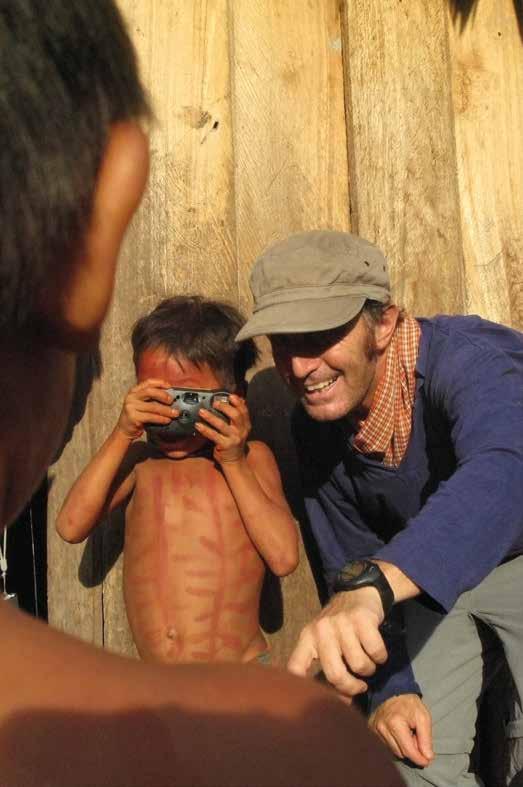
Our presence has not been imposed upon them in any way. Carlo has come to explain the project we have in mind, that of giving disposable cameras to boys and girls for them to tell what their days are like. None of them have ever used one before and this, I hope, will be the true magic of the project.
I would like to kiss it, this earth, instead I simply follow the younger ones who lead the way. The trees are so tall that, when a leaf comes off, you have plenty of time to watch it fall to the ground. Thousands of parrots of different species - who knows if each of them feels unique and superior as the Yanomami do. Carlo told me that this somewhat racist conviction has helped them overcome some terrible moments and encouraged them to resist.
At one time, measles, malaria, and tuberculosis had decimated the population. Brother Carlo still remembers those days as a nightmare that accompanies him during the day and makes him wake with a start at night.
when the children were dying like flies and the fastest men flew across the forest seeking his help, Carlo left the mission and moved to the disease-stricken villages for months at a time.
HE BROUGHT
with him and turned into a doctor, turned into one of them. When his cures were effective, the elders thanked the spirit of the needle and the pills. There were also happy days, when Carlo would roam the forest with the village chief who told him the names of all the different animals and plants. Carlo wrote down more than five-hundred of them in a single day. They were the days of silent hunting, with bows and arrows and traps, of a language learned one word at a time, of the discovery - which he himself made - that the name of these peoples was “Yanomami”. The days when mutual reliance first became trust and then grew into friendship.
I SAW IT WITH MY VERY EYES, even after many years all the elders remember him and hug him and keep asking him why he has never married. More than once in the past, some Yanomami had asked him whether he wanted to lie with their women.
THE
in fact, think that children are conceived not all at once but in several reprises, and some of them liked the hair on the legs of our missionary friend so much that they would have liked to have a son who carried the trait. With a mixture of embarrassment and cunning, Carlo declined their offers, convinced them that his leg hairs would have been a disadvantage for a hunter to have.
The sun is already high in the sky, the heat is already intense, the light already white. Almost without being aware of it, I cross the hut’s narrow entrance and find myself in the dark, surrounded by screams - their greeting, their welcome. When we leave it will be different. The Yanomami never say “adieu”.
SLOWLY, MY
to the darkness and the secrets of a suspended and swaying world start to come to light.
EVERY FAMILY OCCUPIES, ALONG WITH ITS HAMMOCKS, its fire, and its few possessions, a portion of the communal hut.
They are the bodies of tapirs, monkeys, and other prey that have been smoke cooked. Laughing, Carlo tells me that a film-maker who had come here to shoot a documentary, upon seeing a similar pile of smoked flesh, had run away screaming «Help, they are cannibals!».
In brief, luckily their contacts with the outside world are infrequent and not easily had. For my part, I have no difficulty smiling. Later on, at night, I will play with the small children in the yano’s central outdoor space, and smiles will give way to veritable laughter. For the moment, I look around, the red-colored cotton hammocks intersect one another and create an unknown sense of depth within the frame.
A child who is more courageous than the others comes up to touch me and then runs away. A thin dog growls and a kid shuts it up by growling in turn.
and is mesmerised at the sight of it reflected on the screen of my video camera. A family is finishing its turtle-based meal, the plate is none other than the shell of the poor old beast turned upside down. Ten hands ranging in size from Extra Small to Extra Large plunge inside it.
WHEN I FILM THEM, THEY FREEZE AND REMAIN MOTIONLESS. Then they let out a smile, sometimes secreted, sometimes out there for all to see and toothless. The girls have the charm of shyness, sensuality, purity. But here too, as in much of the “savage world”, the beauty of women is as fragile and ephemeral as the life of a butterfly.
TWO PREGNANT GIRLS ASK CARLO MY AND ARMINA’S NAMES, THEY WANT TO NAME THEIR SOON TO BE BORN BABIES AFTER US. WHO KNOWS WHAT LITTLE STEFANO YANOMAMI IS DOING AT THIS VERY MOMENT.
KAREKA, THE CHIEF,
and assigns us a space in the yano where we can set up our hammocks. He also explains to us or, rather, he explains to Carlo who translates to us, that tomorrow a great feast is to take place which also the inhabitants of nearby villages will participate in.
NOW THE CALM HOURS OF THE DAY HAVE ARRIVED, the yano’s life slows down and remains suspended like the smoke that rises from the hearths. The hammocks swing to and fro to the slow beat of their life that perhaps doubles its span, otherwise quite brief. But we, instead, must now start to work.
IT IS TRULY A GREAT AND UNEXPECTED STROKE OF LUCK. WE WILL BE AMONG THE FEW NAPS ON EARTH ABLE TO BOAST THAT THEY HAVE ATTENDED ONE OF THE MOST EXCLUSIVE PARTIES ON THE PLANET.
WE ROUND UP THE BOYS AND GIRLS under the age of twelve, thirteen, and begin to explain to them how the disposable cameras work. As in a theatrical representation, I mime the “technical” aspects.
AS IN EVERY CORNER OF THE WORLD, there are children who are sure of themselves and enterprising and others who are shy and embarrassed.
THEY ALL HAVE UNDERSTOOD HOW IT WORKS and, in groups of three, set out into the brush in search of a scoop. Among the lot, Esmeraldino deserves a few more lines spent on him. Short, broad-shouldered, square-headed with funny protruding eyes, he is very different from his playmates. He fell in love with photography and every two hours I would find him hanging around me again because he had finished shooting with his camera and wanted another one. First we became friends and then he became my Yanomami language teacher. I would draw an object in my notebook and point to it with my finger and he made me repeat its name.
THE WORD FOR SUN IS “MOTOKA”, FOR MOON “PORIPÒ”, CLOUDS ARE CALLED “KROKE KROKE”, STARS AND FIREFLIES “PINIMAUHU”, RAIN “MAAKEI”.
ESMERALDINO SEEMS SATISFIED with my pronunciation and happy with his life. A few months before, he had fallen ill. He had such a high fever that he fell into a coma. He was unconscious for two days. But the shaman said that it wasn’t a case of one of the white-man’s diseases but, rather, of a disease of their own, of a curse cast by enemies, and that he would cure him himself.
for their extraordinary powers. Moral of the story, Esmeraldino woke up. Carlo tells me that shamans often go through similar experiences in the course of their childhood and that our little photographer might someday become the village witch doctor.
The women set out in single, literally “Indian” file with baskets on their shoulders to gather tapioca, four boys come back from their hunt with bows that have grown in size along with them, an indio with a foot half eaten by a botox snake is busying himself around a large cauldron wherein the sweet-potato beverage that will raise the level of excitement during the feast is to be brewed, groups of children chase one another and suck sugar cane.
THEN I HEAR VOICES COMING FROM THE FOREST, FOLLOW THEM, AND DISCOVER, IN A NATURAL POOL, FREEDOM. Over and over the Yanomami dive into that water that I too indulge and laugh and play in. A greater freedom than this, I reflect, doesn’t exist. And I linger there watching the others, I linger there feeling happy.
WHEN WE COME BACK IT IS ALMOST EVENING, almost everyone has returned. There is a strong smell of smoke, the men take turns around the big magic cauldron. Together with Carlo, I walk about the yano. Everyone is very affectionate and intelligent, their proverbial candor appears to have resisted. I wonder whether it isn’t their real strength. There is no prison for those who misbehave.
THE GUILTY PARTY IS IGNORED BY THE CLAN and left to spend time alone in the forest, «to cool down». It is a wise form of punishment but also more cruel than one might imagine. The Yanomami, in fact, do not like spending time alone, they are afraid of being attacked by Okapo, the «enemy painted black».
I WOULD LIKE TO KNOW SOMETHING ABOUT THEIR DREAMS AND THEY, SHY AND SMILING, DESCRIBE THEM TO ME.
in the scrub, the men of hunting and fishing adventures. While staring at me in the eyes, one of them tells me that he had dreamt of our coming. The girls are all busy covering their backs, faces, breasts, and arms with primitive and striking decorations made using red dye from the urucu plant. A drop of milk comes out of a mother’s nipple and slides down her breast. I
NOW IT IS DARK AND WE FIND THE WAY BACK TO OUR HAMMOCKS ONLY WITH DIFFICULTY. Seated in a circle, we start to eat and, just when I think the day is about to end, the day begins. Exactly as the day was calm, so is the night animated.
It all begins with a long monologue by Kareka. From, not the middle, but a hidden corner of the yano, the chief speaks to all those present and, at times - or so it seemed to me - to himself first and foremost. Then the young girls, those who had been painting each other’s bodies, begin to dance in the central open space in the limelight of the moon. They move backwards and forwards for an endless interval, repeating a hypnotic song with monotone voices. In the end, we join our voices to theirs and the Yanomami show their appreciation by screaming loudly.
Yet I who sleep but a little in my own bed, how can I hope to fall asleep here? In any case, it’s not going to be only the emotions of these memorable hours to keep me awake. After the girls, it is the elders who make their voices heard, with words that sound like poetry. Then, a little at a time, it seems as if sleep comes over everyone or almost everyone.
I HEAR THE SIGHS OF LOVEMAKING, while not far from my nose the sound of flatulence or, rather, of veritable farts, desecrates the atmosphere.
its newborn heart out for a long time and the only complaint is that of a dog that barks just like a dog.
I don’t know whether I’ve caught a few minutes’ sleep or not, what I know for certain is that I have not been awakened by the crowing of their beloved roosters. Rather, it has been the dark and hysterical rattle of an indio covered with feathers and paint that has awoken me. I raise my head just enough to see the shaman of the guest village initiate an interminable propitiatory ceremony. An indio who is next to him sounds a countermelody. That lament which became first a threat, then a blessing and, finally, a chant, will remain impressed on my mind.
THROUGH
the two inhale the fumes of a powerful hallucinogen, while the whole yano begins to respond. Many women have put colored feathers on their ears and heads and, together with the men, they respond with dances and screams to the chanting and yelling that comes from without. Carlo tells me no one may go out until all the guests have come in but that, if I want, I may go have a look. So I go out alone and find myself surrounded by unfamiliar faces, the inhabitants of villages even several days’ away on foot.
DIVIDED
THEY HAVE MARCHED THROUGH THE FOREST for hours on end, in a millenarian formation: the father in front with a bow in his fist, then the children, and, finally, the mother with a basket that contains all their belongings and a child in her arms. Some women have traits that are different from those of others and radiate a great pride and dignity. Even the patterns that decorate their bodies are different. Many of the men have painted faces and hold spears and bows, as if they were going off to war, and there is one covered in black and white stripes who moves about in an unseemly manner.
ALL OF A SUDDEN, THEY START TO RUN INTO THE YANO. I and my crew try to film the mad frenzy of the moment. Greeted by apparently hostile cries, they continue running around in a circle. Then it is their women’s turn, and then that of other groups. They intermingle in dances whose meanings start here and reach all the way to Columbus’ caravels.
that has been carefully prepared for over twenty-four hours till they retch and we, stunned and participating and inebriated with visions, manage to thank Carlo for the honor that has been bestowed upon us.
In the evening, while all my travelling companions are already on the boat, I run into Kareka who signals to me with his hands that the others are about to leave; with my own hands, I let him understand that I would like to stay. First he looks at me seriously, then he sees through me and bursts out laughing, and I along with him.
MY SHIRT, WHICH HAD ORIGINALLY BEEN WHITE and then became covered in red dye, is now all wet and looks like a watercolor painted by a three-year-old artist.
I FIND MYSELF BREATHING IN A DIFFERENT WAY AND I FEEL WELL.
Birds plunge into the water and fish fly towards the sky. I write in my notebook, struck but not sunk by the storm. As I think back to the children, my lips mime their smiles.
THE SHACKS IN LIMA’S FAVELAS ARE THE COLOR OF CANDY. BITTER CANDY. In the sad suburb of a forsaken week-end, the shopping centers - cathedrals of the new planetary religion - swallow whole families full of desires that are destined to remain just that.
I COUNT THE STRAY DOGS, reach twelve right away, like the apostles. No trace of a Jesus cat.
HERE IS THE OCEAN, surfers of the barrio, chicas of the bar. One whore–one–in front of the two towers of the Marriot Hotel. Primero de majo in Lima. The lunch of the rich and the mountains of garbage, dinner of the poor.
MORE STREETS OF DUST and lurid poverty out of which, as if by a miracle, a she dressed in immaculate white will emerge on beginner’s high-heels and with a proud look.
ARMORED CARS IN THE PUBLIC SQUARE AND A FEW PEASANTS
under the hooves of the charger of Saint Simon Bolivar (whom I myself have beatified in the name of all the short men in the world for his famous saying: «A man’s height is measured from the head up.»).
Tight-shirted and soft-gaited girls go. I can smell the fragrance of their indio past but not that of their future.
Colored insects on the car’s windows, rusty beetles on the streets. A desert of dunes surrounds Lima. An arid life, I suppose, for those who live here. Here is the land squatted upon by the landless, the houses like empty shoe boxes left behind after a looting. Who knows how much they will have fought to take over that nothing of sand, this air of stinking fish canned here and eaten on who knows what table.
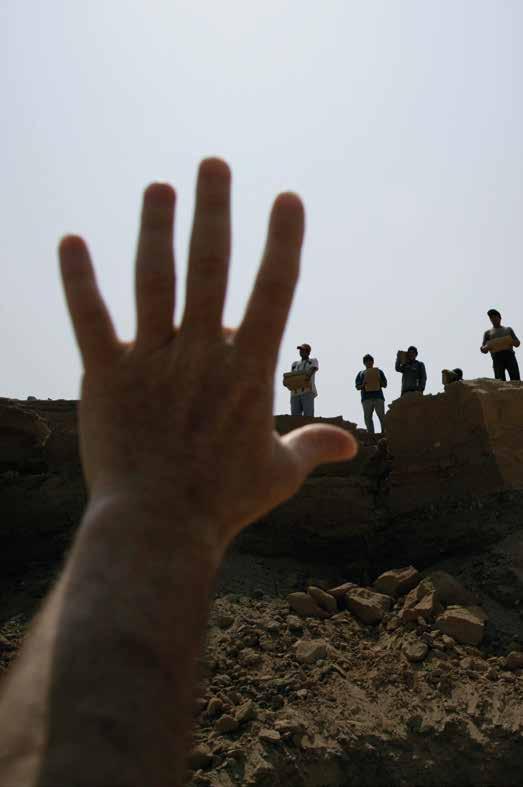
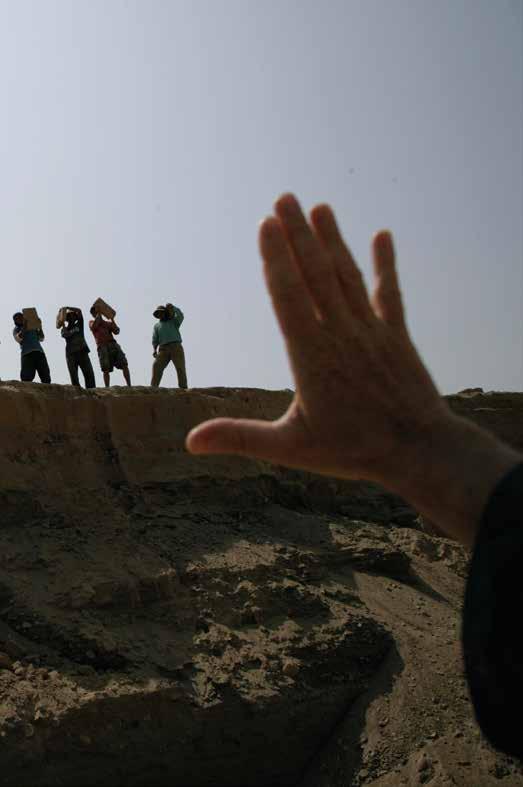
and black cacti as still as sentries, a river, finally, surrounded like a master by its followers: fruit trees, corn, sugar cane, banana trees. Black holes of miners on the hills, black holes of rabbits on the meadows. If had to choose which hole to pass my life in, I wouldn’t have any doubt: in the rabbit’s!
OF A SUDDEN THE WHOLE BEING OF THE POOR FATHER OF A FAMILY PASSES IN FRONT OF MY EYES.
A HORSE RACES AWAY PURSUED BY THREE DOGS, just as our day is by night. The headlights reveal figures that appear like ghosts out of the darkness and into the darkness vanish. Like so many others already seen. On roads and paths leading towards villages in the Sahel, Nepalese huts, Guatemalan shacks. «Where are you going?» I would like to ask them. But if they were to ask me the same question, would I be able to answer?
FROM HERE, WE WILL LIGHT A FIRE, EAT CHEESE, TELL STORIES, AND WARM EACH OTHER UP. AND YOU, WHERE ARE YOU GOING?».
IT IS DAWN, HERE I AM with a new hat on my head and a pen in my hand, during a brief pause between one take and the next. Here I am and I look and write about a village in the Andes with a misdeed to atone for. That of being there, too close to the great mine of the Canadians and Fujimori. The terrible lives of the miners have rendered the life of the village terrible as well.
I WALK IN THE PUNA. My lungs long for air, as they did in Lima. There because of the smog, here because we are at an altitude of 15,000 feet. Boundless and green plateaus with a view of the white mountain tops of the Blanca Cordillera.
THE WOMEN HAVE DISCOVERED THEY CAN SELL THEMSELVES, THE MEN THAT THEY CAN KILL, AND THE CHILDREN, WHO KNOWS WHAT THEY HAVE LEARNT, THE CHILDREN.
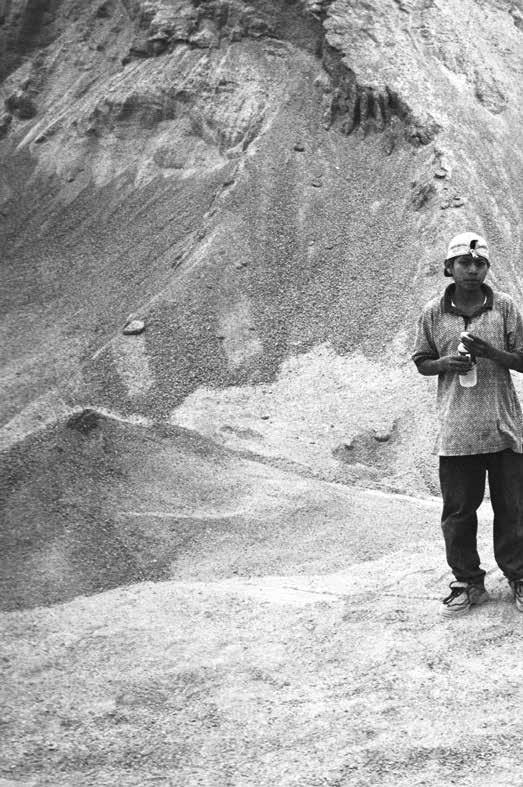
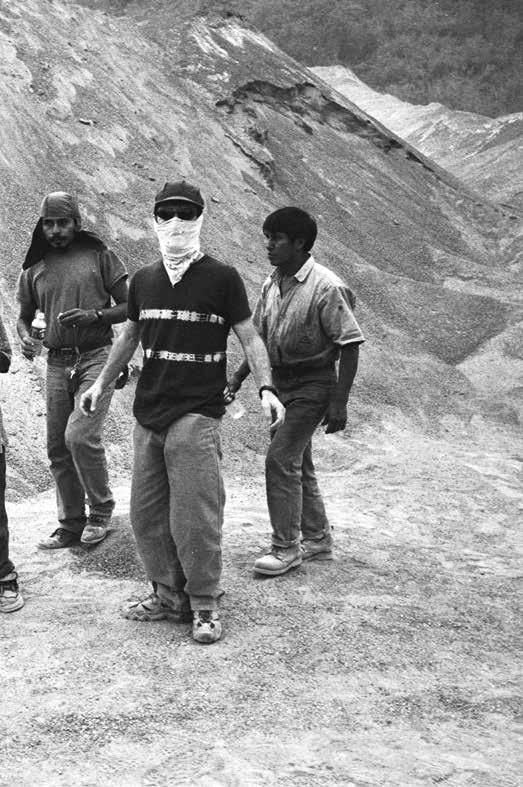
THOSE WHO LIVE HERE LIVE HIGHER UP THAN ALMOST ALL THE PEOPLES OF THE EARTH. AND LOWER DOWN IN TERMS OF MATERIAL LIVING CONDITIONS.
THEY LET US INTO TWO MINUSCULE STONE HOUSES, where even I and my 5 feet 5 inches have to stoop in order to enter. Compared to so much poverty already witnessed and told about, here I am struck by what is missing.
AN OLD WOMAN WITH THE HUE AND ODOR OF SMOKE, as you will have seen in any tourist-agency catalog, a young married couple, and a little boy who will soon roam the puna with his whole destiny concealed amid the bleating of a handful of sheep.
NO NEIGHBORS, NO VILLAGE, NO TREES, NOTHING. ONLY THE FLOCK OUTSIDE, A DOG, AND A MICROSCOPIC PLASTIC GREENHOUSE TO PROTECT EXTREME ATTEMPTS AT HORTICULTURE.
and the hatred of a pack of its fellows walks next to me. I haven’t understood whether it loves me or my role as a director, in any case I’ll use him in one of the shots.
In the middle of so much despair, she proudly shows me her set-up as an evacuee. Children sleep on the ground, in the shade of crumbled walls, their legs covered with the kiss marks of insects, spiders and mosquitoes. There is also a ten- or maybe eight-inch TV, in front of which a tiny tot wearing a faded and tattered T-shirt of the Barcelona Football Club tries to follow, amid waves and fogs, his knee-high to a grasshopper twin, Lionel Messi, as he dumbfounds the cyclopean defenders of all the soccer teams in the world.
Imagine being shut in your prison cell. Imagine feeling the deep, underground rumble of the earthquake and try to count to one-hundred and eighty. The terror of feeling caught in a trap like a mouse and then, suddenly, a wave of adrenalin that pushes you beyond the crumbled walls of the prison towards the darkness or light of an unexpected freedom.
AFTER HAVING FLOWN OVER THE YELLOW OF THE SAHARA FOR MORE THAN TWO HOURS, the first and only green thing you see upon arriving at Ouagadogu is the green rectangle of a soccer field. I mustn’t forget to tell Mattia and Francesco about it.
THE LIGHT AND ODORS REMIND ME OF THE ODORS AND LIGHT OF ROME THE DAY MARGHERITA WAS BORN.
The mosquitoes have just come out to shop. I sprinkle repellent on me and hope they don’t raise a fuss at customs: I don’t have the yellow-fever vaccine stamp.
BURKINA, MANY HAVE TOLD ME, IS STILL AFRICA THE WAY AFRICA USED TO BE.
It was fated that my first time would have been like this, all in one go.
IT IS 38 YEARS AND 5 MONTHS THAT I HAVE BEEN WAITING TO BE HERE.
Everything moves, flows. Panta rhei , my sister Valentina would say. And the movements, the occupations, the faces, the gestures, the asses are so different that I have a hard time calling them movements, occupations, gestures, asses.
Bananas cradled on the heads of girls with ancient and unknown gaits. Carpenters, tinkers, artisans. Bicycles, scooters, donkeys.
Ninety percent of the population are farm workers. Many come to sell their produce in the city. I would like to eat a carrot but you can’t. I try to foresee whether I’ll catch malaria or not.
CHILDREN NO
OLD GREET ME. IN AFRICA, PEOPLE DO NOT EMBRACE. They shake my hand with very serious intent. I’m glad to be able to speak French with them. The little girls in a Catholic school are happy to have my address. They wish to exchange correspondence with me. In the end, I have thirty plus addresses. And fifty of them have mine.
WHILE WE LOOK FOR A NOOK IN WHICH TO “SHOOT”, WE COME ACROSS A GROUP OF GIRLS WHO DANCE AND SING. They have a way of moving, of speaking, of greeting you, and of smiling that enchants me. I wish I were less naive but cannot manage. And the comparison with our world is continuous.
AT ONE TIME, OUAGADOGU WAS KNOWN AS THE CITY OF WARRIORS, TODAY DOZENS OF DIFFERENT ETHNIC GROUPS LIVE HERE TOGETHER. And at least five religions. Schooling is not mandatory, the schools and kindergartens we have visited seem like oases.
I KNEW I WOULD BE HAPPY HERE, I KNEW IT, BUT WAS AFRAID OF BEING WRONG.
BY THE POVERTY. IT HAS NOT BEEN SO. The mosquitoes dance around my notebook. DIGNITY. THAT’S THE WORD. It’s been two days since I arrived in the Land of the Free and Honest Man (that’s what Burkina Faso means).
I SAW A HOSPITAL WITH A BIG WARD RESERVED FOR PREMATURELY-BORN BABIES. In the city, the infant mortality rate is 40%. In the countryside, it’s 90%.
HE HAS BEEN HERE FORTY YEARS. Long hair, white beard, with his below-the-knee tunic and the red cross of his order on his chest, he seems like a medieval warrior.
I SPOKE WITH A CAMILLIAN MONK FROM NAPLES, HIS NAME IS TANO. HIS BURKINIAN FRIENDS SAY HE IS A MAFIA BOSS.
HE
AIDS
(4000 CASES A DAY), THE OLD WOMEN ABANDONED BY THEIR FAMILIES THAT ACCUSE THEM OF BEING SOUL EATERS. Everyone knows him, he drives a jeep with the forearms of a boxer. Father Joseph tells me in jest that the “mafioso” is immune to every disease, to all mosquito bites.
A GREAT MANY ETHNIC GROUPS LIVE TOGETHER PEACEFULLY IN THIS COUNTRY. The Mossi are the most numerous, the Lobi the most guarded (they resisted colonization and are very jealous of their traditions).
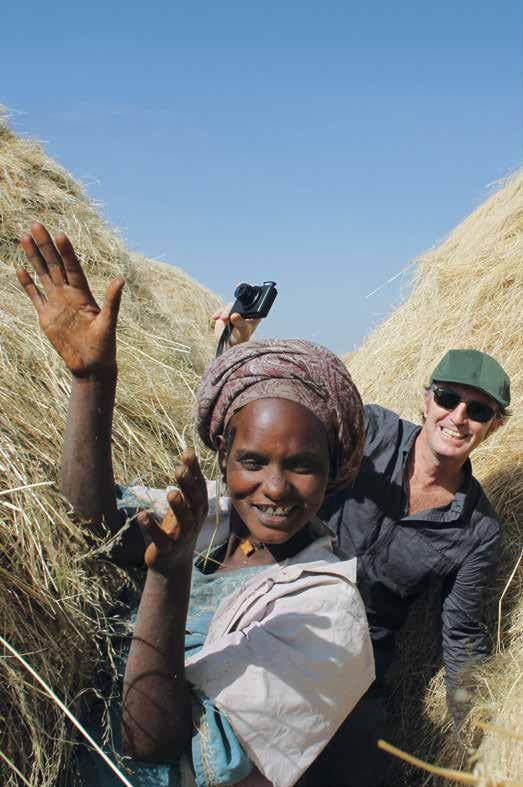

THOUGH THE RATE OF ILLITERACY IS VERY HIGH, THE PEOPLE OF BURKINA, WHEN THEY MOVE, CAN PUT THE GOVERNMENT ON ITS KNEES WITHIN TWENTY-FOUR HOURS. When a famous journalist of the opposition was found carbonized in his car, the country rose in unison. Out of protest, it was decided that electricity and every sort of activity and commerce would be interrupted. They made a “ville morte”, a dead city.
TV.
HOW I WOULD LOVE TO CARRY HOME WITH ME A CHAIR MADE OUT OF STICKS, A CHICKEN CAGE, AND THAT HAND-PAINTED HAIRDRESSER’S SIGN. «Place your hand on Africa, and Burkina Faso is there, where you can feel the heart beating strongest» (did someone say that to me or is it the copywriter in me that’s speaking? I swear I cannot recall).
TODAY I WOKE UP AT FIVE, DETERMINED NOT TO WEAR THE GARB OF THE BLOWN-OVER, NAIVE TOURIST.
ONCE AGAIN, MY THOUGHTS GO BACK TO ITALY, WHERE COLLECTIVE CONSCIOUSNESS IS NO MORE, HAVING DIED OF SLEEPINESS IN FRONT OF THE
THAT HAD SPILLED OUT OF MY PEN THE DAY BEFORE. I WOKE UP DETERMINED TO LOOK WITH MY EYES AND NOT WITH MY HEART. But I chose the wrong day. Today the Catholics go on pilgrimage. Carried by trucks, old cars, scooters, bicycles, horse-drawn carriages, legs, and the wind.
I have spoken with those who live among them and help them. They are people who have nothing tragic about them. Nothing rhetorical or bigoted. On the contrary, they have a side-splitting sense of humor.
WE NAVIGATE A STREAM OF PEOPLE, many greet us and answer my greetings with smiles. We have yet to witness a single gesture of discomfort, intolerance, or lack of friendship in our regard.
THE BURKINIANS ARE TEN MILLION. Such a small number that I am naturally inclined to imagine, naively, that at least here it may be possible to do something.
THE SILENCE, THE CONCENTRATION, THE PARTICIPATION WITH WHICH THOUSANDS OF EYES FOLLOW THE MASS AMID THESE TIMID HILLS IS SHOCKING. One hears songs and utterances from down deep. And one feels something great, mysterious, and tangible suspended above the lot of us.
ONE OF US HAS FELT SICK. PERHAPS NOW IT IS MY TURN. Perhaps now I’ll stop using my mouth to be romantic and start using it to throw up.
IN A FEW SECONDS, WE HAVE BECOME PREY TO THE GREATEST ANXIETY.
All that it took were the following words: «Lorenzo has caught malaria in its most serious form».
I THINK OF THE MONEY SPENT ON WEAPONS, ON FAKE HUMANITARIAN AID, I THINK OF THOSE WHO HAVE SPECULATED ON THIS POVERTY AND FINALLY FEEL TENDERNESS GIVING WAY TO RAGE INSIDE ME.
AND ITS
CORRIDORS HAVE BECOME A NIGHTMARE. Claustrophobia has banished the enthusiasm of the last few hours. Here are hell and paradise.
The hotel is a horrid prison, it is a hellhole of carriers of malaria. In the lobby, gorgeous black young women. Angels with the phosphorescent halo of AIDS around their head.
RESTLESS NIGHT. I DON’T SLEEP FOR SHIT. BUT IN THE MORNING THEY TELL US THE RESULTS OF OUR SCREENINGS FOR MALARIA ARE NEGATIVE. And as soon as we leave the hotel and set out for the Sahel region, I feel another person. The famous Sahel, the terrible famine of 1973. I have Salgano’s photographs clearly in mind, I talk about them with Zizola. Pierpaolo, Leonardo, and Lorenzo of course, stay at the hotel, entrusted to the cares of an able and gigantic local doctor.
AT LAST, I AM LEAVING THE CITY, IF ONE CAN CALL THAT IMMENSE VILLAGE MADE OUT OF HUTS AND ONE-FLOOR MUD HOUSES A CITY. We cross Mossi territory. The savannah runs alongside me.
THE FIRST BAOBABS, THE GOATS, MEN ON BICYCLES, WOMEN ON FOOT. LITTLE KIOSKS THAT SELL BANANAS, AND AMUSED SMILES AT THE SIGHT OF MARCELLO THE CAMERAMAN’S GOATEE.
As if by magic, as soon as we get moving I feel fine. The heat is dry and doesn’t make you sweat. My leg feels a bit cramped inside the car, but I am too ashamed to mention it as we speed by girls who carry unbelievable loads on their heads. They will be walking like that for hours and miles.
THE SAHEL IS A REGION THAT IS BECOMING INCREASINGLY DESERTIFIED. The young members of SIX S study and apply solutions to save the crops and best exploit the water supply, combining old techniques with new ideas.
IT WAS SUPPOSED TO BE A DAY OF SCENERY AND COOPERATIVES, BUT IT HAS TURNED INTO A JOURNEY BACK TO THE STONE AGE.
THE SIX S IS A COOPERATIVE THAT BRINGS TOGETHER THE VILLAGES OF THE SAVANNAH AND OF THE SAHEL. Its members produce soap out of tree seeds, they dye fabric, they have a radio station.
HERE I MEET CLARISSE. SHE WILL BECOME MY PEN PAL. Her letters written in an elementary and romantic French will remain in my memory’s drawer forever. Along with the picture of the small pig farm I helped her set up.
WE STOP TO FILM THE FIRST SCENES AND ARE IMMEDIATELY INVITED TO LUNCH BY THE BISHOP OF THE DIOCESE. ANOTHER FACE TO REMEMBER. Then we leave the paved road and enter the territory of Mossi villages. It is hot, the earth is dry. Suddenly, in the middle of the crop fields, a tall man appears, dressed in a long robe.
WE STOP AND THE BOY WHO IS OUR GUIDE EXPLAINS THAT WE ARE IN THE PRESENCE OF THE CHIEF OF THE NEARBY VILLAGE. WITHOUT HIS PERMISSION, WE CANNOT DO ANYTHING. They speak between themselves in a low voice, then signal me to approach.
I explain we must film some scenes there to tell everyone about their work. Serious but happy, he allows himself to be filmed in the yellow field in his even yellower robe. I instruct our guide to ask him whether we may visit a zaka, a typical village of the region, a set of huts surrounded by a defensive wall.
THE CHIEF LEADS ME IN THE DISCOVERY OF A WORLD THAT IS OUT OF THIS WORLD.
The huts are made out of mud, dung, and straw, the roofs of straw and branches. The round ones are reserved to the women, the square one belongs to the chief, who can have even more than ten wives. Only the small mosque is made out of real bricks.
The barns and small corrals where I am introduced to three billy goats, a donkey, and two cows. The she-goats with their black heads, instead, roam free.
I THOUGHT IT WOULD BE INTERESTING BUT I WAS WRONG, IT IS AMAZING.
It is explained to me that this is a great honor. I ask how one says “good day”, “thank you”, “donkey”, “goat” in the Mòoré language. EVERY TIME I
WAKE ME UP. I FEEL AS IF I AM IN A TRANCE. We enter a small hut. It is clean. On the ground, a few pieces of colored fabric. In the small courtyard, hidden in a corner, is the bathroom, at the opposite end, the kitchen. Two stones, three bowls made out of the bark of some mysterious fruit.
I AM ABOUT TO MAKE THE ACQUAINTANCE OF THE LATEST NEWBORN IN THE VILLAGE. He is seven days old, the grandmother shows him to me proudly. He is full of hair, I take him into my arms. Then the mother arrives, very beautiful and shy.
As I come out of the hut, two women with goitres and many children with bloated stomachs remind me this is one of the 1,200 Mossi villages in the Sahel and not a film set. I feel as if I were drugged, I speak in Italian to the kid of the SIX S and in Mòoré to Luca.
Later, in the course of our return trip to Ouaga on the minibus, he tells me: «I don’t think we’ll be able to go back to the same old life as before, it’s rather worrisome». But he doesn’t seem at all worried, I haven’t seen him so excited in ages.
BEFORE WE START SHOOTING, WE ALWAYS ASK PERMISSION.
They are very proud but also very hospitable and witty.
They fought against colonialism with the same tenacity with which they fought against the drought. And the refusal of that foreign tongue waves like a flag above the huts.
AND YET, ALTHOUGH IT HARDLY SEEMS POSSIBLE, WHEREVER THERE IS WATER, THE SAHEL BECOMES COLORED.
To build 100 wells for 100 villages in the Sahel. There’s a good reason to be in the world.
THE VILLAGE IS IN A TURMOIL BECAUSE OF OUR ARRIVAL BUT ALSO BECAUSE OF TONIGHT’S WEDDING FEAST. Meanwhile Zizola tells me that it is precisely for this reason that a young girl is crying inside a hut, surrounded by her girlfriends.
SHE IS THE BETROTHED ONE WHOSE CLITORIS IS ABOUT TO BE REMOVED. I HOPE ZIZOLA HAS MISUNDERSTOOD.
THE RELATIONSHIP BETWEEN THE KIDS OF THE COOPERATIVE AND THE HEADS OF THE VILLAGE IS INTERESTING.
The kids show great respect. Though they have studied and at times give advice that runs against millenarian traditions, such as not to let the animals out of their pens to prevent them from going around damaging things, there isn’t the slightest trace of haughtiness in them.
IN TURN, THE ELDERS SEEM READY TO FOLLOW “NEW” WAYS TO TRY TO WARD OFF POVERTY. On this day, Father Samporè also deserves to be mentioned. He had prepared a visit to the Catholic radio station, to the girls’ college, etcetera etcetera and instead watched us film a Muslim village for hours on end.
LEANING AGAINST THE WALL OF THE MOSQUE WITH A SWEET SMILE, HE IS THE SYMBOL OF THE RELIGIOUS TOLERANCE ONE BREATHES IN THIS COUNTRY.
IT IS SUNSET AND, INSTEAD OF LEAVING, I WISH I COULD STAY HERE. ALIGI USED TO SAY IT TO ME ALREADY TWENTY YEARS AGO: «IF YOU GO THERE YOU ARE SCREWED».
On the way back, dead tired, we watch the setting sun, the dust raised by screaming soccer games, the green patches of vegetable plots, then savannah, savannah as far as the eye can see, and rows of people along the road which grows increasingly dark and then appears lit here and there by the lights of roadside huts. The police stop us a couple of times but allow us to resume our trip without further hindrance. A piglet missed by a hair and after hours and hours on the road we find ourselves back in Ouagadogu.
THE SMOG FORCES US TO KEEP A HANDKERCHIEF PRESSED AGAINST OUR MOUTHS. Distress slowly but surely regains ground. In three nights I will have slept all in all for three hours. My leg hurts. As soon as I enter the hotel I feel a desperate desire to leave.
I LOOK AT THEM, AND COMPARED TO THE MALARIA-BEARING MOSQUITOES OF THE HOTEL INDEPENDANCE AT OUAGADOUGU THEY SEEM LIKE INNOCUOUS GNATS TO ME.
Small fish in coconut oil fry in the cooking corner of a refugee house made out of wood, canvas, and plastic. Tears as salty as the water of the ocean that stole a twenty-four month old girl child from the hands of this wife mother.
The cries of children who call the waves as if they were calling for a taxi to carry them quickly down there, to the beach dune. Two lovers, ancient young unique and universal. The eye of an elephant princess, the nose of a beggar king, the ears of an acrobat dog. School dawn and snow-white uniforms on dark skins and immaculate eyes and tresses with red bows. White Buddhas amid the palms of the forest, black Buddhas on the palms of the vendors. At the market, the stench is first unbearable, then bearable, and later still perfume.
TSUNAMI, THAT IS WHY I’M HERE.
ONE
FOR OUR EARS: «One holiday morning at ten thirty. Woman says to her man “I hear storm noise” and he goes out and sees motionless palms and blue sky. Closes hut door and looks his bride wondering like farmer his dog before earthquake. Then looks with eyes his last daughter and sees her last time. Tsunami arrives and comes in without knocking».
TSUNAMI TEARS OF WHO TELLS THE STORY, TEARS OF WHO TRANSLATES, TEARS OF WHO LISTENS.
TSUNAMI IS CHILDREN HANGING ON LIKE UNRIPE COCONUTS TO FIFTY-FOOT HIGH PALM TREES.
TSUNAMI SKELETONS OF BOATS THAT SCREAM, TSUNAMI SKELETONS OF HOUSES THAT TELL, TSUNAMI SKELETONS OF OLD FOLK WHO ARE SILENT.
TSUNAMI INVENTION FOR TOURISTS.
TSUNAMI NAME OF TERROR AND NAME OF GAME OF THOSE CHILDREN WHO POINT OUT BIG TOY WAVE APPROACHING. TSUNAMI YESTERDAY UNKNOWN TO VOCABULARIES AND PEOPLE.
SUNDAY HERE SEEN FROM ROYAL DECK of our racing minibus. Life and death grazed at every curve. Between planted brakes and cows, pedestrians, motorcycles, bicycles, dogs, trucks, Tamil bombs, and naked feet. Crows on the poor leftovers of the poor. Crows on the rich leftovers of the rich.
Buddha meditates, Buddha teaches, Buddha rests. But the Buddha I have in front of me swings from the rear-view mirror and hypnotizes. Smell stink in waves from the window. Smell perfume in waves from the waves. White rice fireman putting out the flames of fire-raising vegetables and fish and meat.
TSUNAMI IS SIGNS THAT SAY: HERE AID WAS BROUGHT BY US AND US AND US AND US.
OF WITHOUT EVERYTHING WHOM NO ONE WILL EVER HELP, INCLUDING ME.
GIRL WOUNDED AND LYING ON THE STONES next to her bicycle grounded like her. A man holds her head and puts a serendipitous pillow behind it. Then, then we are already past.
TUK-TUK TAXIS RUN ON THREE WHEELS almost knocking over dogs on three legs while we three laugh blessed by the third eye of who knows who.
LOOK, BETWEEN THE WAVES COMES THE NIGHT with an upside-down half moon! Look look look look.
Like tireless smugglers they keep storing boxes and boxes of stolen goods. Zizola, with a boiling and hurting leg, cries and I reflect that one always pays through the nose the stiff bill of all those wave-salted smiles of twenty-four hours ago.
a day is a lifetime, I’ll come back older. It’s the same old story: a week is a very long instant, I’ll come back younger.
THE OWNER HUSBAND OF THE SHE-ELEPHANT BLESSES ME, letting me pass under the legs of his enamored slave. One, two, three times. Then he makes me rest my head on that cement skin inside which I hear a huge warm heart beating. Fabrizio, with a parched throat, burning eyes, chokes on a killer pepper and then, after some back slaps, breathes again. My punches blessed by the elephant princess have kept him here among us.
WHEN THEY WANT TO SAY YES TO YOU THEY MOVE THEIR HEAD AS WE DO WHEN WE SAY NO.
HERE COMES THE OLD OVER-PACKED TRAIN. WITH OPEN DOORS AND PEOPLE HANGING OUTSIDE. LIKE A STREETCAR OF OURS IN OUR NEO-REALIST ITALY.
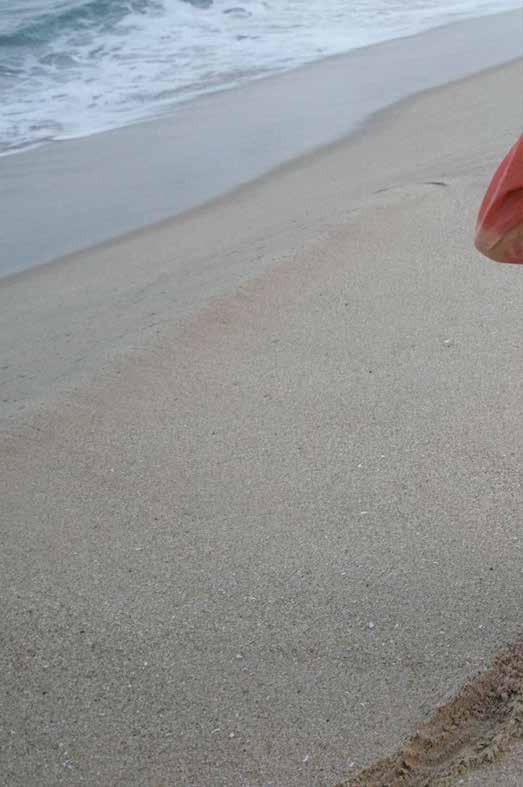
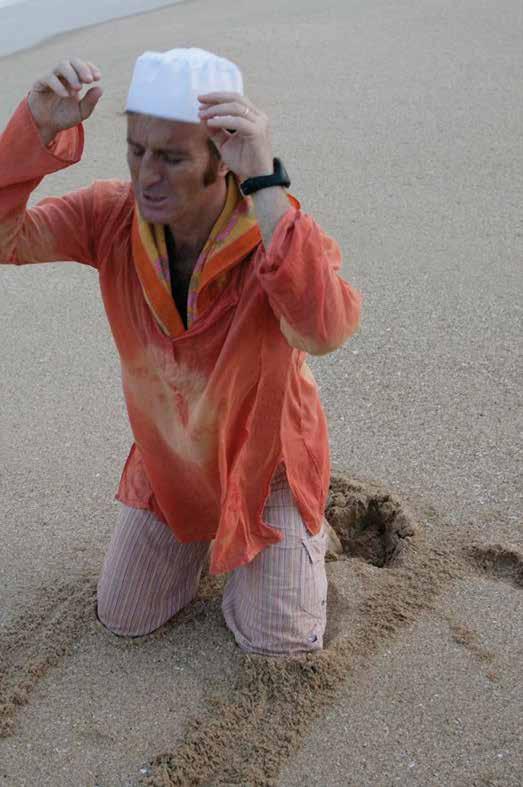
the sleep of the just, missed by wheels just by a hair. Endless store market on endless road on endless trip back. ORANGE, MY ORANGE, worn by the monks. I like them almost as much as that color. CHILD ON THE HANDLEBAR, she on the top tube, he on the pedals: holy family, ciao!
ONE YEAR AGO, 365 DAYS AGO, ON THE NUBA MOUNTAINS. It’s a strange feeling, it is. Argentinian déjà vu: at the end of the last scene it starts to rain. It is an Indian rain, it pursues us and we, like cowardly cowboys, flee as fast as we can.
I WRITE AND THE
AND
make me old and trembling, I write by the light of high-beams, shall I be able to translate myself later on?
As soon as I get a moment’s respite, I start to write words in my mind and thoughts in my little notebook. The wheel of inspiration starts to move of its own. It turns and I turn along with it. What often happens when I am far away, in some forsaken corner of the world, today happens to me here, in Scampia.
like this is Italy or perhaps because Italy really is like this. We get in and out of our cars as we check out locations. Surveying locations is the part of work I like least. But this time there is little to get bored about.
Every step, every glance, every breath throughout the territory is noted.
I EXPERIENCED SOMETHING SIMILAR in San Sperato, in the obscene suburbs of Reggio Calabria, when I walked down the street alongside a courageous priest: the feeling that you are being followed through a rifle’s sight, which perhaps isn’t a metaphor at all, as you proceed down streets without sidewalks or pity, amidst properties that are entirely surrounded by walls, protected by closed-circuit tv cameras, rabid dogs, and unspeakable complicity. There, where even in taxi cabs it is wiser not to speak, there, where even the church’s stained glass windows are decorated with bullet holes, there I have felt endangered as never before in my life. A life that has known the most ill-reputed favelas, the most dangerous barrios, and the most infamous slums.
OF
brings me back to earth and I ask myself, smiling and tickling my companions as well, what one might feel being engaged to a “separatist”, the clan that apparently won the fratricidal war that blew many a local brain to bits and covered the sidewalks with blood.
IT’S THE HOUR IN WHICH KIDS GET OUT OF SCHOOL, I would like to stop to speak to them, to ask them about their dreams and nightmares, just as I had among the Yanomami Indians.
THE PRIESTS, THOUGH THEY HAVE BEEN LIVING HERE FOR A LONG TIME AND ALMOST ALL COME FROM NEIGHBORING PARTS OF TOWN, ARE WORRIED. More worried than father Carlo was while he was leading me along amidst snakes, malaria-carrying mosquitoes, and warrior tribes.
BUT HERE, IN THE “SCAMPIA RESERVATION”, COMMUNICATING AND MOVING AROUND CAN BE MORE DIFFICULT THAN IN THE FORESTS OF THE AMAZON.
OF COURSE, PEOPLE HERE HAVE A QUICK WAY OF TALKING BACK AND A WAY OF DOING THINGS THAT MAKES YOU FEEL AT HOME. But it is a home where you must always ask what you can and cannot do. On the other hand, it’s what happens to everyone who lives here. They tell me that, in some parts of the neighborhood, people have to ask whatever watchman is on duty for permission to enter the building where they live. Others have had it worse: one day they were told that they had to move out because they needed the apartment. Or, rather, They needed it. Just like that, from one day to the next.
FIREWORKS IN THE SKY ANNOUNCE THE ARRIVAL OF DRUGS, the police sporadically patrol the streets under army escort, at the sides of the roundabouts is the cut-rate market for African laborers and smuggled cigarettes; at 3 pm - on the dot like death itself - the queues of pushers and junkies form in the basements of the famous “Vele,” the huge
OF
TODAY AND TOMORROW NEVER SEEM VERY DIFFERENT FROM ONE ANOTHER IN THIS
sail-shaped tenements; every holy day, darkness sets in to conceal who knows what damned horrors. Shops are rare, there are no movie theaters, no cafes or restaurants.
AND YET EVEN HERE, in the very middle of hatred’s dominion, I cannot help noticing that the walls are crowded with messages, passionate promises and declarations, that pass in front me like the pages of endless love letters.
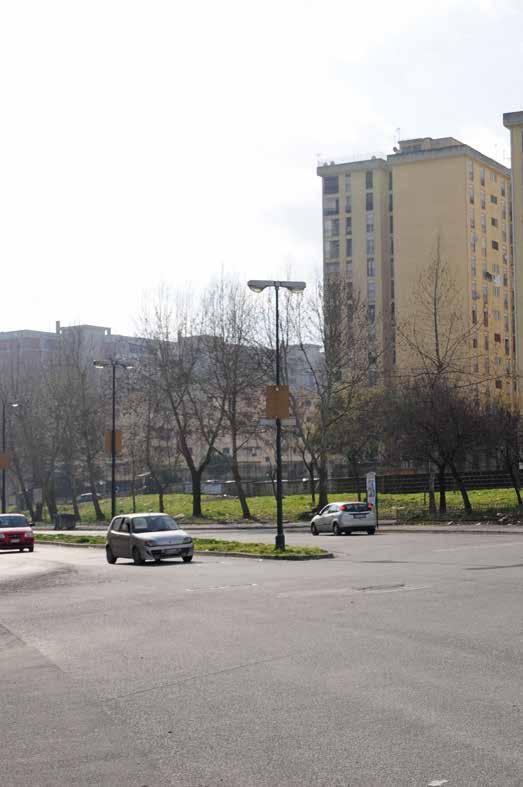
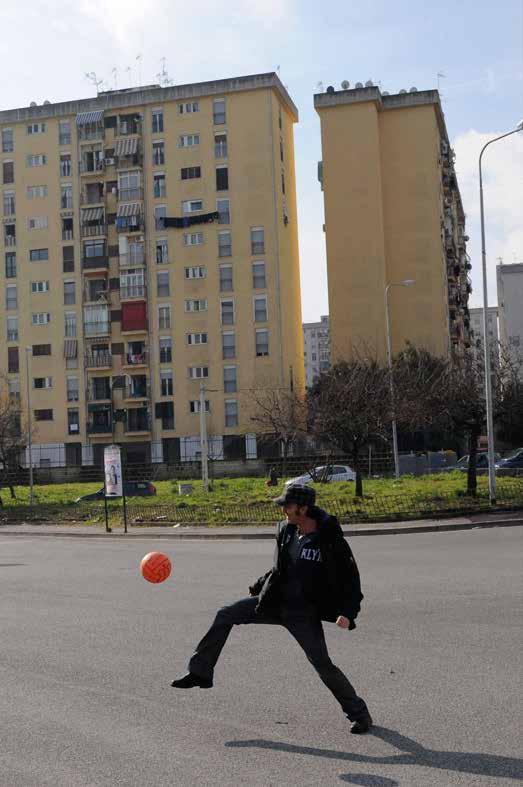
near the train station, so every morning we have to make a great crossing in order to reach Scampia. I tune the radio to the stations that broadcast Neapolitan songs, take off my hat to greet Mr Vesuvius, and then the trip begins.
HERE IS
BANGKOK, with its little bird cages, Naples Melito, which shamelessly shows the derelict body of what once was the Cinema Gloria. Look at Naples Ouagadogou, with its red dust. And Naples Marianella, with its finks dissolved in acid.
DOWN THERE IS NAPLES NEW DELHI, with the houses built under the beltway, Naples Secondigliano with its insanity-inducing prison, Naples Caracas with men loitering in front of bars without anything to do or say even under torture, then comes Naples Buenos Aires, with the portrait of Diego Armando Maradona next to that of a Madonna with her eyes turned towards the sky perhaps so as not to meet those of the ugly politicians on the campaign posters for the upcoming elections.
AT FIRST I MOVE AS IN A BOUTIQUE FULL OF CRYSTAL OBJECTS, then, little by little, we set off and I start telling by means of images, not only the shadows, but also the lights that I have seen and want to show.
NOW IT IS EASY TO TALK TO THE KIDS, THEY TELL ME THE WORST THING IS NOT LIFE IN THE NEIGHBORHOOD, but what awaits them as soon as they set foot outside it. «When they hear that you are from Scampia, they look at you as if you had the plague», «we’ve been fire branded», they tell me with a smile that at times turns into an expression of anger and at times melts into tears. They all seem older than their age and a twelve-year-old girl talks to me as if she were twenty.
ELECTIONS THAT EVERYBODY HERE ALREADY KNOWS THE RESULT OF. EVEN WITHOUT CONSULTING CHANTAL THE FORTUNETELLER WHO IS SPONSORING THE NEXT SERIES OF SONGS THAT I WON’T BE ABLE TO LISTEN TO BECAUSE WE HAVE ARRIVED AT OUR DESTINATION AND I MUST BEGIN TO FILM.
They don’t want to appear like heroes and are worried about breaking the delicate balance they have managed to create over the years. They tell of their many defeats and few successes. In the seventies, there really was hope that something might change, the eldest one tells me. Then the earthquake happened and the war between clans to control the treasure that had been allocated for the reconstruction blocked all growth. Now it’s hard, and getting harder and harder. But, in the meantime, they are there, day in and day out. Of the State, instead, there isn’t even a hint.
IT’S NOT TRUE THAT THE POLITICIANS ALLOWED THIS TO BECOME A NO MAN’S LAND, THEY ALLOWED IT TO BECOME SOMEBODY’S LAND. Somebody who rules like a king, between murders and parties, between initiation rites and threats, between shootouts and Jacuzzis. Later, after I’ve finished the last shot of the day, I step out of the church and, suddenly but without becoming immediately aware of it, the feelings of oppression and anger that have been with me all these days leave room to other feelings.
Three girls on a scooter, wrapped in their tight-fitting jeans and silvery buckled belts, pass in front of me while sending sms, an old man tries to sell police badges to passer-bys, and I start to kid around with three street kids about the Napoli and Roma teams. It may be because don Salvatore said that one can feel the Gospel in my work; it may be the ancient laments that are coming out of loudspeakers in the form of song; it may be the clouds filled with light, it may be the air that smells not of death but of innocent springtime.
IT’S TRUE, I’M CROSSING THE ITALIAN PUBLIC SQUARE THAT HAS WITNESSED THE GREATEST NUMBER OF MURDERS, AND YET I FEEL LIGHTHEARTED.
IT MAY BE, IT MAY BE, BUT IN THIS PRECISE MOMENT I FEEL FINE.
At times it’s been a book to take me where I am at times a newspaper cutting or a film. I don’t want to spoil the surprise by looking at pictures or watching videos. At times when I get there the guide and the map are left in my bedroom. On a piece of scrap paper I write down how to say good morning and thank you. I choose a direction and leave. Here I am walking on the streets and roads of Yangon or as the Brits renamed it Rangoon. Right in front of a temple a child is feeding pigeons some corn. I take a backlit picture of them, arms and wings spreading out. A monk in his red attire enters the frame. Their attire and skin colour are darker here than anywhere else in Asia. Miniature tables, stools teapots and glasses await customers for massive chats. Evening has fallen and like magic work has finished tea salons appear at every corner. They’ll be full in a matter of minutes. It’s just like Hanoi, actually more. From the small park from where the colonial neighbourhood begins or better what is left of it, lovers hide behind the bushes taking selfies. A selfie is almost like a religion. A collective habit, almost an instinct a social
obligation. That same obligation that pushes you to hold your hands as a sign of respect while quickly walking past a stupa, or an image of a Buddha or a holy tree. I am much more curious than them. There are no tourists around me, apparently not many pass by here. I cross uncommon interesting glances and a few conspiratorial looks. You can feel it that these people have been scarred by years of fear. The women wear yellow powder on their cheeks, very similar to the one used by girls in Madagascar. I like to picture the path of this idea of make up, the lands it has crossed, faces that change but all connected by the same look.
YANGON WITHOUT
At sunset I had a date with the sun, but I hadn’t foreseen traffic jams into consideration. The light now seems much more beautiful. I only realize this later when looking through the pictures I’d taken. The sky seems to enhance the immeasurable gleam of the stupa. It is 98 metres high. It patiently observes and listens to that humanity that for 2.500 years has been bowing down. You walk around it, on the sides to the back of it other temples and the statues of Siddharta Gothama. I sit in a corner
quietly trying to regroup. I’ve been up since 6.00am and have taken two flights. Mingulabà! Mingulabà! I take my piece of paper from my pocket, I have to learn how to answer back to their greetings. That evening I send Margherita a message: “I feel like writing. I must have been moved by something.”
When sat at a single table I try a Birmanian starter and main course. Gianna Nannini’s song “Bello e impossibile” comes to mind.
To be digested. Now that I think about it, no tuc tuc or rikshaws or anything like it. –I don’t quite get it. Chinese people are the ones I feel less connected to, though the Chinatowns found in different cities are my favourite place to seek shelter. This is just like Bangkok, I like getting lost and then finding my way out. Most men wear sarongs. I walk across little alleys, little stores managed by Indians and Barber shops by Bangladeshi. Fishing nets and hammocks. No good-luck charms on the dashboards. They’d be disowned by their Thai colleagues from Bangkok.
I must do the same when I go back to Rome, though I already know I won’t.
I cross labourers entering a construction site who enter the surface of the city like lunar craters. From my hotel window they looked like aliens, I can now see their sleepy faces holding their helmets, they are human beings and not aliens. How long are their shifts? A poem by Brecht comes to mind: “Who built Thebes of the seven gates? In the books you will find the name of kings”. A lot will have changed in ten years’ time. High ranked businessmen fly over Yangon, ready to nosedive.
As far as changes are concerned, at the market they sell bags with Aung San Suu Kyi’s face on them. Only a few months ago the seller would have risked capital punishment. The course should start in a few days. Her face looks tired. I’ve no idea how many years she’s been locked up. She looks like a songbird that has lost its colour. Not her strength I hope. Backlit, along the artificial lake I can see puppet like shadows against a white blanket as if on a theatre stage but they are shaky city athletes.
“Our good actions, says Dhammapada, will embrace us in this life and the ones after this one, just like relative and friends welcome a dear friend after a long trip” the title is: The way things are. Written by Hervé Clerc. It claims that every religion has a common vision. If our actions are good, then it’ll be impossible to encounter a bad destiny. The book talks about Buddhism in a clear and easy way. I believe I’ve raised my children with it, and I hope I’ve also been capable of following that criteria. I’ve just finished writing that sentence, as I am taking my reading glasses off a girl gives me a beautiful smile which fills me with trust. She might have understood I am a collector. Three hours late. I read and time goes by. The same girl asks me if I am traveling on my own. She’s on her way back home after she’s been gone for two years. She works in Dubai. She tells me: “Good for money, but not for people”. We become friends. Is that how you say it? She helps me understand what is going on with my flight. Can’t really travel as a tourist, I’m not too good at it and I have to admit that I am a glorious snob. All I need is to hear a couple of words spoken in Italian and an arranged group trip and my fantasy vanishes. I stop writing.
A dim light on a reflecting pool. We cross the famous fishermen, one on each canoe. At the stern standing, hands holding the nets that go deep, the oar held with the right leg thus used as the boat’s wheel. I take a picture of the fisherman he is going to be Mattia’s guest tonight in Brooklyn. The wind is almost cold. My driver is a nice guy and with the help of gestures I explained I wanted to be taken where other people don’t go. We enter a canal and we encounter real life. I’m good. When you travel on your own you are never left alone it is always two of you. It is you and the other part of you. Very few moments of quiet. It’s as if you are travelling with a verbose friend who believes he knows a lot about you. The moments I spend with I and me and we are the same thing those are the best moments ever. This is one of those. I like the wind, the water flowing right next to me. I like to let things happen. On a small bridge a group of youngsters tell us to slow down, the driver looks at me and I nod. We let a Volleyball team through. Some with a Neymar hair do, others are wearing farmer hey hats. They are all heading to the end of the canal where we are heading to. It is Saturday afternoon there’s a tournament at the village. With a much wider number of people than commonly seen at our Italian stadiums, group picture and good luck. I stop shortly to watch the match but then head towards a temple
reached on foot through a market covered by columns. I find a Buddha painted on a window “Very old!” which I’ll share my bedroom with in Rome. When I reach the top of the stupa it is late, enough time for some thinking and I am already quickly heading back. Later on I speak to Margherita, who is rehearsing independence by staying home on her own. It is nice to hear her voice then I speak to her mother. Dinner is rather sad (location and menu), I go to bed very early, with my book and two blankets. My little teak house where I am staying is freezing.
It is difficult to communicate but they try. Actually, we try. I use markets as a thermometer to understand where I am stepping on but also who is stepping on it. Goods on the stalls tell me there is still lots to discover. I hardly ever trade but I am forced to. Starting prices are ridiculous, I have to get involved and dance on. I am a fast learner. I get the hang of these steps. I spend hours dealing for Buddha statues, charms against evil spirits and necklaces. I throw myself in the market, their market. Seeds, chilli, ginger (I buy a little bag and take a picture of the sales person to send to Chicco) tools, fish, vegetables and flowers. Many of these products on sale grow on floating vegetable gardens
that make this lake a special place. I take pictures following the light that cuts the frame in half. A young monk, with his hands on his head and an old lady with a cheeky face smoking a cigar. The smoke fades, hints of happiness. I lay all of my conquests on the bed, can’t complain. A bronze statue with the three wise monkeys for Chicco (see no evil, hear no evil, speak no evil). For Mat a tiger tooth necklace to be added to his collection. A jacket for Margherita, no neck with buttons down the front perfect to suit a resting Akido warrior. Silver necklaces and bracelets custom made in a stilt house lab.
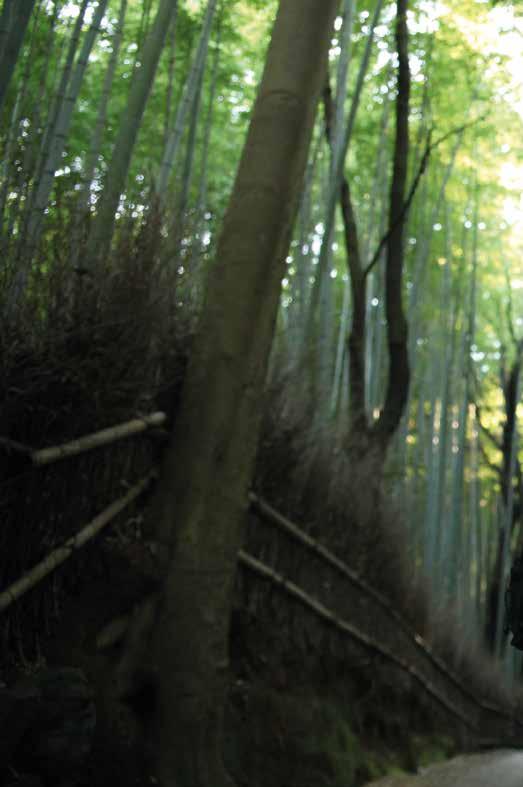
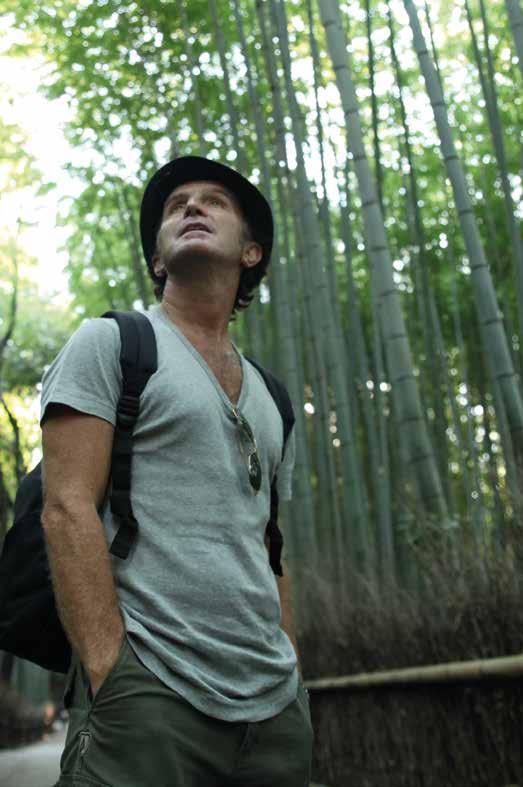
but as soon as I step into my bedroom the sunset light hits me and pushes me back out. I decide to go up the long set of stairs that lead to a stupa, the evening light lights it up and makes it shine. I get to the top and there’s nobody there. I take my shoes off and force myself not to take any pictures but to enjoy the silence and that slice of light coming from the door. Be careful! Be careful! Stefano Maria king of the volatiles, Emperor of the unplanned officially declares a new era. The meditation era. You understood correctly. Yes me, that person who cannot do the same thing more than three times in a row. Me, yes who can’t hold my thoughts down even when I’m asleep, me here in an unknown temple on the Inle lake has sat down legs crossed in front of a picture of what seems to have been Prince Siddharta. I started off shyly, humble and embarrassed and I started breathing, following my breath trying to remember those few rules I’d tried to learn. The self taught prophet who leans down to the Buddha’s 84,000 rules.
on those white flowers at the bottom of the statue. They slightly moved and I thought about one of Fausto’s works, an artist friend of mine who exhibited surreal works on the street. It was called God breathes, and it was nothing else but a leaf shaken by the wind. That’s it, the thought had already gone elsewhere, first mistake. I tried again and focused on an orange candle. I shut my eyes and looked for his. I tried not to fight my thoughts off but to let them go, I tried to straighten my back and keep it so. I tried not to look for the words inside of me to describe how I felt. I don’t know how long I was there for but I’ll use a sentence I’ve already used a couple of pages back I had no one who tickled my fancy. In other words, I liked it. I could swear something happened, it released something. Heavenly reward, encouraging award by the golden temple of transparent waters for the worst meditator in the history of humanity?
(by the way how nice is it to bow down and we hardly ever do) I meet a monk’s glance. He greets me and asks me where I am from. Might have been because of my time spent there, I sat in front of him and started chatting, simple concise sentences. He’s the only monk there who has been living there for
thirteen years. There’s a huge snake that keeps him company. He wants to know things about me, he asks and I tell him. I tell him I’m always travelling and that I’d like to learn to meditate. I ask him for a blessing. He puts his hand on my head and unknown words flow over me. He then gets up tells me to wait. He takes a white string kneels down while holding it. He then faces the Buddha and begins a long sutra. At last he ties the string around my neck while I’m rewriting these notes months later his gift is still here with me, or on me. He wants a picture of the two of us together. There’s not much light so I suggest we use the candle light. When he sees the result he smiles like a child. We say good bye. It is dark by now two old women close the gate. I go down the stairs feeling light.
Having gone up the current we turned the engine off, sliding down the sunset trail. Blackbirds like aircrafts fighters fly over us. Tomorrow morning at sunset I will enjoy the same view from a hot air balloon. The boy driving the boat brushes his teeth by dipping his tooth brush in the green water he then dives backwards and washes thoroughly. It is Saturday he needs to smarten up he then explains. The tips of the pagodas like the peaks of the Dolomites turn red. I am in Began in the famous Birmanian plane with 13.000 temples. These ancient wooden monasteries that I found here have reached a special place in my travel parade. They are the answer to a renowned question asked by any famous traveller: “What am I doing here?”.
«NAMASTE», JOINING HANDS AS IF IN PRAYER. «Namaste», greeting with a brilliant meaning. «Namaste», I salute the God that is in you. Thus I answer in turn «Namaste, namaste, namaste», so that the eyes of the heart cradled by that lullaby actually see it, actually feel it, the divine that is hidden in the human beings who are before me.
SUBURBS OF KATMANDU, we climb amid houses made out of smoked wood with windows produced by artists and roofs begotten by nutters. We clamber up the steep rise and at every turn my eyes tumble down a steep ravine. A ravine which someone with a van in every way identical to our own has fallen into. The last thing he must have seen were those farmers harvesting hay down there, on the banks of the river.
LIGHT
that light up rooms with mysterious colors. Like the insects that calmly stroll up and down my legs. On the walls, hammers and sickles and Maoist slogans, on the street ant-women proceed in single file with the world on their head, while cicada-men seated on the steps play cards.
«IN NEPAL, OUT OF TWENTY-EIGHT MILLION INHABITANTS, THE CATHOLICS
ZERO POINT…» and then a laugh. Father Pius will put us up for the night and meanwhile tells us stories. Also at table with us are the nuns who give hospitality, not only for one night, to girls and young children with AIDS. They come here from the brothels of Bombay and will stay until the disease doesn’t force them to move to heaven.
TODAY IS PRECISELY 1 DECEMBER, World AIDS Day.
First, two hours of insane traffic. Stench of cars and motorcycles, all of the most polluting sort. Behind the opaque screens that are the windows of the least taxicab-like taxicab in the world, we proceed at a snail’s pace. Or at that of a very old and limping man. We scan the inside of hive-like little shops, micro-stores replete with colored boxes and the portraits of divinities.
ON TOP, AMONG THE DIVINITIES, STRAY CHILDREN WITH EYES LIKE THE CRYSTALS of Annapurna. In their hands, bottles of glue to sniff at, a symbol of their difference and, at the same time, of their similarity to street kids the world over. Fabric, statuettes, fossils, students demonstrating for the environment, Maoist hymns, orange flowers dedicated to divinities with my same taste in colors, and, on the ground, fruit, straw, and spit.
WE GET OFF, DURBAN SQUARE IS A SLICE OF LIFE WHICH, DESPITE ITS APPEARANCE, DESERVES TO BE EATEN. THE TEMPLES, WITH THEIR FOUNDATIONS SUNK IN GARBAGE, RISE TOWARDS THE SKY.
its eyes lowered upon its dealings, its thoughts, and its prayers. The Himalayas do the bidding farewell. MUSTANG. It is dawn. The gigantic mountains graze the sun and our midget plane grazes the mountains. We land.
EACH STEP WEIGHS AS THREE but there are the mountain scent and childhood memories to keep me going. We stop at the shelter where we will spend the night and plan our next steps. A table in the middle, a wonderful kitchen, and a picture, framed with a broken glass, of the two Messner brothers. They passed through here with an obsession in their heads. One came back and became famous, the other stayed up here, forever. With that obsession to keep him company.
OUR GUIDE IS SWEET AND INTELLIGENT, HIS NAME IS TENSING.
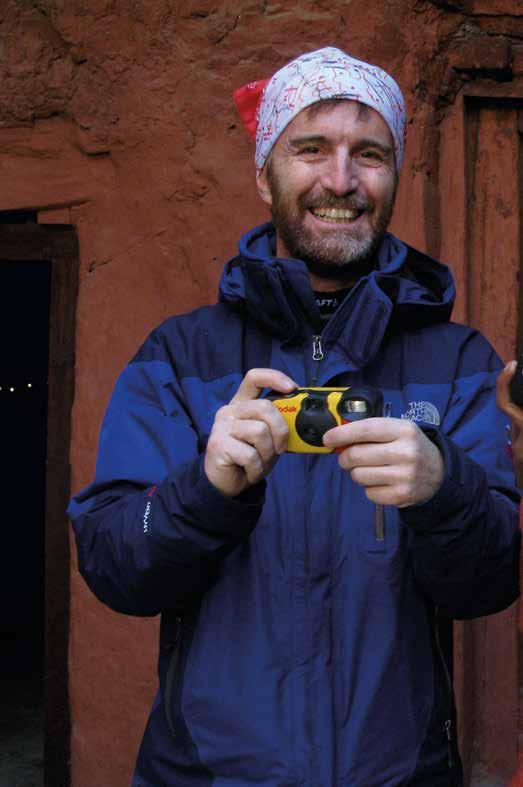
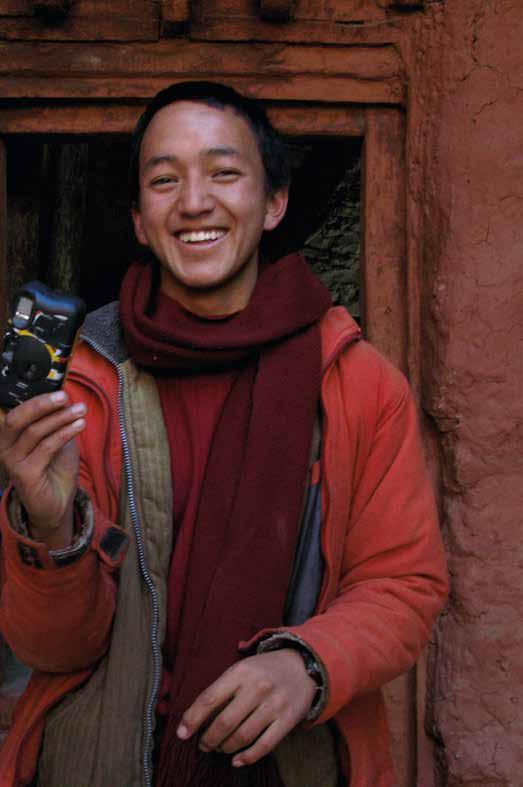
A
Eyes that watch the wind sweep clouds of dust and sheep into the valley and clouds of light and colors into the sky. Nepalese shepherds descend to the valley with their animals, they have the future written on their faces: a four days’ journey to reach the first big marketplace.
WINTER IS ARRIVING
TRACK and all who can, leave the highest villages. Only the poorest and the oldest will remain to converse with the wind and fall asleep in the frost’s embrace.
with my gaze torn between the abyss that lies beneath me and the immensity that unveils itself before me.
Kagbeni, first village, 10,500 feet, mint tea, monastery, children play without toys, angry old women speak without teeth, the wind comes from the north, the apples from the trees. Towards Muktinat, 12,200 feet, each bend brings a new vision. Colors: brown the valley, white the mountains, red the Maoist flag, purple the peaks at sunset.
A technicolor Buddha greets us at the shelter, a dog barks in the night, another dog barks inside Cristian’s head. Two aspirins will silence it. A day precious as gold, a diamond day, like one-hundred days and like an instant.
I WOULD LIKE TO BEQUEATH IT TO MY CHILDREN, along with twenty-four hours on the Nuba Mountains, a dawn awaited under a rain tree in Papua New Guinea, an afternoon amid the waves of Sri Lanka with the children stronger than the tsunami, a magical and sleepless night on a yanomami hammock. I wish I could say: «Someday, all of this will be yours».
THE VALLEY IS GREEN with grass and excellent vegetables and flowers. Flowers whose fragrance I can smell only in the tea that I sip and sip and sip to triumph over an invincible altitude.
TENSING TELLS OF HIS LIFE in London, of the disease that struck him, of its diagnosis: loneliness, and of the cure prescribed to him by an old healer: to return amid these mountains.
and then we’re forthwith on the road again, where sheep are weighed and the quality of rams is carefully considered. The Tibetan horses await us. The saddles are softened by blankets, they have strips of colored fabric along the reins, small and strong, they dragged or perhaps allowed themselves to be dragged by Genghis Kahn on his galloping conquest. In brief, we go on and on, crossing flocks and rivers, following trails and mountain passes.
and close in over our heads like fireworks. A slow-treading, tired mother of a bitch advances in the yellow light of three o’clock in the afternoon, amid thin and bare apricot-colored puppies.
IN THE VILLAGES,
CALL FACES eyes mouths to the doors. The schools are all dribble-nosed and curious and poor but they all have a small soccer field. Therefore, I can claim in full cognition of the facts that had I been born here I would have grown up happily. After the laughs of the children and the whinnying of horses, the silence of a Buddhist monastery. There are ten young monks who study here. Prayers inscribed on stones and written on flags greet us.
WE ENTER, OFF WITH OUR SHOES AND HATS. HERE EVERYTHING IS PEACE.
Yellow inside walls, wood stairs, red outside walls, white doves. They study ten hours a day and each one of them must also attend to life’s practical necessities as well as to those of the spirit. We drink tea together, light streams in from cracks and from the high-up or very low windows.
Then they become once again what they are, children, and they climb on the roof to bid us farewell. The sacred mountains behind them smile.
THE SCENE OPENS LIKE THIS: A PLASTIC BAG STUFFED WITH LIQUID SHIT FLIES FROM THE HIGH FLOORS AND LANDS LIKE A GRENADE IN THE MIDDLE OF SAN IGNACIO STREET. There are no dead or wounded, I note like a consummate reporter, as I quickly pass by.
Young, on the threshold of the half-closed doors of buildings, they talk. And kiss each other.
IN A SQUARE, MOTHERS AND SISTERS WAIT SITTING ON THE GROUND FOR THEIR DAUGHTERS AND SISTERS TO COME OUT OF DANCE SCHOOL.
The boys play marbles and baseball with sticks and bottle caps.
THE SETTING AND THE ACTORS ENTER THE SCENE.
Often, I am the only spectator.
THE BEAUTY OF THE MEN OFTEN SURPASSES THAT OF THE WOMEN.
I PASS UNOBSERVED.
There is not the cheer or the danger of Africa, there is not the curiosity or the respect of the East. So I go and go.
THEN IN THE EVENING, WITH ONLY MY THAI PANTS ON, I SIT ON THE SMALL TERRACE AND LOOK AT THE SKY.
I BOUGHT TWENTY-PESOS WORTH OF WHITE DAFFODILS AND CHATTED WITH AN OLD MANGO PEDDLER.
MY HOUSE IS CLOSE TO THE CHURCH OF THE MERCEDE AND TO A BOXING GYM. A block further south, there is a prospect of the sea. It seems perfect.
HEYLA KNEW TIZIANO FERRO, SO WE SANG LOVE IS A SIMPLE THING. And this, too, seemed perfect to me.
AT THE COST OF APPEARING UNFAIR OR BLASPHEMOUS, THE RESTORATION WORK OF THE FOUR CENTRAL SQUARES, PRAISED BY MANY, FAILS TO ATTRACT ME MORE THAT THE STREETS FULL OF POTHOLES AND THE CRUMBLING BUILDINGS.
WITH THE BICYCLE CAB DRIVERS, WE GET LOST IN TALK THAT STARTS ALWAYS FROM THE SAME POINT AND ENDS GOD KNOWS WHERE.
THE HANDS ON THE ASSES OF THE NOVIE. And when they dance, the women are females to the nth power.
He has lived one or two lives more than Che and Camillo. But he’ll die, they won’t.
A GANG OF SKINNY AND WILD KIDS PLAYS IN PLAZA DE CHRISTO.
One picks up a dog that is all skin and bones and makes him whirl. After the ride on the merry-go-round, the perro gets back to trotting among the group as if nothing had happened.
THE DUENO DE MI CASA, IN THE MORNING TENDS TO THE LITTLE ALTARS OF SAN LAZARO AND YEMANJA.
THE CON MEN ARE REAL ACES: THEY REMINDED ME OF THOSE WHO WAITED FOR THEIR TURN IN THE WAITING ROOM OF THE OFFICE OF MY GRANDFATHER, THE LAWYER.
No matter how careful and street smart you may be, you’ll get screwed anyway. The fascinating thing is that you don’t realize it right away, but later. Maybe when you’re in bed, at night, and you go over the day that has just gone by.
IN BIKE TAXI. He sounds his horn at all the women, blows kisses right and left, courts the old ladies and infuriates the young ones.
THE SLOWNESS OF THE AGED. WHITE SKIN AND HAIR, THEY TRADE A MANGO FOR THREE EGGS. The last witnesses of heroic times past. First witnesses of the times that are now present.
THE MALECON. Today, at sunset, I was there. The wind was blowing, after a torrid day. I understood why the habaneri pass their evenings here. A bottle of rum for 4 pesos, a bunch of grapes, and a guitar.
From the window, little to declare.
IN THE EVENING, CIENFUEGOS SEEMS EMPTY COMPARED TO HAVANA.
The few times that I read a guidebook and follow its directions, I almost always regret it. Then, however, I reach the House of Culture, where a group of kids are taking dancing lessons. They alternate pieces by the famous Benny Moré and of American Hip Pop. So much for the “embargoes” of the whole world. Then I immediately feel well and am happy to be here. I lose my way in the secondary streets amid graffiti that sing the praises of Che and of my beloved Camilo Cienfuegos. In a small bookshop, I buy two prints of my heroes and an old coin from the time of the revolution.
AT NIGHT, THEY INVITE ME TO A SORT OF DISCOTHEQUE.
Many Cubans with novias and a bit of money in their pocket. I’m tired, I go to bed.
He explains to me why he has an Arab name, tells me about his studying in Kazakhstan in the days of the Soviet Union. We become friends and I shoot a video of him singing as he drives across the Cuban countryside. We stop at the botanical gardens with the greatest variety of palm trees in the world. I get lost, I swear. When Housain sees me come back sweaty and with my shoes covered in mud, he cracks up. Again on the road, the Sierra is on the horizon. A curandera gives me a hot potion made out of a strange tuber to drink. I’ll let you know if it calms my diarrhea a bit.
I
I follow it and reach a courtyard where the foremost Cuban punk bands perform God-forsaken sounds and lyrics. It’s unbelievable. Four blocks away from here, at the house of music, tourists try to dance to Cuban rhythms. The women expect to do it without declaring war with ass and cunt. The men on tiptoes seem like so many fags laid to brown on blazing coals.
“LE CHICAS CUBANA SON TODAS PUTA”, IT’S THE BLOOD’S FAULT, NOT THEIRS. So proclaims Vincente, the nth taxi conducador of my trip. Between one pedal-stroke and the next, I am made privy to the fact that, in order to have many women in Cuba, you must own a car.
I STARTED TO CRY. IN THE SMALL MUSEUM CONSECRATED TO THE REVOLUTION. I WAS ALONE. AND THAT’S THE ONLY WAY I REALLY ENJOY A MUSEUM, OR A CHURCH. IN FRONT OF THE MILITARY SHIRT OF CAMILLO, “L’HOMBRE DE L’AVANGUARDIA”, IN FRONT OF THE BLACK-AND-WHITE PRINTS WITH THE CHEERFUL CHARGES OF THE STUDENTS WHO REBELLED AGAINST BATTISTA AND THE PORTRAITS OF THE UNKNOWN CAMPESINOS WHO WERE TORTURED AND KILLED, I WAS MOVED.
OWNER SHOWS UP IN HIS JALOPY.
The old man talks like a printed book in defense of Fidel and the Revolution. The following day, I share a bus seat with a fat guy who says that everything is a “fracasso” and the values of the Revolution “una mierda”.
Towards the port. There is a smell of baked bread every four or five blocks. A young woman sews a shocking-pink dress. Two more tend to long, colored nails. It’s carnival time. The god of solitary wanderers guides me toward a closed-off street where a barrio is preparing for tomorrow’s parade. I play the spectator, shoot some footage, make friends. I stay for more than an hour and feel good.
TODAY, I SLEPT AFTER LUNCH, FOR TWO HOURS. Marvelous!
THE CINE CUBA SIGN GOES ON AND OFF. That’s where I would like to screen my film.
He spends his life amid old books about Che and pictures of Mastroianni. I don’t remember his name, but I spent a whole afternoon listening to him talk about Fellini and Pasolini, about De Sica and Anna Magnani. He explained to me that during the first years of the revolution, the person in charge of culture imported to Cuba films from Italy and France, since American ones were prohibited. The people filled the theaters, tickets didn’t cost anything, Italian actors were heroes. And now, I ask him? Now Italian cinema isn’t worth much, he replies. And young people prefer DVDs with Hollywood movies. And the Cine Cuba is almost deserted.
FROM TIME TO TIME I COME OUT WITH THE QUESTION: “WHAT WILL HAPPEN TO CUBA?”, A PLAYER OF A STRINGLESS GUITAR ANSWERS
ME: “YOU’D NEED A CRYSTAL BALL TO TELL.”
Others tell me that, in Miami, everything is already set. And when Fidel dies, they’re ready to finish the job in three days.
Whenever something doesn’t work, that’s the exclamation.
IN SANTIAGO, STORM SANDY’S TRAIL OF IS VISIBLE EVERYWHERE.
It was famous for its centuries-old trees, they’ve been swept away.
I OPEN THE WINDOW AND LET THE SOUNDS OF THE CASA DE LA TROVA KEEP ME COMPANY.
TIVOLI IS THE BARRIO THAT I LOVE. IN THE EVENING.
The rising and falling of the calles. The whistle of the bread-peddler with his little cart. The old people who act like old people. The wooden houses and those with columns compete over which one will be the last to fall. And the children compete over who’s the fastest. Music. The whole possible list. Including Eros Ramazzotti.
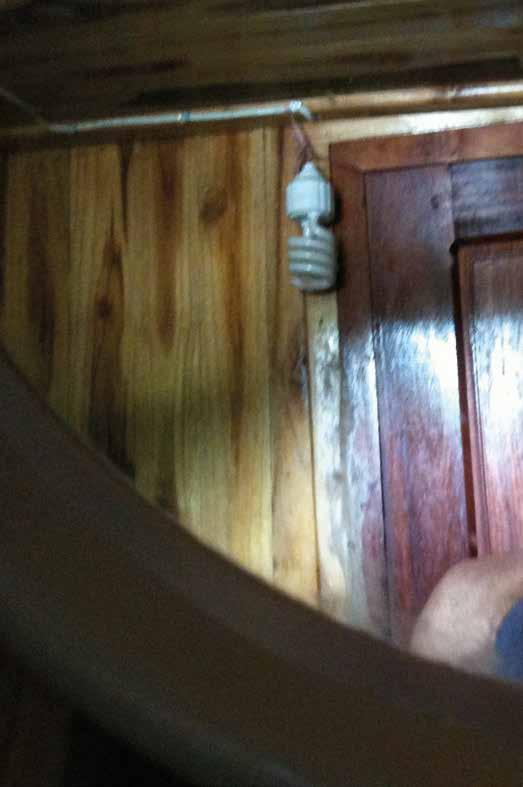

WITH HER HEAD RESTING ON THE PEW.
Outside it’s 102 degrees in the shade. She came in to look for God and cool air. I hope she has found both.
IN SIBONEY AT THE PLAJA OF THE CUBANS. A girl flirts with me. I behave like a shy, well-behaved boy.
IN THREE DAYS’ TIME, IT WILL BE THE 60TH ANNIVERSARYOF FIDEL AND HIS COMRADES’
FAILED ASSAULT AT THE MONCADA.
Only twelve of them managed to save themselves, all the others were executed by firing squad. But it was the spark, before the great fire. It is beautiful to read on tombstones, next to the names of heroes: poet, farmer, driver.
And young people have other things on their mind. I’m in their midst, during the carnival nights, while they dance and sing. And I too dance and sing. Not even the shadow of a tourist. I’m not surprised that I don’t run into the buzzards in search of little girls, those cowards would be afraid to come here. But how is it possible that you can’t see a single traveler, a young couple, a group of friends out to discover things? Where are they? Certainly not here, at dawn in the streets of Suegno.
I haven’t been here long enough. So sometimes I say no when I should have said yes, like to the crazy family that had invited me to dance the other night. I spent a little time with them but then went my way. And I was wrong. They wanted to take me to a very beautiful place that I only found out about the following nights.
CESPEDE GREET ME AND SMILE. WITH A LEG MISSING, TODAY ONE OF THEM SAID TO ME: “COMRADE,
BENEATH THE HOTEL, JINETEROS AND CON-MEN, TAXI DRIVERS AND MUSICIANS. They exchange wisecracks, questions, requests, suggestions, and laughs. I’ve found my own way of earning their respect: a mixture of disenchantment, steadfastness, and generosity. Just now that I’m about to leave...
LAST NIGHT, ON A CART PULLED BY A HORSE, TOWARDS THE PARTY.
While going uphill, the horse slipped. I saw the sparks of its hooves on the asphalt and then it fell to the ground. The cart started to slide backwards, we jumped off immediately.
I CANNOT FORGET YOU. YESTERDAY YOU SAVED MY LIFE.”
Sometimes, it’s he who is the villain, sometimes it’s she who is a whore.
BUS DRIVER:
“Cuban women are an enigma to Cubans as well. One day they say their favorite fruit is a mango and three days later a mango is not even to be mentioned.”
I LOOK AS IF I WERE DEAF, LISTEN AS IF I WERE BLIND. Along the alleys of the world and the earthen paths of my soul.
NIGHT IS THE BRAYING OF AN ANCIENT ASS, a remote sound that penetrates the future palaces of reinforced concrete and present-day glass windows of our hotel in order to reach my ears.
THEN I PULL BACK THE CURTAINS AND DELHI IS THERE.
Train sirens and falcon flights in a sky that is not a sky. I look at it from above as if I too were a falcon.
Old Delhi. Pigeons rise up into the air as in Paris, into the sky as in Venice, and land amid the garbage, cows, and beggars as only in Delhi they can.
IS IT HARDER TO LEARN THEIR LANGUAGE, URDU, OR THAT OF THE CAR HORNS THAT CONVERSE, JOKE, PRAY, AND CURSE WITHOUT PAUSE?
THERE, THE I FALCON SWEEPS INTO ACTION AND AIMS, AMID MILLIONS OF TARGETS, at a small table with eight pink pomegranates on it. Two have been opened and reveal the ruby red of their seeds. A bit further on, a miracle-white donkey has its mouth open and proudly brandishes its sunflower-yellow teeth.
BOYS PLAY CRICKET, CHILDREN TAP ON TAXI WINDOWS, dogs and old people sleep the restless and deep sleep of old people and dogs, lying on a strip of sidewalk, a frail and thin island between two rivers of cars, trucks, and bicycles.
AFTER THE MARKETPLACE AND THE STREETS, HUMAYUN’S TOMB IS AN OASIS. Immense is the heart of this mogul widow, capable of loving her dead Persian groom with a love that you can still feel today. Between the grates and the patterns on the pavements, in the green of the gardens and the song of the parrots.
I know, days that are all alike and days that are still unique will pass like coats of paint over this moment, but this vision will remain, arrogant and indelible. My eyes have lifted towards the black silhouettes of black-feathered crows, towards a staircase of stones worn by the tears and heroic bones of beggars.
Between two wings of angels without wings and without much else as well. One step at a time, my pockets are emptied of paper money because at every step a human being pulls out of his dehumanized body the most beautiful smile or prayer that she or he has. He without eyes, she without arms, he without arms or legs, they microscopic midgets, he with a hunch that keeps him bent toward the ground, she paralyzed in such a way that her eyes are forever turned toward the sky.


THEN YOU STEP INSIDE AND FIND MEN ABSORBED IN PRAYER and you hope their silent voice reaches some welcoming place up there, that their murmured prayers for help will be fulfilled by some spendthrift god whose pockets are hole-ridden as well.
WOMEN, SEEM TO BE THERE IN ORDER TO REMIND YOU THAT THE SOUL IS THE ONLY TRUE AND INVINCIBLE
THAT’S WHAT I’D WRITTEN and that’s what I’ll copy down. No revisions.
TEL AVIV: night clubs, brunch, models, art galleries and soldiers who jog with their machine guns over their shoulders. I don’t know what awaits me.
I STARE AT JERUSALEM FROM THE EXACT SAME PLACE WHERE NAZARENE CURSED IT. Soon it’ll be all Jewish. While I am in Mary’s church dark and subterranean, I am moved. Deep. Stolen by long lines of pilgrims who take selfies instead of crossing themselves (in the whole dictionary the word I hate the most is: Lazio).
IN THE GAZA STRIP, THERE ARE TWO MILLION PRISONERS WHO LIVE IN THE OPEN AIR. They are allowed to fish two miles away from the coast in that same area meant for sewage download. After Operation Cast Lead, where Israelis turned Gaza into a rubble camp and forbid entrance of cement to help rebuild. For those human beings that live there, cold persistent winters pass just like their prison wardens.
THE OTHER WALL (THE
OF SHAME) WHICH IS TWICE AS LONG AND HIGHER THAN THE BERLIN WALL. ALONG THE STREET, STORIES OF THE SETTLERS WHO ARE KICKING A PALESTINIAN WOMAN TO MAKE HER ABORT.
It’s time for the desert. Huts and schools made of metal sheets, and those bulldozers with the Star of David ready to throw them down to the ground. Drones and spies. Inflamed wheels thrown down towards the Bedouin villages from the settlement camps.
this is the Bedouin village, huts made out of metal sheets thrown here and there, a swollen sheep corpse two children on the back of a donkey ride from far attracted by the smell of a school.
THEY ARE NOT NOMADS ANYMORE, WHO ARE LOOKING AFTER THEIR HERD.
The 2010 wall broke off a millennial path. Forced to immobility they live in small camps, like gypsy camps. The Comboni Missionary sisters have managed to create a kindergarten for them two microscopic containers, it tightens your stomach. They greet us with the “Palestine Palestine” song, the sisters laughingly translate the rest of the lyrics “the Jews are our dogs”. The truth says the complete opposite. They exist and resist, without water or electricity. With constant demolition threats. They
are accused of being there illegally after they’ve been kicked out from the hill they had lived in their entire life. “it had five springs” the boss tells me. “They destroyed our tents, they loaded us on a truck and unloaded us like garbage in the most arid and hostile part of the desert”.
I
THEY
as soon as they overcome their shyness they say my name “Stefno Stefno” and every time I show them their picture just taken on my camera they burst into the same surprise that same surprise I have already seen in different latitudes around the globe.
CHILDREN, THAT IS BOTH
AND GIRLS ALL HAVE THE SAME EYES: BLACK, CURIOUS AND WILD, this is the reason why when you conquer them it means double as much. We are in a territory that has been condemned by the Oslo agreement to be under Israeli military control. We are told by the leader who wears a keffiyeh on his head and has an Arafat look alike kind of face that the Bedouins had to pave the way at night. To them everything is forbidden, they are not
allowed to have electricity, build houses, even the small school has been destroyed twice. Having children is their only way to show resistance. Surrounded by dozens of settlements (illegal for real!), the poor Bedouin huts and the stables with their thin animals seem to have hours left to live.
But to them these are like a wonder box. They get here either on foot or two people per donkey back who’ve escaped a manger. At times having walked for hours, risking stones being thrown at them by Jewish settlers as well as insulted. I see them quickly descend like goats after the bell has rung. The sun pushes its way into this forgotten slip of the desert. The Palestinian hymn starts playing and we shoot a couple of scenes around the huts.
A child runs down holding his country’s flag, his dying country, in the background a settlement mockingly watches. This images freezes in my camera and in my memory.
We’ll be back soon.
I already knew this much before I left. What I did not know is that the settlements are proper cities. I believed they were a few houses lived by a dozen mystical and slightly crazy settlers. The desert all around it, a check point at the entrance and then these boulevards with palm trees, fake grass but real swimming pools! Fifteen thousand inhabitants who’ve arrived from Russia and Ethiopia, attracted by those almost gifted homes and by the security of a job. French or Americans are nowhere to be seen. They only manage the first part of the project. They arrive, start battling protected by the army with the legitimate land owners. They build the first fortress that will eventually become cities just like the one I have right in front of me.
Is there a big strategy that joins all of the points of this invasion? This destruction?
Other people’s history is deleted. They collect funds in Europe to reforest Judea, you then find out that these trees are planted to hide traces of Arab presence for good, so much as the origin of some typical dish has been doubted. The key word is; delete their history and glorify your own.
NO PEACE TREATY, THERE’S NO WAY OUT. Not just for the Palestinians but also for the Israelis. A heroic civilian society: lawyers and doctors who volunteer and are committed to defend their neighbour’s infringed rights. A lot of courage is required. It is often our children who pay for the consequences because they are considered as traitors or enemies of their native land.
IT’S WINTER AND THE DESERT IS SERIOUSLY DESERTED and you ask yourself why fight so furiously just to live in the middle of nothing.
WHEN THE SUN IS UP, we can see Tiberias I can’t but not think about the Messiah walking with his people. I don’t think the landscape has changed much.
on the streets, buses, hospitals, number plates and in their brains.
MARY AND JOSEPH ON THEIR DONKEY, standing in front of this wall that forbids them entering Bethlehem. Banksy’s dove and those writings in all those different angry languages of the world. We find a tower every three hundred metres. An amazing mural that tells the story of a slingshot and handcuffed women. I walk away by myself, last lights of the day I raise my eyes up to the sky where the word END does not appear.
crossing the street, are escorted by an armoured vehicle. I see them holding their machine guns and drive along a street that goes downhill. Sometimes
BETHLEHEM IS LIKE THE GHETTO IN WARSAW. IT’S THE SAME STORY OVER AND OVER, OUR PERPETRATORS CHANGE THEIR UNIFORM.
they even enter Zone A which is the centre of Bethlehem where they are not allowed in. They provoke. The answer to this is often made of stones. Thrown by thirteen-year old men, who in an hour get 250 bullets on their heads and knees and who will also acknowledge interrogation with beating, guns on the table as well as months of torture and preventive jail. Often with no trial.
in memory of all those keys that have been left in a hurry and still wait to return since 1948. Three thousand people packed into less than a square kilometer, and that wall built right there that separates them from their their past and their olive trees. Graffiti on the walls in memory of those martyrs and one martyr from Genoa. An Italian girl who is an exchange student and is studying anthropology and is writing her dissertation on Palestinian women and prison. In this tidy, rather modern apartment on the wall there is a poster of a heroine wearing a Keffiyeh (kufiya) and a machine gun. We climb on the roof we see the olive trees a few metres away in the background the settlers. A little boy waves the victory sign at me from a terrace not far.
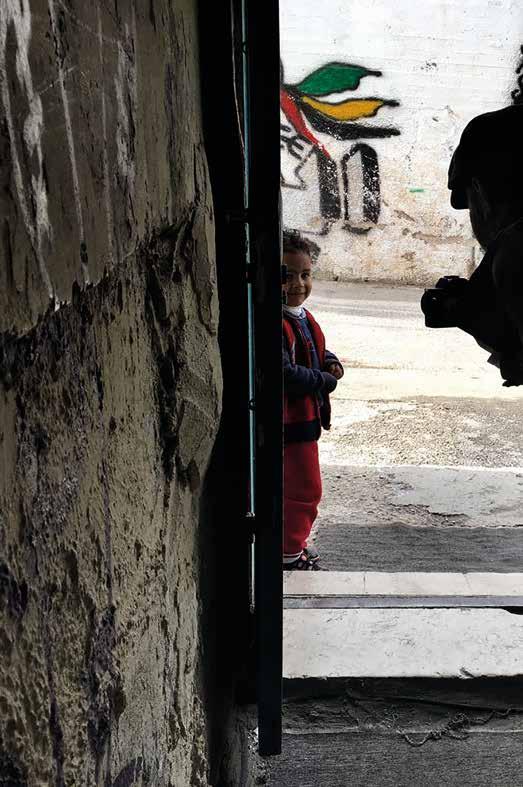
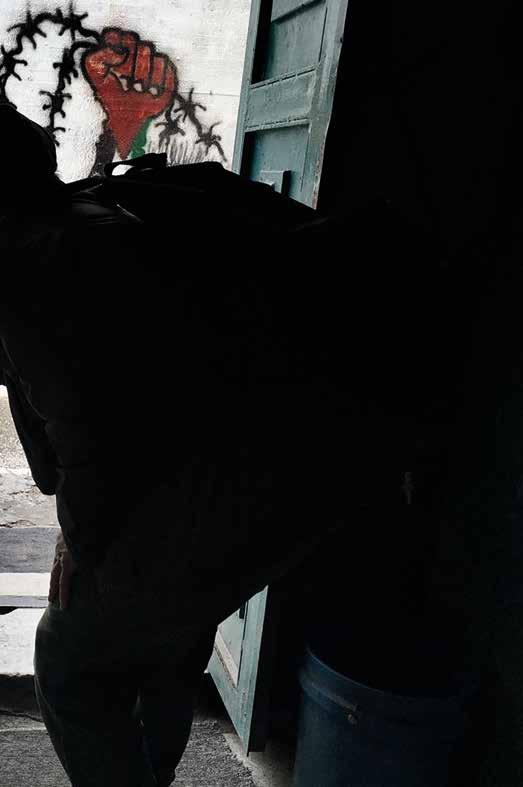
This used to be a cultured city, mostly Catholic. Youngsters used to study in schools managed by nuns and missionaries. It is slowly dying suffocated by this wall.
I READ NAMES ON THE MAP and it takes me back to my Religious Education class.
WHEN YOU ARE STANDING IN FRONT OF THE WALL, under gunsight or someone’s gaze you feel like a crime witness. You’ve seen everything you can therefore give testimony.
IN THE EVENING, when we get back to the Bedouin camp after filming I see the Palestinian flag and the flag of Al Fatah lit by two trucks. They don’t celebrate the freeing of a prisoner the way I’d imagined. There’s shouting and hooting (after six months spent in the hands of Israeli soldiers) for the return home of eight young men; 8 lifeless corpse.
for the “Nemesi” project.
• Superior race / chosen people
• Blind obedience and Arian youth exaltation / ruthless determination, extremist settlers
• Reprisal: for every German soldier killed ten Italian civilians were murdered / same principal goes for Israel with worst ratios
• Warsaw Ghetto / Wall built around Gaza and other places
• Segregation: forbidden access to Jews in public spaces / Forbidden access to Palestinians to streets, buses etc.
• Jews are told by the Nazis to only take their precious belongings and then stripped of everything. / same goes for Palestinian refugees.
• Incursion: round ups and work camps for the Jews / round ups, arbitrary arrests, destruction of homes for the Palestinians
• Cultural destruction: demonise and delete other party’s history / idem
• Cruelty: death camps / physical and psychological torture, violence that does not spare women, the elderly and children
• Spies: checking and informing / The Mossad
• Deportation: Nazi trains / containers for the Bedouins
Fourteen, sixteen, seventeen year olds. Martyrs who will join and be part of the “Country of Saints” line, just like the writing reads on the wall we turn to all the time and find ourselves facing. The news around the world however only talk about suicidal bombers.
is a small town made up of houses with pillars on the upper floors which have been left there, waiting for another storey to be built but it’ll only happen when there’s money available and when the kids will return. It is just like our unlawful Calabria. But I like what my eyes record. I’d stay to grasp ideas for a next story.
I WAS EXPECTING THE WORD “FEELING/EMOTION” TO BE THE KEY WORD TO THIS TRIP, BUT IT TURNS OUT IT IS THE WORD ANGER.
Or, rather, the days that precede it. Vaccines, suitcase, last will and testament written the night before leaving and sealed in an envelope labelled “In case I don’t come back”. So much so that when I read the introduction to Sad Tropics , I felt less alone. Lévi-Strauss felt the same way I do.
NOW I AM AT HOME, in my apartment between the Borgo and Trastevere neighborhoods, but in twenty-four hours’ time I shall be in Uganda, travelling between Kampala and Gulu.
WE WILL TELL THE STORY OF THE CHILD SOLDIERS AND OF ST. MARY’S LACOR HOSPITAL, a hospital founded by an Italian doctor, Pietro Corti, and his wife Lucille. Their story of love and passion has been the subject of books and films.
OUT OF NOTHING, THEY SET UP ONE OF THE MOST IMPORTANT HOSPITALS IN CENTRAL AFRICA.
TO THE HARD TEST. But doctors and volunteers, at the risk of their lives even, did not abandon their posts, they held in there. And so today, even without the Corti husband-andwife team, the hospital provides assistance to threehundred thousand persons a year.
DAWN IN KAMPALA, THE CALENDAR SAYS THE RAIN SEASON IS OVER. But it’s not true, the calendar lies. OUTSIDE THERE IS MUD, THERE IS THE MARKETPLACE, THERE IS THE COLOR OF THE WALLS, NOW COBALT BLUE, NOW SHOCKING PINK, outside there are handmade chairs waiting for well-to-do asses, drivers of one-client-per-day motorcycle-taxis who look at their own reflection in the chrome plating of epochs gone by. Outside there are brick factories, pieces of meat and flies hanging in plain view like a work of contemporary art.
the words that I am writing might well be my last ones, my last wishes.
and I am about fifty now that I am here, living and writing. If I were an Ugandan man I would have to survive on one buck fifty a day. Who knows how I would have gotten through this one. Motionless like a nut case standing in the middle of the tracks of the old railway staring at the rats that dive into a mysterious black hole, or sitting on the stool of a barber friend listening to the radio playing the same song the radio is playing in Brooklyn, New York.
I would shut my own to keep the dirt out of it and be busy digging a long trench for I don’t know what philanthropic project financed by the Japanese government. Or else you would see me there, teaching a lazy apprentice how to build a double-bed out of a single piece of wood.
with those 400 dollars a year and sought my fortune with an old rusty pistol in hand, threatening the teller of the only bank that looks like a bank within a radius of many, many miles. Maybe I would have gotten away with it and now be hanging out with a pair of real leather boots on my feet and a fake-cheetah cowboy hat on my head, but maybe I wouldn’t have, and then I would be there, on that open truck, surrounded by others just like me, wearing a horse-piss yellow uniform and an expression like stone, just like the stones that I would have been forced to break the whole blessed day long at the forced-labor camp. And now, surrounded by guards with a bullet ready loaded in the barrel of their gun, I would be on my way back to a cage, gazing as if I were tripping at that strange musungu who is trying to imagine what it might be like to be me.
I would have walked and for twenty-five long years have watched my children and their children walk every night to avoid getting assaulted and to find shelter behind the walls of St. Mary’s. Or, on the contrary, I would have been a rebel, I would have looted and raped, turned children into soldiers, innocent ones into murderers, victims into butchers forced to beat their best friend to death with a stick.
TO THE INSANE RANTINGS OF
FATHER kneeling in the blood of his son whom he himself has murdered. I would have cut off ears and noses, shut mouths with machete blows, crucified boy Jesuses in the name of a fratricidal army that massacres in the name of the spirit. Or I wouldn’t have, and instead would have gone with brother Elio to bring help to the victims of Ebola, to bury the dead, to console the living.
LIKE HIM, I WOULD HAVE BECOME A GRANDFATHER without ever having known a wife or conceived a child. The grandfather of 130 orphans who survive thanks to some help from Italy and to divine providence.
IF I WERE A HUMAN BEING BORN IN THIS LAND PERHAPS I WOULD NOW FIND MYSELF in one of the beds of the large ward reserved to those suffering from AIDS, which I am now crossing uncertain whether to keep my eyes more open than ever or double-locked shut.
LATER, IN THE HOSPITAL’S MATERNITY WARD, I TOOK OFF MY SHOES AND ENTERED THE ROOM OF THOSE BORN PREMATURELY.
Twenty plastic vessels with inside them twenty beings silently breathing. I brought my ear closer in order to hear and my eyes in order to see. Then I did the opposite.
OUTSIDE, IN THE NIGHT, ORPHANED CHILDREN SING IN THE RAIN
«We say thank you Jesus» and I sing along with them and think of how beautiful and generous it is to thank someone who seems to have denied one everything and even more. Who knows if in heaven’s plan they won’t be repaid for so much blind faith and so many joyous serenades.
NOW WE ARE AMONG THE PINK CURTAINS OF THE BIRTHING ROOM, TWO TWINS HAVE JUST LANDED ON THIS EARTH. A BIT FURTHER ON, THE SHY MOANS OF A YOUNG MOTHER ANNOUNCE A NEW ARRIVAL.
What an immense act of justice, in this immensely unjust world, to see, to know, that the most extraordinary miracle, the greatest wealth, is not the exclusive prerogative of the rich and powerful. But also of the poorest and most derelict part of humanity.
amid tombstones that recall the sacrifice of nuns, doctors, and nurses. Brother Elio, a missionary with a Sean Connery-like smile, tells me that in the days of the Ebola many decided to remain here, even though they knew what awaited them.
«To muster up courage we used to down a small glass of grappa before going in to challenge that monster of a virus,» he says to me grinning, only to then be moved almost to tears at the recollection of the last words of Doctor Matthew, he who had been called upon to carry forth the heavy legacy of the Corti couple, «I am willing to die, Lord, but may I be the last.» And the last he was.
TOO MUCH WAR, TOO MUCH HORROR, FOR TOO MANY YEARS. Smiles on children’s faces are rare.
WOUNDS ARE STILL OPEN AND OFTEN, ALAS, PLAINLY VISIBLE.
When in the villages we shoot the flashback scenes to our stories, the protagonists often empathize with the characters they are portraying to such an extent that they are moved to tears. Then, I spend a moment longer as close as I can to them and, with my hands and voice, try to make them feel me. But in the end it is I who feel them. And I shall continue to feel them. Often, for some to take an active part in the shooting means coming to grips with the past, a dramatic re-enactment that many projects for the recovery of traumatised boys and girls recommend.
I have seen prison inmates, drug addicts, AIDS victims, enslaved women, street kids, the survivors of earthquakes or floods, come out of the filming experience with a greater awareness and strength. I have felt them become lighter.
I CHANGE GEAR AND AT THE SIDE OF THE ROAD CHILDREN SUCK SUGAR CANE and greet me as I pass two women with amphora-shaped asses, just like the amphorae they carry on their heads, and men as thin as bamboo sticks, carrying heavy bundles of sticks, of bamboo sticks to be precise. Thus, between an easy simile and a worn metaphor I run the risk of running off the road a couple of times, but in the end I am there, ready to shoot the Nth take.
WHILE STILL IN ROME, AND MUCH THAT I AM DECIDING NOW, on the spur of the moment. And here, now, everything comes easily to me. And I manage to tell of the poetry where many see only the reality.
I TRY, BY MEANS OF SHOTS THAT LAST A SECOND AND A HALF, to show the purity behind the filthiest poverty, I try to unveil the beauty hidden in an ugly and miserable existence.
THE GAUNTLET THAT I ALWAYS THROW DOWN AT MYSELF, SERVES EACH TIME AN IDENTICAL PURPOSE: to allow the marvellous humanity of those at the bottom of the social ladder to rise up from the bottom’s floor. It’s not hard. For me, it is a thoroughly limpid vision.
WHEREVER I TURN IN THIS FILM SET OF BOUNDLESS SHANTY TOWNS, savannah, barrios, forests, and slums, the human beings, the animals, and even the plants seem to strike a pose as I pass by, ready to act out a part they know by heart. They are only waiting for me to say «Action!», «Assao!», or «Azione!».
I HAVE READ ONE OF THE MANY BOOKS THAT TELL THE STORY OF THE CORTI COUPLE, and now that I am in their house, I feel as if I am strolling through those pages. Hunting trophies hanging on the walls look at me as I examine pictures that tell of their lives, lives full of passion, courage, and, I am sure of it, also loneliness. I can feel it, I breathe it and it takes my breath away and fills me with melancholy.
IN
despite a few mice and the ghost of a missionary whose throat was cut by order of a witch-doctor during the war: there, through the windows, the sound of drums comes in to lull one to sleep at night and the voice of the cook - singing glory to life, to the Lord, and to our breakfast - in the morning.
IF I
IN
NOW, I MIGHT BE CONTEMPLATING MY UNSATISFIED EXISTENCE WITH A DARK SCOWL. FULL OF NAUGHT, EMPTY OF EVERYTHING. WITH CHRISTMAS PRESENTS WRAPPED WITHOUT LOVE AND THE VOICE OF A TV SET IN THE BACKGROUND ASKING ME TO UNWRAP A PACKAGE AND BECOME A MILLIONAIRE.
WHEN THE SHOOTING IS DONE, AFTER A SHOWER THAT HAS WASHED OFF OF ME THE RED EARTH AND YELLOW DUST BUT NOT THE ACCOUNTS OF THE CHILD SOLDIERS, we leave the seclusion of the Combonian Spirituality Center and, a step at a time like weary bathers in an unknown river, slowly venture out - for the first time since we got here - into the mysterious and turbid night of Gulu. This is what my life is like here today. Hours, days, spent amid missionary nuns and brothers, many of whom are over seventy years old, since young ones are rare, vocations are waning.
ALL OF WHOM ARE UNDER TWENTY-FIVE, AS VOCATIONS ARE WAXING.
With Jesus’ missionaries, I spoke, listened, danced. And now I do the same with these other, colorful missionaries. At the risk of sounding blasphemous, I swear that my heart throbs in exactly the same way in the presence of either. And it seems to me that also that son of a carpenter from Nazareth was of my same mind. In brief, in the same way that I fell in love with father Angelo and brother Carlo, I shall never forget this Maria to whom I will dedicate a poem. After loads of love given and received, I now walk and observe life around me accompanied by a sense of absence and of lightness and perhaps even of freedom. Like a Nepalese porter without anything to carry, like a mountain man without wood, like a soldier who, after years and years, sets out for the first time without a heavy rucksack on his shoulders.
NO WOMAN ON THIS PLANET WILL FALL ASLEEP OR STAY AWAKE THINKING ABOUT ME WITH LOVE. NOR WILL ONE OPEN HER EYES AT THE START OF THE NEW DAY WITH SUCH A FEELING. ANOTHER NEW DAY WITHOUT ME.
I CANNOT HELP THINKING THAT, WHATEVER THE LOVE-DOSE THE GREAT PUSHER IN THE SKY SET ASIDE FOR ME, IT HAS ALREADY BEEN FULLY INJECTED.
IN THE MEANTIME, I DANCE WITH A GIRL WITH A GUINNESS T-SHIRT and curly black hair and, with every song, I feel more and more cheerful and tipsy, as if I were guzzling down that Guinness girl. I don’t feel better than her in the slightest. «This is a Swahili song», she whispers in my ear and teaches me to slow down the rhythm of feet and heart-beat.
WOULD HAVE
PAIR OF EYES, the smile of a mouth, and the rest. Now, here, eyes and smiles are more than enough, an easy girl from Gulu gives them to me in exchange for a beer. Like a poète maudit, like a disinherited writer, like a subversive saint, like a piece of shit trafficker, I seek a bit of life after days of stories and tales in which death played the star role. I betray no one and no one will feel betrayed.
Who knows whether I will feel the same tomorrow morning; meanwhile, I cross the joint looking for the exit, amid the sweat smell of women and piss smell of men. I turn around one last time and hear someone say to me «God bless you» and, to such a marvellous farewell, can only reply with a pathetic «Bye-bye».
One lives as if one had been called in to make a brief appearance. In the feature-length of being, Africans are used to seeing their part as the fleeting passage on screen of an out-of-focus extra.
THE NEWS OF THE DEATH OF THE SISTER OF A YOUNG MEMBER OF THE AFRICAN CREW is received as if it were totally normal, a routine matter. They are almost surprised at the fact that we are surprised.
SO WHILE I AM CROSSING THE UNDERNOURISHED CHILDREN’S WARD, I wonder under what sun or moon she will be able to wear the flowery dress I gave her as a present, without withering. Then my thoughts come back home and I laugh at my pain, which is such a small thing compared to that of those around me.
THE RULE IS ALWAYS THE SAME. The more they have lived their lives for others, been courageous, made radical choices, the more they are open and smiling and inclined towards understanding, curiosity, mystery.
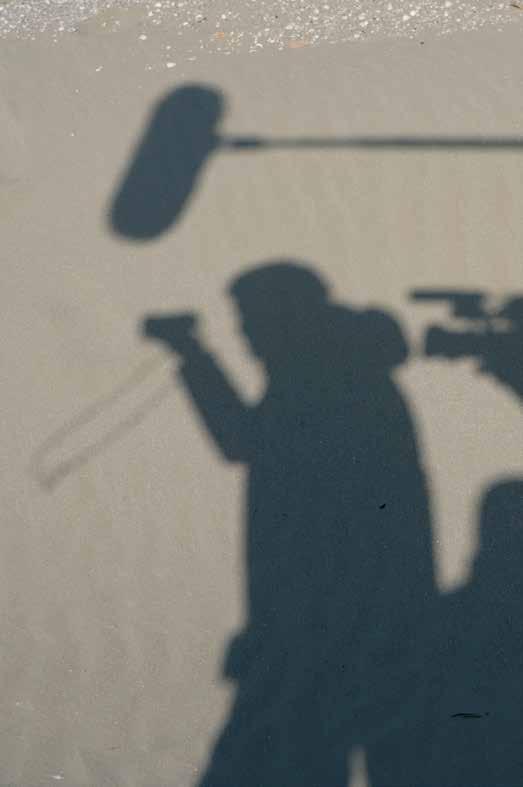
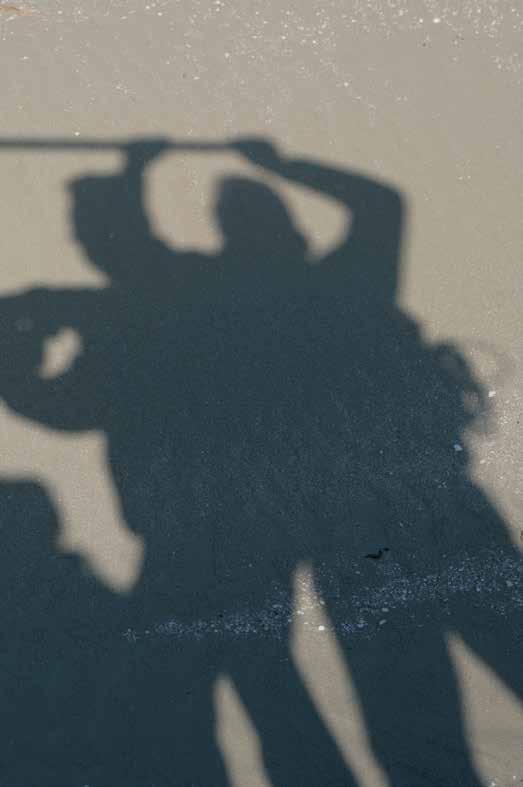
OF JEEPS THAT, INSTEAD OF “BABY ON BOARD”, have “no guns on board” written on them. Two ex-child soldiers, fleeing from their past, are walking hand in hand.
I SEE THE CHILDREN IN A VILLAGE RUNNING AWAY IN FRIGHT but, for once, it is not men in uniforms that are the cause of their terror, but an army of bees.
that live near the great waterfall. I am told about the trick of putting earrings on small boys to make them seem like small girls to prevent them from being kidnapped. In the sky, the wings of termites similar to snow. One of brother Elio’s orphaned children who hands out candies, and in the end is left without any for himself but doesn’t turn a hair.
ON THE COLOR
and the green grass will become, with each passing day, more and more like yellow straw. Large trucks zoom past us and each time it feels as if our small pick-up had been slapped in the face. A stone hits our windshield like a bullet, just as I was thinking of gun-shots…
SITTING ON A EARTHEN CHAIR, A LITTLE GIRL with a rooster in her hand and a smile as light as a promise watches me pass by.
IN
my eyes are red from the dust and the tears. The lingering words of Francis and Cipryan who—down to the very hour, 6 pm—tell of the day when they were torn off the tree of the family of the innocents. Living in the bush for years on end, amid suffering and the atrocities inflicted upon them. Tales of underground prisons and endless hours spent with their feet in water, of survival on a single banana in the morning and another one at nightfall. Then, the day of their escape, of their great, immense refusal. «Kill me if you like, I’m going home, I’m not killing any more.» In the end, we hug each other tightly and, finally, Commander Francis looks at me in the eyes and bids me farewell without lowering his.
ON THE WAY BACK, WOMEN ROAST CORN COBS UNDER LARGE TREES, children sell mangoes piled up in pyramids, at every stop men offer us hens cooked over a fire, while hens scorched by the sun risk getting run over by us. Sunday hymns stream out of doorless churches, and prayers that will have to last a whole week enter the huts.
THE WIND URGES CORN STALKS TO BOW TO US like a mother does with her well-brought up kids. Meanwhile, my sideburns have once again grown long and out of fashion, but that’s all right.
SHALL
BANANA WITHOUT IMAGINING MYSELF SURROUNDED BY REBELS IN CHAINS, WITHOUT FEELING AS IF MY FEET WERE DIPPED IN WATER?
CALCUTTA IS AN ULTRASOUND. Like a trained dog I move about trying to obey its commands. Calcutta is fog of exhaust pipes and coal, smoke of corpses and garbage. Calcutta is the most real of hallucinations.
I CROSS PATHS WITH RATS, DOGS AND MEN, equal members of the same caste. Calcutta is locks of just shaved-off hair on the ground, Ganges blooming with excrements and lotus flowers, tooth-brushes drenched in lurid waters.
I’VE BEEN TO CALCUTTA. Why should I be afraid of you? I have waked for, smelled, caressed the body of that city that has been agonizing for ages. How can you hope to impress me by showing me your wounds?
THE
WHO HAVE BEEN ORPHANED, deprived of everything since the first years of their life, now become young women here, in the nuns’ houses. A female version of Ndugu ndogo, the marvelous house for the street kids of Nairobi. There they call me “father”, here “uncle”. There, when I was about to leave, they screamed: «Come again, come again!», here they sing to me «Don’t go, don’t go». There we played football, here we play rind-a-ring-a-roses. I really me, there and here.
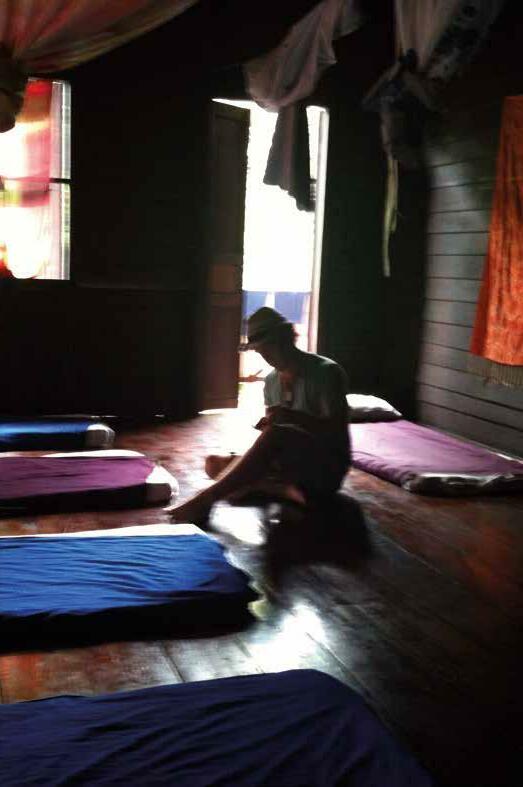
CHINA IS FULL OF CHINESE.
THAT’S THE FIRST “DEEP” OBSERVATION I DONATE TO MYSELF. Never seen another large city in the world with fewer foreign tourists.
IF YOU COME HERE FROM BANGKOK, EVERYONE SEEMS SERIOUS AND ANGERED. Perhaps it’s better to fly in straight from Rome, on Alitalia...
FROM THE LAST FLOOR OF THE HOTEL I SEE THE EXHAUSTED SUN SET. Smog has won once again. Even though there are only electric motorcycles around.
I LAUGH THINKING ABOUT HOW MANY PEOPLE ARE BUSY LEARNING CHINESE, whereas here you can’t find anybody able to understand or say two words in English. Or something of the sort. In brief, our interest in them doesn’t appear to be requited.
I
SQUARE.
It is evening, after the changing of the guard, behind the crush barriers, only children waving red flags remain. I take a picture of two military men with machine-guns strapped across their shoulder and then of a little girl with tiny lights on the heels of her little white shoes. They turn on and off, like fireflies.
THE SUBWAY COSTS ONLY A FEW CENTS. It loads and unloads human beings at a steady rhythm.
I HAVE
OF
OF THE CHINESE. I CONFIRM THE FACT. But the streets are clear and well-cared for. Gardeners water roses and my neighbor spits into the wind. By the way, it’s the hottest time of the year, but this evening has something light about it as it greets us.
We walk under the trees, around small tables, there is playing, eating, and screaming.
AT PANJIAYAIUN MARKET I BOUGHT A GREEN MILITARY JACKET AND TWO DISHES, I HOPE A BIT MORE ANCIENT.
Later we eat the best Dim sum in the city. Next to us, a rich harpy complains about the food with the waiters and woman manager, with a harshness that enlightens me about this country and its culture. We digest while crossing the hall of planetary super luxury: the rich can be seen and do nothing to hide themselves. The top labels are always Made in Italy. How’s that? Haven’t they been telling us for years that China is the mother of all our problems and failures?
I
The real dictatorship appears to be that of conspicuous consumption.

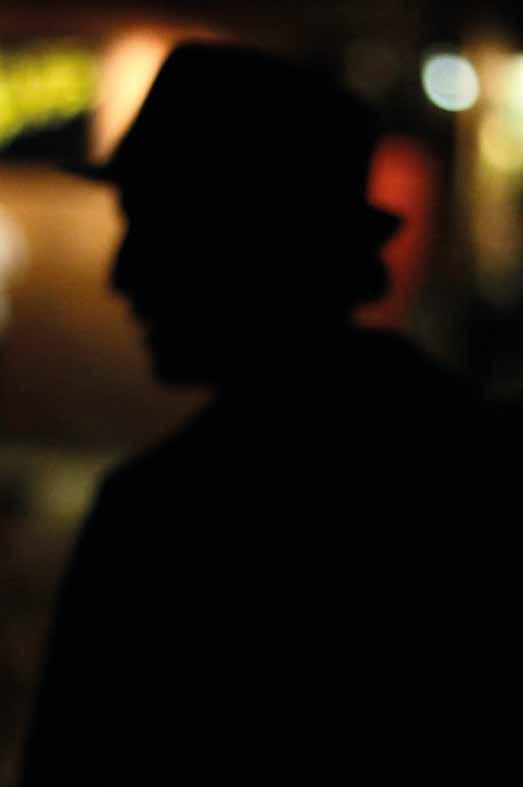
I cannot help comparing them to the fauna at Mc Carren Park in Williamsburg. There, around the work-out machinery, are young and muscle-bloated blacks and latinos: here, octogenarians thin and flexible as bamboo canes.
Rare indeed. I think: the harshness that a Japanese can express with respect to himself, a Chinese can with respect to others.
On the tables, lit by red lamps, Mongolian delicacies and shrimp. The men’s navels rigorously on display.
It’s forbidden not to be moved. Inside the ancient Hutongs, bits of marvel. The dragonflies on the lake of Beihai Park chase one another amid the paddle boats of the Chinese dressed-up for a festivity. Up there, the palace that once belonged to Kublai Khan.
never set foot in it in Italy, but I’m becoming an expert about it in Asia. I thought nothing would have surprised me after seeing Bangkok and Hong Kong. I was wrong. Wild luxury, huge video screens, avant-garde architecture, brands at the peak of their splendor. After closing timme, in front of the gigantic, lit shop windows of Prada and Lamborghini, middle-aged women dance ancient dances.
Before coming to the Kingdom of consumerism called Sanlitum, I hadn’t seen anything that made me go “Wow!”. Before coming here, as I said.
On the Great Wall. We climb up. Heat, fatigue and, in the end, emotion. The last tract, the forbidden one, is very beautiful. On top, we lie under a tree with red ribbons dancing in the wind. I listen to my heart ever so slowly start to beat again. And I repeat to myself the words of Confucius:
SHOKUNIN.
I must go deeper into the real meaning of this word. Owner of one’s job. It’s much more than that. A smart priest like figure parades behind the glass window of the shuttle that drives me out of Narita airport, he bows at every arrival and departure. It’s like showing obedience or passiveness towards work. To be frank I feel that there’s dignity in that bow. However monotonous and with no expectations it certainly needn’t be loathing but somewhat celebrated, blessed. With that bow he also seems to honour himself and his role in the universe. Her I am once again in Tokyo a year later. It’s spring and I’ll be staying here for a month or so. At the restaurant of the Hilton hotel in their impeccable uniforms I watch them. The eldest is telling a younger waitress who is taking notes how to lay the table. They stand watching and moving a saltcellar and a toothpick container. A cubical and a parallelepiped volume must be perfectly distant from each other. They keep watching like an artist would with his work of art while it is being set up, the correct alignment of the plates and chairs.
Thirteen million five hundred and thirty-two thousand people live in Tokyo. Almost perfectly divided in half. Life expectancy for men is 79,82 and 86,39 for women. Eleven million unnoticed visitors a year. Disorientation is total. I’ve no signal, so I walk around at the mercy of whatever is to come. Everything I’ve learnt about the city before now seems to have vanished. So I find myself back to the starting point having thought I’d reached God knows where. It’s an existential metaphor. An Old smart couple in a pub well known for its medure is eating sushi with their hands. Smiling young girls, who are actually laughing between them. If I had to write this sentence down every time I see them laugh I’d quickly fill up my notebook. I observe the subway “pilot” he’s wearing a pair of immaculate white gloves, and slowly moves while interacting with the route ahead of him. Just like an orchestra director. The only two people I’ve seen arguing on the streets were two Sicilian women. Japanese people under the shadows of the trees all seem instantly happy just like me. There are however too many people wearing half masks, I don’t really like it they are either defending me or themselves. Taxis are spic and span though old style same as their drivers. Pedestrians are standing still waiting for the traffic light to turn green. Even when the streets are empty. Unlike New York. I’ve changed my hotel, home and neighborhood and it is as if I’ve
moved to another city altogether. Since childhood they are brought up to observe, while compared to us when facing the beauty of nature we are accustomed to commenting, moving and at times closing our eyes in order to relax. They observe in contemplation as if it were a painting. The ancient and harsh crows voice comment life down here from up above. I was lucky enough to enjoy beautiful sunny days, warm wind during the day and cool at night. Truth, compassion, Tollerance: a banner with these three magic words. Smart gentlemen are water painting outside an open air arena where a metal band is playing. Then a little at a time the adepts arrive just like those black feathered birds who challenge the skyscrapers. It is interesting to watch how the event is also joined by rebels in a warlike manner. They all move their hands together though each time in different directions. When they headbang they become a wave that could make Hokusai’s wave green with envy. I have to remind myself to tell my kids when they’ll be travelling with their other half or friends to spend a couple of minutes and gift a lonesome traveler that might be sat next to them on a train going somewhere or an old hut with a few words. Their words their attention is a way to thank all those people who have done the same with me throughout these solitary years of wandering. Like the opera enthusiast who kept me company
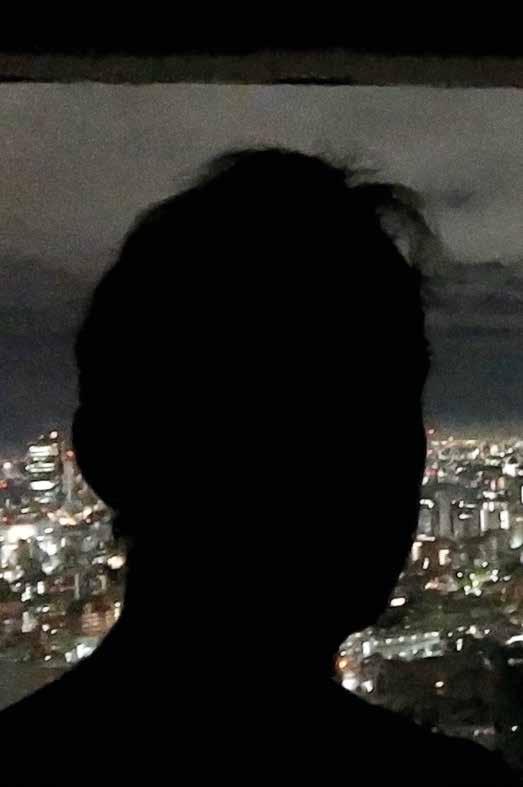
while having my ever present sushi or the couple from Osaka who speak to me through google translate and who are moved by my tale of my daisy patterned shirt I am wearing in honor and memory of my daughter’s birth. I did not understand a single word at the Kabuchi Theatre, not one. But the first act was still beautiful but I left in a hurry, it was four hours and a half long. This tiny four-year old actress was brilliant. As far as children are concerned my power towards them doesn’t seem to have faded. I might have to create a character for a story. For adults it is an invisible power but not for children. Just today, while in the lift a two month old human being who’d just woken up held by his father looks at me and smiles. His parents surprised by it all also smile. How is it that they clearly feel me? Nowadays it often happens, and it throws me off because of the language barrier. Some people are horse whisperers, some strike women with just a glance and then there is me. I am on the same wave length as these little ones. It’s as if I were tuned to the same frequency which they only have access to. That station adults have disconnected from. I’ve moved again today and I’m back in Harajuku. The city feels mine. I feel proud as I tell myself over and over. I take a walk with my new Daido Moriyama compact style. I have a sudden urge to take pictures again. The gay parade should stop by Yoyogi Park. As I get there the parade is over but the park is packed and unrecognizable compared to a few days ago. Loads
of foreigners, I hadn’t yet seen this number of foreigners. Some aged Elvis look a likes certainly stand out. They are amazing dancers, they are wearing jackets and overly tight jeans. Nature images even on the sweets, different according to the different times of year. Then there’s the Ikebana bracket, which goes against my story of being generally self-taught as well as an anti social grizzly bear, I signed up for an Ikebana workshop. I take notes on this noble artsy craft our teacher tells us. We get down to work and I feel instantly inspired and light headed, I was then told I moved and made choices like a master. It was like meditating, I am surrounded by a number of mini gardens, these are my free style painting walking through flowers. Beautiful. And while I am back in Rome rewriting I am surrounded by my ikebana free style mini gardens. Shibuya crossing: I take pictures using my flash, stealing images of bodies and faces like a serial maniac I walk and walk and walk for hours every day. Everyday a new park. Couples of old-aged people, side by side. She suggests what to capture in aphotograph, he opens up his tripod, as if a painter with his easel. Leaves of maple trees that you can caresswith your eyes. People who know. Sensitive to leaves. I had told myself I would tidy up my film stories and my characters. But I haven’t. I’ve only quickly written down these notes. I read a little and observed more. Jimbocho a neighborhood
packed with bookstores, shelves filled with porn, all kinds of porn. DVD’s, cartoons, monographs dedicated to nude models. Bondage and so on. The streets are packed with alluring Lolitas and there’s not a girl who doesn’t carry her look as her id. Men walk past them without once turning around, desire and longing flow deeply.
AFTER THE BOREDOM of the airplanes, busses, and the queue for the visas, finally on the slow boat, finally on the river! On the river!
LYING ON A MAT LAID OUT on a wooden table, I write and breathe Mekong air. And I am relieved. In the literal sense of the word. And to hell with my intestines that are starting to remind me of my earthly weakness.
Men and women and children of the river. The brethren of other beings encountered on other waters.
with very long stairways prostrate at their feet. What’s more I sleep, I sleep! Only those who know me can understand the reason for the exclamation point.
AND WHEN I RE-OPEN MY EYES, on the right side I see the green and yellow of the forest flowing by and on the left the gray and black of the sky. Then I sit up and write some more. One of the men steering the boat greets me with a nod. I get up to walk around, astern there is a bed lifted from the ground and surrounded by mosquito netting. Director of my own dreams, I shall set a love scene here. The noise of the motor drowns out the voices of the other passengers and those who know me will know how much this too pleases me.
THE
BROWN, hiding I know not what. From time to time a rock juts out, like the body of a Marine bloated with death. In front, piled huts preside over little crops of maize and bananas. Higher up, the high trees. And even higher, clouds lit by a sun whose presence you sense like a spirit. Then the clouds send down raindrops to make conversation. Then also the sun comes out to enjoy the scene.
in this period the river is swollen and fast boats become dangerous. I’m glad I picked the slow one. And what’s more, I have the most envied spot on the boat.
I ALTERNATE SLEEP, DREAMS, AND WORDS. And it really doesn’t matter where this boat is taking me. I like being here. And it is exactly the same feeling I had when I was with Som. I didn’t know where that trip was leading me but it was beautiful to be there.
SOMETIMES IT SEEMS TO ME THAT THERE IS ONLY ONE GREAT RIVER. The women who appear bent over their laundry, the men in their thin canoes engaged in the millenarian act of fishing, the children along the sandy banks who greet us by diving into the water, the color of the water, the shape of trees, the birdsong, the solitary huts on hilltops or gathered below, this and much more that my eyes observe today, in the past they have seen elsewhere.
LOVER WHO IS LATE.
OUR PROGRESS IS SLOW, IT WILL TAKE US TWO DAYS TO REACH LUAN PRABANG. PERHAPS THIS TIME MY SOUL WON’T LAG BEHIND.
AT THE END OF THE DAY, we dock on the banks of a ghost village that lives thanks to the boats that stop there for the night.
THE NEXT DAY, AT DAWN, after two hours of bargaining (they wanted to put us all on only one boat), we set out for a second day of Mekong. Sly as a scoundrel I take possession of the wooden table on which I will sleep, write and daydream again. From time to time my glance crosses that of the young woman who manages the storeroom. I don’t know if she is the captain’s wife, I know that she has the eyes and the smile that a wife should have.
In order to fall asleep, Bernardo leaves a book open on his chest. When she made love, Som spoke incomprehensible words.
THE
seem not to have yet metabolized the passage between yesterday and today. The first tourists in this area arrived a few years ago. So they still look at you with that amazed and serious look that I have seen in my deepest journeys.
«YOUR
Only rice and bread. I reread Siddhartha , which I read many years ago. The pages about him amid the Samanas. I laugh thinking that sometimes I too, in our world, feel like that, far away from everyone and everything. If the love of my children wasn’t there to hold me back, I really don’t know where I would be.
SOUL IS THE ENTIRE WORLD» SAY THE VERSES OF THE UPANISHAD, «MY SOUL IS THE WHOLE WORLD», SAYS I.
I haven’t written or lived a single word or a single emotion that was truly new to me. With only one exception, contained in only three letters: Som. The only thing that would really be worth narrating I am still unable to narrate.
«Yes, very beautiful river, I love it more than anything. I often listen to it and have always learned something from it. There is much to be learned from a river.» And so it is for me. The river devours my anxieties like my Laotian neighbors do their meal.
from time to time we stop to take on board a man or a woman, who have been seated on a rock surrounded by the forest and waiting for ages. Landscape and river start to change, Luan Prabang is nearing.
on the wooden planks of the floor of my room in an old colonial house, look at the geckos come in through the windows and the motionless palm trees in front of the temple. The prayer of the small monks spreads like a fragrance. With wet hair I lie down on the bed and, after two days of river, let everything flow out of me.
I need only cross the street to enter the temple’s area. The novices read out loud, each one following his own reading, his own prayer. Voices mingle and in the end become a single voice. One of the young monks is seated on a statue of Buddha who seems to be cuddling him. «Sabaidee», he greets me. Black dogs and white dogs seem to have absorbed the peace of this peace. The singsong continues. Then I befriend a monk who asks me about the Buddha I wear around the neck.
AT NIGHT, UNDER THE MOSQUITO NET, I CAN’T BREATHE. I OPEN THE WINDOWS: EVERYTHING IS MOTIONLESS. THEN THE RAIN COMES AND I COLLECT MY THOUGHTS TO LISTEN TO THE STORM AS IF IT WERE A PRAYER.
WHEN I HEAR THE SOUND OF THE GONG IT IS DAWN.
It is still raining but more gently. Two women kneeling in the street, with a bag of rice in front of them, wait for the monks. Here they come, in single file. They receive a handful of rice and continue their round. From my window I wait to see them disappear. Then I jump into bed and beg for a few hours of sleep without thoughts.
of the trip is with the small statue at Prapang. The Buddha with the palms of his hands open to pacify the oceans. The spiritual heart of a people without boundaries.
IN
WE CROSS THE FIELDS, men and women of the soil come back from work, the clouds are mirrored in the river, a boat carries us to the opposite shore where we will climb into the caves of Tham Ting. Seven thousand Buddhas, seven thousand. There to wait for us, amid candles and incense. It is a marvelous place. We stop there to meditate, without anyone having taught us how to do it. A hundred meters below the river seems to be breathing deeper as well.
WE CLIMB, OR RATHER, WE ASCEND TO THE SKY. FROM THE TOP OF THE HILL THAT LOOMS OVER LUAN PRAPANG WE SEE THE TWO RIVERS FLOW INTO EACH OTHER LIKE TWO DEFENSELESS LOVERS.
of the Buddha’s different positions. Now I know that the Mekong is more than 4,000 kilometers long. Now I know that the local girls like long noses and are curious about us. But the law forbids all relation between Laotians and foreigners. Better this way, or perhaps not.
I woke up to the sound of the gong that signals the monks’ morning round. This morning as well it is raining. For a period, the government forbade Laotians from giving alms to the monks, who were forced to violate the precepts of Buddha and started to grow vegetable gardens and raise animals to survive. Then, pressure from the population reinstated the millenarian tradition.
over prices at the market, I and they enact a comedy made out of sighs and complicit laughter. They understand right away that I’m not a tough nut, so they relax and amuse themselves by nibbling at me calmly. And all I need is two smiles as sweet as honey from the forest to happily allow myself to be bamboozled.
FROM ABOVE, VENTIANE seems entirely flooded. Every woman has a smile for us. Every smile has inside it surprise, curiosity, boredom and perhaps tears.
IN A BOOKSTORE: flag with hammer and sickle and the portrait of Buddha under the tree at the moment of enlightenment.
AT SUNSET, ON THE MEKONG, DÉJÀ VU OF A FEELING EXPERIENCED IN PHNOM PENH.
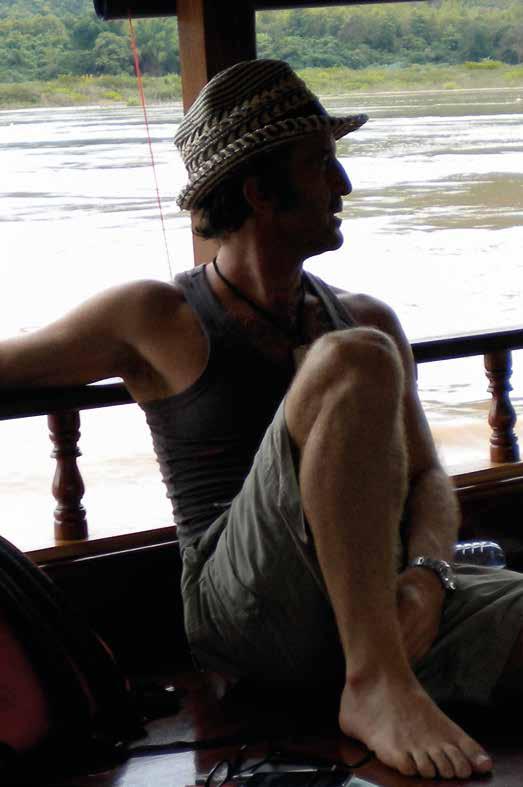
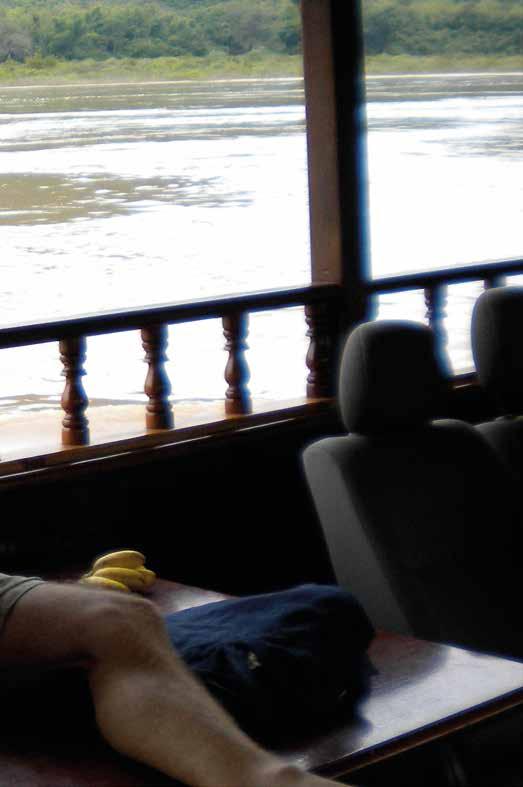
the city is filled with flowers and smog. Around the temples, they want to take souvenir photos with us, shyly we take on the role of stars. Then we stop to eat, stench from the manhole, midget waitress and white-fleshed fish.
Against the light I take shots of the silhouettes of the workers along the docks of the Mekong. The sun goes down quickly but then, over the broad banks, its reflection continues to keep us company. The first evening star makes its solitary appearance and I recommend my children and my dear ones to it. The smell of smoked fish offered by women who have been cooked in a like manner by life. A brute gently flies a light kite and I go up to my room to pack my bags.
No reflection on the murky puddles of Jakarta. There’s just enough time to introduce each other, shake hands with the thirteen rivers city that it is already time to leave. Is it beautiful or horrible? I don’t really have any answers, actually I do.
I don’t believe horrible cities exist, I can’t give a negative opinion on any city in the world. I’m happy to have been here, even for the yawning I wrote about at the beginning.
it takes about eight hours to get to Yogyakarta. The carriages almost touch the suburban huts, in the background skyscrapers appear like fly agaric. The Junk food temples with their universally known banners alternate with minarets. This is not the first time I see them together, however Asia and Islam to me are a mismatch. The flooded plains start, the square rice fields, men and women their feet in the
mud, bent backs but I hope their heads up in the sky. White sky, I take some pictures without much passion or glory. Nothing excites me more than a slow train approaching, I add the following to my memories, four women sat at a table on their lunch break on a small two square metre isle surrounded by flooded fields and hours of excruciating work. A boy with his dog, they look inseparable, the boy is trying to pull something out of the dog’s mouth. Every now and again we see a palm tree. A man or two loitering on the train track. A number of mopeds have stopped in front of the rail crossing bars and then the fascinated look on a child’s face standing holding a wrecked bike staring at the train as if it were the first time ever. I know, and so does he that it is not the first time. I wonder if writing is the only way for me not to let go of these images. These seven ducks that dart in front of me while shopping on a mountain of waste.
THE INDONESIAN ALPHABET USED TO BE one of the many mysteries of the Asian continent. But nowadays it is like ours. So reading and pronouncing the name of the villages and the cities we visit has become almost possible. It feels like we are travelling on a refrigerated van. The Air Con a status symbol par excellence around here is the
demonstration. Just like ghosts, the first volcanoes appear in the background, I don’t know their names. I shut my eyes every once in a while but quickly reopen them. I’m scared I might miss something out. The rice flooded fields are there waiting for me. Just like the old motorbike resting under a tree while its owner is struggling under his pagoda hat. In less than a month I’ll be in Senegal, what a life. A few hours later it’s picking time, the fields and the paddies here are green. Hanging from four bamboo canes some water painted like cloths which give farmers some shade and a new landscape for me. The volcanoes take advantage of my lost gaze to move forward a little. Local music is being shown, sexy characters in front of me and an old Muslim lady next to me. I’d like to be inside her mind now. We climb up towards Kretek where the terraces host rice paddies now. Three harvesting cycles per year, a constant cycle. We enter the Java forest and exit through giant bamboos, banana trees and wonderful trees. Up here the landscape is more beautiful it softens and makes the working scenario sweeter and poetical. Look at that man on the top of the hill, his body reflected on the pond! A little further away a couple of buffaloes wallowing in the mud as if they were in a Spa. We walk further up and the rice has already been packed. The men pass each other the bags while a little girl is swinging on a rag from under a palm tree leaf canopy. The pace, sixty five kms an hour (it’s not the Japanese
Shinkansen one, eheh) allows you to enjoy the view of a man squatting down taking a shit. The work is mostly done by hand the only mechanical aid I’ve ever seen was on the plain an old motor hoe capable of making its way through the mud. I can’t blame the Bintang a lemon taste local beer that I downed earlier on if my writing is shaky but our little train which is struggling up the turns. We cross and then drive along a lake that is bursting with water. The rainy season has just begun, if it is so pissed off today what is yet to happen? We are descending towards the coast, opposite to where we started from. At the foot of a huge ficus tree a handful of small tombstones which look more like rotted fruit just fallen from the trees. We are in Yogykarta. It reminds me a little of Siem Rep in Cambodia, which has grown thanks to the temples near by. I take my evening stroll on Malioboro Street. Little shops and restaurants under plastic tents. A few sales people show off their Italian vocab as soon as they find out where I’m from. The Hindu Temple, the Buddhist temple and as background music we have a Muslim prayer. It is all happening on the same street at the same time.
I WOULD HAVE LIKED THE DAY OF MY ARRIVAL TO BALI to coincide with the day of my departure. Tourists everywhere and I am unable to travel like this. I’m overcome by depression. And I have to fight it off. I decide not to get near the coast but instead choose to head towards the inside. I make friends with Waigan who’ll ride me around on his pick up truck and who is utterly surprised when I ask him not to take me where others are willing to go. The rain helps me out. So does the calendar. It is the Dark Moon today, a holiday for the Balinese. The temples I visit under the pouring rain have very few tourists, many of them go up in a line, the women with their offerings on their heads, and their striking bright clothes. In the Tirta Empul temple
WHILE I REWRITE MY NOTES I REALISE I HAVEN’T WRITTEN ANYTHING ON BOROBUDUR AND PRAMBANAN. THE TWO AMAZING TEMPLES THAT PUSHED ME TO TRAVEL ALL THE WAY HERE. THEY WERE THE MAIN REASON FOR MY TRIP TO INDONESIA AND I HAVEN’T WRITTEN ANYTHING ABOUT THEM. WHAT A PRICK!
there are men, women, old people, children who dip into these huge pools as a way to purify themselves under the water that flows from the fountains. They shiver with emotion and from the cold water. I take pictures under these blessed drops, I wonder what the result will be. Some Australian guys are also waiting in line I’m roughly guessing they are in dire need to clean up and purify. I set out on foot towards the rice paddies. It’s windy on this small paved path where every now and then a smiling pilot on a scooter drives by or an enormous butterfly. I smell the fragrance. And I make amends with Bali. I observe the well known Subak, the watering system that generously and democratically flows from one field to the next. In Goa Gajah, emptied by the rain storm I enter a cave where I find fragments of the Lingam the phallic symbol of God Shiva and the Yomi, the female equivalent. The most prestigious coffee in the world comes from here, actually to be more specific it comes from the lawak’s tiny bum, the small palm tree owl. Those of you who’d like more details you can look it up on google. The others can take out 200.000 rupees to have a small cup. Ubud is the homeland to artists as per the Lonely Planet Guide. Paintings, statues, batiks, wooden objects and jewellery. I buy a small canvas I find hidden between a million others on it two coloured
birds between leaves. Ubud, homeland to healers which has increased in number after Eat Pray and love launched. And run! I might add also homeland to yoga, if it ever had a soul it sold it. If you are lucky and curious you might be able to meet that soul somewhere. Moments of beauty and magic, but most of all under the rain. Ballerinas dancing a renowned dance with eyes wide opened arms stretched up to the air. My eyes half-close and I feel green with envy for the three stray who are blissfully dreaming away only a few metres from me. At the end of the day wile in the Monkey Forest Sanctuary of Padangtegal, I found myself feeling confused while standing in a line with rainbow women and men wearing a handkerchief on their heads holding their children. I sit next to a stone dragon furbished with bright green musk and I click away from the bottom, up. My camera is essential. The same one used by my beloved Daido Moryama, I still manage to muddle myself up. It is very chaotic under the Bali sky the situation should be excellent. There’s not much light and the wind brings showers, I change my setting, my lens fogs up and at times from a mistake we get the image which says something. The dominant monkeys are fighting with each other I’m carrying the statue of Hanuman and Sarasvati the goddess of knowledge in my rucksack which will most probably end up in Margherita’s home in Bologna. The derby is on tonight and I’m relying on the offers made…
Oh fuck there’s no cable in the resort I am staying in, there’s a swimming pool right along the forest but my telly won’t air “la Magica” (A.S ROMA). Deep into the night I rely on the news I read on my Ipad. Beginning of the second half: Perotti scores with a penalty shot and then Radja! A little later a penalty shot for lazio (please note the lower cap) I walk back and forth in my room as if I were condemned to death. Winning the derby is amazing. All the way from down here I know Marghe has set up a “Curva Sud “(AS Roma supporters side) at home with her friends. I then cheer with Mattia who’s in Brooklyn, I write to Chicco who is in London. The morning after still dazed by the adrenaline I go towards the middle of the island I want to feel its heart beat. I have to be honest, after the first few hours spent here I believed spirituality had turned into a night show to be enjoyed between the typical local dishes. Along the road that leads to the Agung volcano a procession with women leading and men in the back all framed by old decorations of past and future celebrations. The flowers, plants and trees I’d only seen on the canvas of those never ending galleries on the main streets surround me and take me towards the oldest and biggest temple of Bali the Pura Agung. We are up a thousand metres I climb the main stairs, in front of me the sea shines bright on the horizon. Behind me I can hear the volcano growling and playing hide and seek.
My young guide looks at it with both fear and respect. Well, good for him (five days later the volcano will erupt forcing 100.000 people to evacuate from the small villages I had just been to). On our way back Waigan, wants me to try the hot water that gushes into a lake. While in the swimming pool floating on my back on my own I let the raindrops slap me I’m thinking I should write a short chapter on the advantages of travelling in the wrong season. The rainy season saved my days in Bali. Every storm, shower has given me moments I will never forget.
of my room at the 34th floor of a hotel in Bangkok, I’m overtaken by the images of the screen in front of me with monks in a lost mountain lake who perform hypnotic Tai Chi movements. I wrote over taken. Hit and sunk by Stendhal’s syndrome. I hope I’ll earn enough credit in this life so as to be reborn in that monastery, in that ancient and mysterious Asia. I get up and look out of the window, the world is at my feet. I really wouldn’t know why but the words of this old Chinese man come rushing back, while in a restaurant in Chinatown he saw me on my own at the table came up to me and looking at me straight into my eyes said: “Enjoy yourself”.
I
And I didn’t know it. Patient, he was there, waiting between Second Avenue and eternity. I, unawares, was walking with a brand new black straw hat on. All alone like God Almighty and as proud as a father.
were turning from poetry into why-don’t-you-just-go-get-fucked, when one of the many hands of a goddess prodded me to enter an Indian-from-India shop.
On the contrary, he remained hidden underneath his beard, between portraits of mystics and divinities. So, when I came face to face with him, I failed to recognize him and was almost about to pass by, when again something urged me to stand in full view of him, barely veiled as he was by the frame’s glass. We looked at each other in the eyes and have been together ever since.
I KNOW WHY IN ROME IT’S BEEN RAINING FAR MORE THAN IN THE PAST.
Greenhouse effect, baloney! Climate changes, bullshit! The truth is that the heavens listen to the prayers of the Pakistani young men who appear as if by magic in the streets of Rome with their umbrellas for sale, as soon as the first raindrops start to fall.
I jumped over the calf whose throat had just been slit and then they wished me every good thing by whipping me with a blood-red branch. In Guatemala, to bless me, they sprayed aguardiente in my face. In Sri Lanka I passed three times under the belly of a she-elephant and then listened to her heartbeat. The Poor Clares, an enclosed order of nuns, sang for me in their convent.
I BOW BEFORE HE WHO LOVES. AND NOT BEFORE HE WHO IS
Lady Caterina hugs me tight, after telling me without words of her sons who are no longer on this earth.
I HAVE NOT THE STRENGTH, THE DESIRE OR THE CAPACITY TO EXPLAIN IT.
The only person who could understand me is the Henry Miller of The Colossus of Maroussi , on pages 39 and 47.
AND SO I SAID TO HIM, to Bernardo, that «With love everything is possible. And without love everything is useless.» And he asked me «Saint Paul?»; I looked at him in the eyes and answered «No, me.» We laughed and laughed. But it might have been better for both of us to cry and cry.
I FIND THE FOLLOWING ON A MEMO SLIP, written in my handwriting: “Write story about woman madly in love on Pantelleria in the 1940s. Based on the story I was told by an old woman interviewed in a documentary.”
wind, raindrops on the leaves of olive trees, and then sunshine. You know, those rare moments when God appears to be still in love with us. I went outside and, oblivious to the distance, I thought that she was still in love with me.
THERE WAS A PERIOD in which, every morning when I went out of the house, I would find a dog’s turd on the mat just outside the door. And a period in which, every night, I would nurse myself with Zen stories.
TODAY, I LAUGHED WITH MY CHILDREN TILL OUR SIDES ACHED.
THERE IS MORE LOVE AND RESPECT AND COURAGE in those who have the strength to say «I don’t love you anymore» than in those who say «I love you».
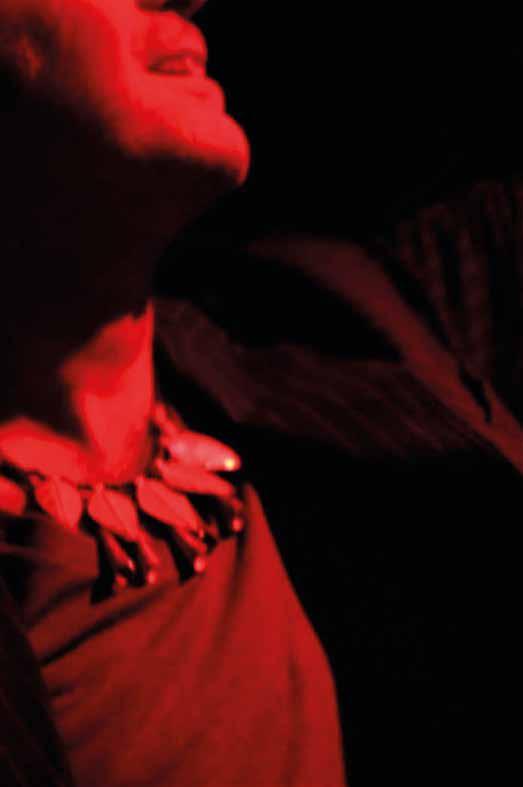
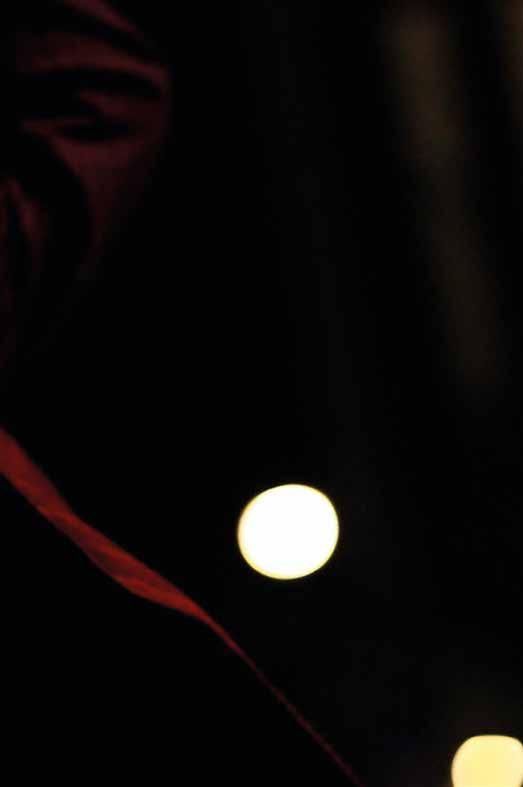
A 19-year-old kid, a regular guy, wants to make his little sister a present. A puppy, he wants to get her. So together with a cousin of his he goes to someone who’s got pedigreed puppies. A thousand euros is what the man asks for. And they offer him one hundred – which are still one hundred euros. But the chap says no way, I’m sorry for your little sister. So the two cousins leave but then anger swells inside them and they go back and they take the puppy on the sly and run away. They are fast they are, even with the little dog in their arms. But the bullets of a caliber 38 pistol are faster and they reach the regular guy – the one who wanted to make his little sister a present – in the back and in the head. The other guy, his cousin, gets away. Crying, despair in the whole family. But then, slowly but surely, the murdered one’s relatives start to hold it against the cousin that he ran away, that he is still alive. And in the end, do you know what they do? They kill him, so now we are even. And the little sister and the puppy, what happened to them, that I swear I don’t know.
I’m writing on pages that a father paper-maker brought up in order to give away – as he might have a daughter in marriage – to a painter or a master of watercolor and not to a pen pusher such as myself. The pen moves over this rough paper and makes the only noise other than that of the breathing of my three children who are enjoying the first African slumber of their life.
the whole gamut of emotions in a full-scale lineup. Arriving in Africa and here in Kivuli, in this cross between a half-way house for street children and a social center, in the heart of one of Nairobi’s slums, is no mean adventure. For no heart, even if it be of stone. Imagine then what it was like for them, who have grown up on my departures and returns, my tales and my silences.
the slum, Margherita said to me: «I feel as if I’m inside a photograph.» Spellbound, not only in a figurative sense. In silence, Mattia and Francesco looked, observed, saw. In a few minutes they took in what many will not come to know in the course of a lifetime.
of our rooms give onto the courtyard of Kivuli, others onto the slum. «What a marvelous view!» Margherita commented like a tourist satisfied after her first inspection of a five-star suite.
AS
colorful birds take turns perching upon the electric cable that passes in front of our windows. Behind them four little girls run alongside a dog whose ribs I can see sticking out, a woman with her small child on her shoulders, two men who are burning I know not what. It’s not the hot Africa, the sun Africa. The sky these days is gray and it is almost cold. In the courtyard, a truck with Fast and Efficient written on it empties the septic tank, kids play football and Margherita wakes up saying: «Oh my God, what a scare! I thought I was still in Rome.»
for life in the slum, the older kids tell us of killings, short-cuts that are best avoided, and dangerous nights. But to wait is useless and my children are ready for their first tour on foot between Riruta and Kawangare.
keep on asking us “Ow are you?”, “Ow are you?”.
Three little girls have kidnapped Margherita and I see them chatting away. Later she’ll tell me they told her about dead fathers, of life on the street, of the mirage of going to school. Mattia and Francesco walk alongside their African brothers and shoot pictures wherever and whenever it is possible to do so.
WE HAVE BEEN WAITING FOR THIS MOMENT FOR AGES, I HAVE FINALLY KEPT THE PROMISE I MADE MANY YEARS EARLIER: «ONE DAY WE WILL GO TOGETHER TO DISCOVER THE OTHER WORLD.»
EVENING FALLS, the small lights in the shanties and tiny shops are turned on. Here are the butcher’s and the clinic that promises painless circumcisions, hens and potatoes in baskets, and the hand-written signs I’ve always loved: the “Miracle Shop” store, the “Jesus Is My Provider” internet point, the minuscule sport’s bar “Wembley Arena”.
RIFT VALLEY, fog and shepherds amid clouds of dust, baboons, the first much beloved giraffes. I watch my children’s eyes peering at a lone man beneath a tree in the plain. The last outposts of civilization with gas pumps in perennial repair, lion’s teeth first handled by some Masai and now around each one of our necks, broken-down trucks and men lying underneath Euphorbia as large a oaks, and the sun that says «Yambo!».
A UNDETERRED MAN DUSTS THE SHOES ON HIS DUST-RIDDEN MARKET STALL. FROM TIME TO TIME MY EYES CROSS THOSE OF SOMEONE I HAVE ALREADY MET IN THE PAST, WHO RECOGNIZES ME AND SMILES. AMONGST MY NOTES, I FIND THE FOLLOWING AUTOGRAPHIC DECLARATION: «A VERY BEAUTIFUL DAY.»
we soon figure out that the petrol station attendant in Narok, like a smart aleck wine vendor, sold us watered-down gas oil. We are forced to stop in a place that is not a place.
TEN LOW BUILDINGS, uncertain about being used as houses, stores, or shanties. Spots of color in the distance tells us it is a market. Only Masai here, no tourists. Only goods for them: soap, seeds, and some dusty clothing. Necklaces, bracelets, are not for sale atop of mats but proudly worn around women’s necks and wrists. The more elderly ones greet us, the younger ones do not want to be photographed. Or rather, like every self-respecting model, they want to be paid for each release of the shutter. We witness the purchasing of four sheep that are loaded and then unloaded and then reloaded into the trunk of a car whose make I cannot make out.
I BUY A STICK, amid the general laughter. Then we make friends with a fantastic, shy, curious little guy as sweet as the pineapple we will eat in the evening. If I could adopt him without all the boring bureaucracy, I’d go for it right away. And my children would too. So we call him “the little Palombi” and will not forget him.
ON THE GREAT PLAIN that leads into the heart of the Mara, the number of animals we spot increases. The wind raises clouds of dust and, as a result, the little shepherds appear and disappear as in a conjuring trick. Then, finally, we reach the camp. It is simple, comprised of military tents. Not even remotely related to the super fashionable lodges. The Kikuju guards stand watch attentively. We haven’t understood if the danger comes from the hyenas or some thief ridens.
WHEN WE SET OUT AGAIN, I BLESS THE MISHAP THAT CAUSED US TO HAVE TO STOP AND BECOME PRIVY TO A HUNDRED TALES WE WOULD OTHERWISE NOT HAVE KNOWN.
surrounded by the yellow fields and wind and nothing more, I feel that I am here with my whole self. The Africa of the immense expanses or the polluted folly of the slums, makes me feel love for life. The continuous feeling of uncertainty and precariousness, spurs me to the present, to the instant now. It leads me to forget about projects and to erase the past. It forces me to be now. And now is so beautiful.
WE RUN INTO TWO YOUNG MASAI, they are painted, have very long spears and legs. A man who speaks a few words of English tells us that they are about to go into the bush where they will remain for months, until they have learned how to hunt lions, to jump, and to know the spirits.
IT IS 6.15 PM OF AUGUST 14TH, 2010. In Nairobi, in the Riruta slum, in the Kivuli center for street kids built by my friends from Amani. I see Mattia play football three on three, Chicco play the bongo drums with five other boys, Margherita holding a little girl in her arms, and I feel like a king.
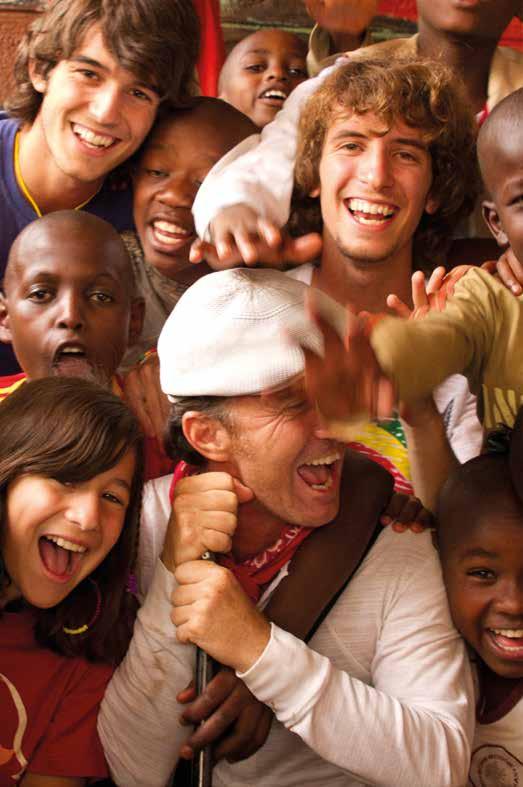
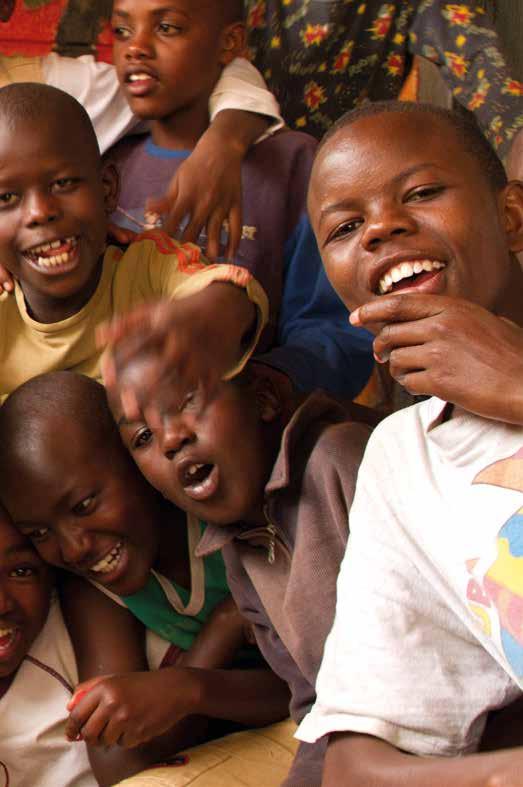
with my children and the parentless children from the Kibera slum. Ndugu Ndogo is the name of the small house that takes in children marked by abandonment, poverty, mistreatment, death. It is a marvelous place, full of life, that has grown thanks to father Kizito, to Gianmarco Elia and all the volunteers of Amani. Here we talked, sang, ate cake, played football, and, in the end, sobbed.
who will ask us «Ow are you?» with a smile? Who will shake my hand while repeating my name in amusement and excitedly articulating the syllables of his own? Who will invite me to enter his home the size of a bed with a bow that not even the king of kings ever received? What child will squeeze my hand and walk with me?
Who will say «God bless you» to me? Who will watch in admiration my dribbling and overhead kicks? Who will strike a pose in front of my lens? Who will be able in the span of an afternoon to become the brother of my sons and the sister of my daughter? And no birds that sing and drums that beat and no choruses of women to throw me out of bed in the morning. And no fatigue of dust and of slum to urge me into bed in the evening.
NOW
how long will I resist before deciding to return yet again?
SERGIO LOOKS LIKE A BULL, BUT WITH THE SHY EYES OF A DEER.
Before he starts talking, he looks at Maria Guadalupe his wife. Eight innocent years spent in a hell like jail. A street vendor with Indio origins. He’d been taken away from his hut, at dawn while his children desperately screamed and his wife asked why. He was taken away by men who wore no uniform, had no badge or compassion. He’d been accused of murder. He had been tortured and forced to sign a bleeding confession. Pain took his mother’s life. His wife and children survived hunger and desperation. He told me he was alive but equally dead. He then met the PRODH volunteers and it is with the help of a young attorney, with long black hair that they slowly demolished the accusation, the trial and the verdict.
I find myself thinking about their first night together after so much pain they’d gone through. His invisible wounds and scars that find comfort in her loving touch.
ARE SAT IN AN OLD “PARILLERIA”, THE LIGHT COMES IN LIKE A REGULAR CUSTOMER WITHOUT ASKING FOR PERMISSION, IT THEN GOES AND SITS AT ITS FAVOURITE TABLE.
Outside the life of Mexico City flows. Sergio and Maria are sat next to me, Diana and the attorney in front. Their son is eating, every now and then he looks up to his father as if checking it is not just an appearance.
A painting, a banner, a blanket, a statue, and or a tee shirt; the mother of Christ is walking with them. December 12th is approaching and this great celebration calls for more than 3 million pilgrims.
A small radio that holds a big “campesino” community together. Enlightened Jesuits talk about battles fought for the earth, threats from the Narcos and plagues that have destroyed agriculture. In a nutshell: victories and defeat. To their back a huge mural painting that seems to follow their words step by step like the lyrics written by a songwriter. We are leaving tomorrow at dawn, and are heading towards the most isolated villages were many villagers only speak “Otomì”, the language spoken by the “Indios” who have always been discriminated and have been forced to flee and settle inland towards the sierra. It’ll take us five hours to get there and six to get back. Dirt roads, bends, fog, cliffs, clouds and landslides. I can’t wait to get there. I am in my room at the moment, in a brick and wooden built hostel.
It is cold, we are at 2.200 metres high. I get into my sleeping bag and try to send Margherita a video of the “Voladores de Paplanta”. It might help her with her dissertation or simply just make her smile.
“YO
“INDIOS”
Accustomed to being treated and tackled like animals they were totally unaware of their condition as human beings. After a whole day spent in the village in between meetings and pictures taken with the kids I think that I wouldn’t be a “persona” either had I not lived a day like this one.
The people at the market greet us. I go up to Father Alfredo to say “adios”. I interrupt him while he is putting some black tape on his old Volkswagen. He turns around to shake my hand. I then ask him what was he doing, he then hesitantly takes off the “band-aid” he’d just been sticking on his beetle and shows me the wound: a bullet hole that had been shot the night before while one of the fathers’ was
on his way home. If there is anyone out there who is wondering what these missionaries do in these poor communities here in Mexico, well here is the answer.
to drive down the dangerous hairpin turns which lead us directly (if our brakes allow us) to a hideout of one of the three most atrocious, powerful and fierce cartels in Mexico at this hour and with this weather. Orizaba has other things to offer, but since 2006 like most places in the country, the war has broken out. Both innocent victims and non are lost on a daily basis. Women and children go missing every single day. Every single day is to be lived with fear.
One of these is Orizaba. To make it clear: as soon as they switch the lampposts on, the curfew starts and the girls who live in the orphanage cannot exit the gate. The nuns insist on walking us for those two hundred metres needed to get to our hotel. The risk of being kidnapped is outrageous.
The murder came as no surprise. In the first three months of the year the number of this kind of news has added to 4,000. We try our best to tell the nuns that we are used to this, however my sixth sense tells me not to brag. The school and the dorms are beautiful, the girls are happy and excited with our visit, though clearly shy at first but then increasingly curious. We all eat together in the gym (we then play soccer and volleyball and then I get to answer thousands of questions about human knowledge) they offer us a show that makes us clap but makes us also shed tears. We look at the girls while thinking about what the Mother Superior had previously told us about their lives. Most of them come from far away villages found on
the slopes of a huge volcano. And it is right there that the sisters unconcerned of threats, guns pointed at them adventurously head out year after year to persuade the families not to send their girls to school but to give them custody. They carry heavy weights on their tiny backs of terrible abuse and misery. When they finally get here they’ve lost the will to live. Therapists and nuns do an amazing job to get them to smile again. This annoys traffickers terribly, because they have most often decided their future for them, that being prostitution. Together with clandestine trading it is a growing business. Obrador, the newly elected president has promised to stop all of this. The majority of people are holding their breathe or they are simply pretending to be hopeful.
While we were busy scouting the oldest barrios of Mexico City, he showed us an old house on the hills leaning on a house and another one on it, and then he told us a story. His mother used to live there and so did he. A very elderly lady who had only just recently undergone surgery, and they had to amputate her leg. Yesterday, Arturo paid her a visit at the hospital and she was smiling.
“OH ARTURO, WHAT AN AMAZING DAY IT WAS! IT WAS WINDY SO HE WANTED TO CARRY ME AWAY FROM THERE BUT I REFUSED TO, I WASN’T READY TO GO QUITE AS YET”.
Arturo’s father died 21 years ago, his eyes are shiny while he tells us that his slipper’s are still placed at the end of the bed. This time they were dirty and muddy.
When I came back to Rome I was told that his mother had passed a few days after we’d met her. She had wanted Arturo at her side and told him to take care of his siblings and his children. She was now ready to go, “I wanted to do so”, she said, and so she did. She’s gone Arturo writes to me. With that same smile she had always carried. Also in that walk on the path of death. .
SHE WAS HAPPY BECAUSE HER HUSBAND HAD ARRIVED AT DAWN AND HAD TAKEN HER TO ZITACUARO, TO SEE THE MANGO TREES, THE TREES WERE FULL OF BEAUTIFUL FRUIT!
I,
SOME LINDEN TREES. I, who have celebrated the purifying rite of going to kiss my lover in all the places where we had quarreled. And it had been, to be sincere, a long pilgrimage. I, now again on the move. Not to forget, but to better remember myself. To have the strength and the wisdom to finally say to a love that has ended: «Rest in peace».
So, when thunder breaks the silence, I have to imagine the people who run for shelter.
I DO
THIS SHOWER. Whichever way I turn the faucet, the water flowing down is always the same temperature. I do not want to. Up and down across the world, only to then feel lukewarm.
UNTIL TODAY, BANGKOK HAD BEEN FOR ME A SMALL SLUM ALONG THE CANAL, where three years before I had shot the story of sister Angela and her poor ones. I had arrived here from Cambodia, from a region where, underground, it was easier to find skulls than water. I am curious to find out what it has in store for me this time, the city of angels. A trip without a job to carry out: how long has it been since that happened to me?
FOR THE FIRST TIME IN MY LIFE, I GO ABOUT IN SEARCH OF INSPIRATION.
“Primum vivere”, I’m tattooing inside me, before deciding to do it on my skin. Seated upon a stool, while a Dylan of Siam sings If Not for You , I start to write down word after word, hesitating. Like someone who has been miraculously cured, who gets up from his wheelchair and takes his first steps.
WHILE BERNARDO AND I WALK UP AND DOWN KAU SAN ROAD, FLOODED WITH MUSIC FROM THE CLUBS, I FEEL LIKE AN INDICATOR THAT HAS RAPIDLY SCANNED THROUGH ALL THE RADIO STATIONS.
“PRIMUM
PHILOSOPHARI”. OKAY, OKAY, “PRIMUM VIVERE”.
THE AIR IS UNBREATHABLE. IF YOU LEARN HOW TO STAND IT, EVERYTHING ELSE BECOMES BEARABLE. Even loneliness or the loss of soul. I write, and some solitary drops fall upon the pages, turning my words into watercolors. Thus confusion adds to confusion.
AROUND MY NECK, A BUDDHA THAT A MONK IN AMULET MARKET CHOSE FOR ME. AT NIGHT, I KEEP ON WAKING WITH A START.
IN THE BARS OF KAU SAN ROAD THE FOOTBALL GAMES OF THE WORLD CHAMPIONSHIP KEEP ON OCCUPYING THE SCREENS, out of spite for every pretense to actuality. Here time does not stand still. It simply does not exist. What time is it? What day is it? Questions nobody poses and that I too have begun not to ask myself. I think about how much I have changed. Of how much my life has changed. I don’t know whether it is I or it who have decided everything. Maybe we’ve split things fifty-fifty, like two good travel mates.
WHOEVER IS NOT THAI IS A FARANG. I SHALL TRY TO BE AS LITTLE FARANG AS POSSIBLE.
Those in New York or London look like Euro Disney attractions by comparison. Men, fish, crabs, mice. Everybody eats everything, everywhere. At the end of dark alleys, the women of ill repute are lit by the glow of a cigarette. Also the latter are rigorously all made in China. A temple and then a wooden house that once had been painted white, where I might live. Every evening we have our table, to which our waitress friend Big leads us by the hand.
Tuc tucs and scooters zigzag amid the stalls overlaid with everything the man god has managed to create. The old boss of the area, wearing an orthopedic collar, passes in front of us, seated in the back seat of his luxurious automobile. With a nice curtsy, a waitress immediately offers him a fish that has just been cooked and wrapped.
But that in the end you wind up watching till the end. From the sliding doors of hotels, women veiled in black walk out in a single file like ants. Towards what sort of sugar, I know not. What I do know, instead, is what kind of sweet black sugar, what sort of African sweets their husbands in big white shirts are running to.
Like a Tuareg guide, Bernardo explains to me that the boundary between man and woman here is like a boundary traced in the desert. Hard to determine for certain. Never trust your eyes. The voice, instead, almost always tells the truth.
TO REACH HELL ONE ONLY NEED CLIMB A FLIGHT OR TWO OF STAIRS. THROUGH THE DOORS, ONE CATCHES GLIMPSES OF THE BIKINI-CLAD SOULS OF GIRLS FOR SALE. I FEEL OPPRESSED. PUT TO THE TEST. OUT OF PLACE. SAD. DISTRESSED. BUT I DON’T WANT TO RUN AWAY. AND I WON’T RUN AWAY.
I PRAYED THAT IT MIGHT RAIN.
The sky heard my prayer. If it is to be a purifying rain, it will have to pour a long while.
While you cross the night on foot, whatever misdeed you might be guilty of, however alone, sweaty, lost you might feel, there is always someone who is more guilty, more lost, and dirtier than you.
I mark a few points of reference, but it’s like making a notch on the trunk of a tree in the depths of the Amazon jungle.
THIS TIME, NO MISSIONARY BEARD. The Zelig inside me often spurs me to fast or to eat rice and boiled fish. So now I am as skinny as a monk.
THE ONLY TIE I’VE SEEN IS THAT OF THE AMERICAN PREACHER who, with the voice and physique of a Marine sergeant, yells his divine admonishments lifting the Bible as if it were a battleax. He sweats and threatens, inviting the stupefied audience to flee from temptations and the devil. In reality, the only one who seems possessed by the devil is himself.
I MADE FRIENDS WITH PEOPLE AT THE MARKET. I feel as if I’m at Porta Portese (the flea market in Rome), wherever I turn there is always somebody there to greet me. The first one to do so is always the vendor of fried scorpions.
THE WORLD METEOROLOGICAL ORGANIZATION HAS DECLARED BANGKOK TO BE THE HOTTEST CAPITAL
I
THE
STADIUM, I surprise myself thanking God for all the nutcases there are in the world.
I FEEL LIKE ONE OF THOSE TOURISTS THAT COME TO SEE THE DERBY (between Roma and Lazio, the two local football teams in Rome) from the south curve (the part of the stadium where Roma’s hardline fans gather), fail to understand anything about what is going on in the football field and even less about what is taking place on the bleachers, but who are captivated by it all nonetheless. There is continuous music in the background that is more sleep inducing than it is a battle cry, played by a band of old men lacking even the slightest expression.
THE SECTORS OF THE STADIUM ARE SET IN CONCENTRIC CIRCLES, the last ring, the one that’s closed off by a fence is, naturally, my favorite. Here the incomprehensible rite of betting takes place; I move in close enough to photograph from only a few inches’ distance the bills that reach and leave the hands of the bookmakers.
THE
ACCOMPANIES THE
WITH A DEAF CRY THAT BECOMES A ROAR when one of the two rivals winds up on the canvas. Before the fight, a long prayer dance, the first minutes spent studying each other, and then war. The faces speak of courage, pride, fairness and glimmerings of fear. They move on one leg, they seem like fighting wading birds. The defeated one exits limping. The winner strikes a pose in front of my lens and, for a fraction of a second, in between the clouds that are his eyes, the light of a smile shines through.
IF I EVER GET A TATTOO, THAT TATTOO WILL BE A SAK YANT. They have sacred origins, each one carries a meaning with it. The monks of the temples tattoo them according to an ancient ritual and using tools that exist only here. They recite sutras while they draw you a tiger, a crocodile, or my favorite: a ruesi, the hermit.
THE THAIS ARE CONVINCED OF THEIR SUPERNATURAL POWER, SOME SAK YANT CAN ATTRACT FEMININE ATTENTION TO YOU, OTHERS PROTECT YOU FROM ACCIDENTS, AND OTHERS STILL, DEFLECT BULLETS.
to my feet armed with slippers that jump over petal-colored puddles. It’s four o’clock in the morning and, at the Flowers Market, there is no trace of whoring, freaks, or tourists with a travel-guide in hand.
AFTER THE RAIN AND WAITING FOR DAWN, MANY VENDORS ARE ASLEEP, others are making necklaces, some kids are playing chess. Deposits overflowing with yellow flowers, then stall upon stall overlaid with roses wrapped in newspaper, to lend fragrance to news that reek of war, death, injustice, and fetid current events.
I do not want to become jaded like a war photographer, and no longer able to think of anything except the picture that is going to make me rich and famous. I want to continue to travel the world like the most naïve of idealists. I want to continue to believe that I shall always and in any case be able to give a part of myself and capable of receiving things. Things that I will keep inside me forever. Even in the most terrible, corrupt and impossible of places and situations. I want my light not to become extinguished and I want to continue seeking in the dark for the light of others.
I felt like a believer faced with his God in flesh and blood. Bernardo had told me, like an old fortune teller from the Wat Pho: «One day a woman will touch your nose or perhaps your hands and smile intrigued by you, and you, as if under a spell, will forget about all that today you are unable to forget.»
I had my eyes closed, but finally I was starting to see again.
SHE IS THERE, IN FRONT OF ME. ESCAPED FROM ONE OF MY POEMS. A MIRACLE TO BE TRUMPETED ABOUT.
Months may have passed. Perhaps years. Perhaps you have never known that moment. But then it comes. And you are without words, words being in any case useless.
POLICIES, forget frontiers, metal detectors, races, religions, uses and habits, sex tourism, pranic healing, zodiac signs and intensive English courses, I reclaim possession of my primitive investiture as a man. And I speak with eyes and hands and hear sighs and beats that have no need for translation.
While outside it seems to be nighttime but it is almost daybreak and the mice take over the command of operations amid heaps of garbage and human refuse, while the monks get ready to go out to receive their only meal as a gift from poor generous hands and the lady boys on Kau San Road circle around like haunted vultures the will-less bodies of the last drunken tourists, while young Thai freaks and old-time professional freaks sing Redemption song together, while the police with flashlights in hand frisk a kid in the darkness of a soy and a he farang and a she farang talk and talk without making up their minds to go up to a room,
while the defeated champion of Thai muai relives in his mind for the thousandth time and for a thousand times again the evening’s fight and feels the blows become bruises, while the girls in the go-go bars who are back in their rooms to sleep take a dose of television, while the mama san and the bookies count the day’s earnings and at the market the flower vendors sleep with a closed corolla resting in their arms, while the tuc tuc drivers touch the last sak yant with their hands, the tattoo that will make them invincible, and the last ice melts in the last glasses of the last joints that are still open, while Jimmy Wong the tattoo artist puts the finishing touches on a skull on who knows whose forearm, while in rooms as tiny as a box people sleep without breathing so as to not use up the air, while the love that was begins to be no more and the first free birds call to their brothers that are closed in the pagoda-shaped cages, while two Dutch girls tell each other about the life that will not come, while the Vespas parked one next to the other dream of a vacation in Italy and travelers with rucksacks on their shoulders, as slow as astronauts on the moon, move toward their busses, while a friend is torn by the dilemma whether to give in to the heat or the air-conditioning, while the deaf street vendor who sold me a Buddha prays after having washed his face, while the night moves its hips like an expert prostitute and pushes and pushes to make her client, the day, come quickly, while, while, while, I and you, here, in this precise instant.
Perhaps I was sleeping, perhaps I was writing. Every day from those seeds a thought springs to tell me about her. About how much I have failed to understand. About how much I don’t know.
And our taxi is heading right there. Like space explorers toward a black hole in the universe. The first raindrops fall and the windshield wiper tries to respond, but it is an unfair fight. I start taking pictures and forget about everything. I give birth to abstract digital paintings. Bursts of reds, orange, greens, between the reflections of the window and those of the puddles.
A hallucinating palette of colors to tap into. Then the city begins and I keep on clicking, but when we reach Banglamphu the show is over. Or it has yet to begin.
SLEEPS. AND I WATCH HER SLEEPING LIKE
I HAVE NEVER DONE WITH A WOMAN BEFORE. She breathes so slowly, I would like to be inside one of those breaths. I ask myself whether I shall see her again, whether I shall miss her. I feel like a man who is about to leave the earth that welcomed him as he fled, in his exile. And who, when the moment has come to go back home, knows that nothing will be the same ever again. Not at home, nor elsewhere.
TO BE A STEREOTYPE! I HAD NEVER BEEN A STEREOTYPE BEFORE.
TIME PASSES AND SHE LETS THE SECONDS ESCAPE and throws away the hours like a gambler with money to burn, like an extravagant heiress. Then, when the hour to leave knocks at the door, I’ll find her on the terrace looking at the Wat Arun with her eyes swollen with tears.
EVERYTHING IS WILD IN HER, EVEN SHYNESS. AND WHEN I TICKLE HER, SHE GOES CRAZY.
THE SAME COMEDY that ends without fail with rains teeming like enthusiastic applause.
I HAVEN’T EATEN FOR 36
AND HAVEN’T SLEPT ALL NIGHT LONG.
I have sat up at her sickbed and now really feel as if I’m walking on the blessed present. And on that blessed present I shall lie down to sleep.
ON THE RIVER, close to the boats’ embarkation point, five aged men bathe naked, wash their head, talk and laugh.
I
I WATCH HER SLEEP AT NIGHT.
In the morning, it is she who waits for me. Then, when she understands that I am awake, she comes close and waits for me to hug her. We stay like that for hours, without a word being said to break the spell. To make love without making love. And then to make love by making love.
WRITE: «I’LL MISS HER. AND THE REST OF THE WORLD WILL SEEM TO ME WRETCHED AND COWARDLY.»
WE THINK, I THINK I CAN COMMAND MY LIFE.
They, Som, no. It’s not acceptance but observation. There is something or someone greater that decides, that decides for them. Decides that the sea should swell, that it should shatter the father’s boat and flood the house. Decides that someday I’ll be there, on the road, suitcase in hand. To say farewell to her perhaps for good.
In the end I ask her to translate the words for me and she answers that it was a teaching of Buddha’s: “You have power, success, money. Remember that after your death you won’t be able to carry it with you.” I shall remember it.
If she hears a sound, if the wind comes in forcefully through a window, if she senses something in the air. She tells me it’s the Pii, the spirits. In Thailand, they are a part of everybody’s life. It’s not a belief with roots in a few rural areas. Som tells me unwillingly that she saw one once. I listen and learn.
The first thing I notice is four desperate farangs, as empty as the bottles they have in front of them. I imagine they came here thinking of giving a new twist to the shitty life they led in Germany or in England or in Italy. I pity them, but then I think of the sentence I read on the sign at the entrance of a temple: «Even failure can be a success if you apply yourself steadfastly to accomplish it.»
Here I’ve discovered how sleeping is an honest to goodness occupation. Sleeping is part of pleasure and not of duty. This letting oneself go to the other world, opened the doors of a truth to me. That losing oneself in deep slumbers, outside the timeline established by the law of our times, does not shorten their earthly life. If anything, by preparing it for eternal sleep, it lengthens it. The blissful smile of the sleeping Buddha in the moment that precedes death, is there to uphold my thesis.
POOR ME, WITH MY SLUMBERS AS DEEP AS SWIMMING POOLS WITHOUT A LIFEGUARD. ONE METER FORTY MAXIMUM DEPTH AND ABSOLUTELY NO DIVING INTO THE BLUE OF THE UNCONSCIOUS!
Who will teach me? I watch Som and try to learn. When she re-opens her eyes, there is always a fragment of bewilderment. It’s as if she landed from who knows where.
I EITHER WRITE OR TAKE PICTURES. I OBSERVE AND REACT. VIA THE PEN OR THE CAMERA. I CANNOT MANAGE TO DO BOTH THINGS AT ONCE.
The houses often are rooms, without a kitchen. The soups purchased on the street carried in transparent plastic pouches, as if they were goldfish won at the fair. Every day before going out, the rite of getting dressed: bracelet, Buddha around the neck, small book to write in. Blind woman who sings accompanied by a child, couple of young Nordic women with white calves covered with red insect bites.
IN FRONT, OR
OF THE EMERALD BUDDHA. Laos and Thailand fought over him to the tune of countless dead. Now, between gold and embroidery, he looks at us. Who knows if he is comfortable up there.
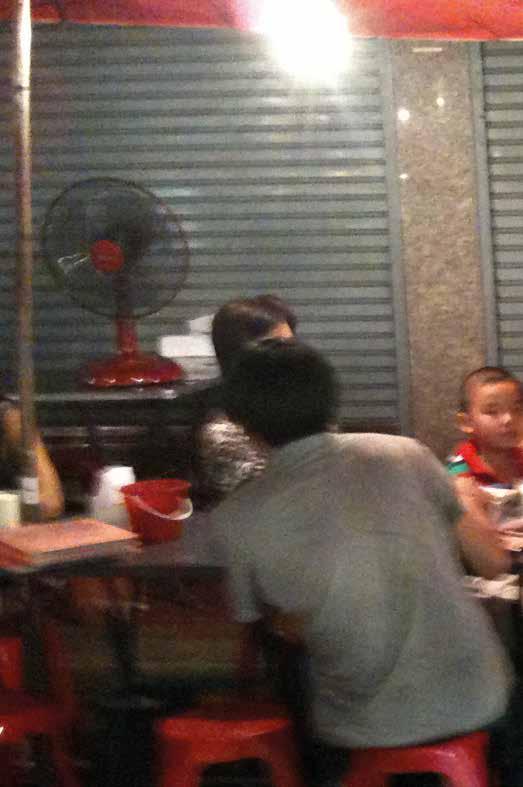
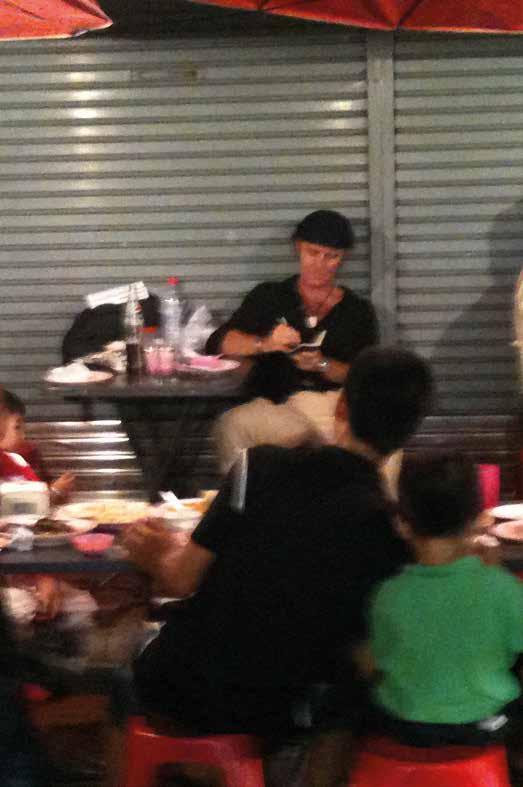
SUDDENLY, THE IMAGES ON THE SCREEN ARE THOSE OF THE FASHION TV CHANNEL. Som views the Italy of those fashionable assholes, all smiles at their stinking parties. So I tell her to do like me and say «Fuck you!» to them. She laughs and laughs and is embarrassed to say it.
IN THE NIGHT HER HAND IN MY HAND. IN THE MORNING SHE PUTS ON MY TEE-SHIRT. WITH HER I DISCOVERED THE MEANING OF THE WORD MODESTY.
MOUTH IS CALLED “PAK”, “TAA” MEANS EYES. ONE DAY I FOUND MYSELF ALONE AMID FOUR-HUNDRED MONKS AT THEIR PRAYERS, another day I saw three female students smile shy and embarrassed in front of a couple of farangs who were kissing in public.
SOMETIMES, OF A SUDDEN, AS I TRAVEL, THE MELANCHOLY OF FORMER LIVES ASSAILS ME.
I WENT OUT BEFORE DAYBREAK, AFTER HAVING WRITTEN ALL NIGHT LONG.
I love Banglaphu at this hour. Street kitchens that open dances that will last twenty hours and then monks with their little bowls. I stop to buy some food for them and then bow as I offer it to them when they pass by.
WHEN I GO BACK TO THE ROOM SOM IS AWAKE and trying to decipher my words on the sheets of paper scattered on the bed. Never has there been a more attentive and passionate reader. So I sit down, pick up a page and start to recount.
The immense sleeping Buddha barely contained in the building that houses him. The sound of the 108 little basins into which I drop each time 108 little coins. And the gold-colored cat that waits for me under the tree to purr and allow me give him the caresses that will accompany him in his nirvana.
disguised as a restaurant and managed by a silent and elegant transvestite give us the strength to go on and reach the Chao Phraia.
IT IS BEAUTIFUL TO WAIT FOR THE SUNSET CLOSE TO THE EMBARKATION POINT OF THE BOATS or to go around in a long boat skippered by an old man covered with sak yants and good-luck charms. To penetrate the canals that interweave behind the Wat Arun makes me happy. The wooden houses where I would like to live, write and love. The children who fish or play by diving into the water at our passage, the monks who feed the fish, the old women who wash their pots and pans.
THERE, IF THIS WERE A FILM, AT THIS POINT I WOULD MAKE A CUT AND CATAPULT THE VIEWER INTO HYPERMODERN BANGKOK, THE BANGKOK OF THE SKY TRAIN AND LARGEST SHOPPING CENTERS IN ALL OF ASIA.
In the super-luxury stores and in the largest and most comfortable movie theatres in the world.
WELL YES, I LOVE EVEN BANGKOK’S SHOPPING CENTERS.
Perhaps because I know that at the exit a tuc tuc can carry me to safety in a few very long minutes of hellish traffic, to another world and another era.
I WAS WALKING LATE INTO THE NIGHT AROUND THE FLOWER MARKET, ALONE.
I was swimming in the flat calm of the Aegean, the last swim of the summer. The same feeling of peace and the desire to go, to be able to continue, slowly, all the way to the end of the darkness, to the end of the sea.
(FLYING NOTES, 2014, 2015, 2016, 2017, 2018, 2019)
LIKE
IN THE MIDDLE OF THE NIGHT TO REMIND ME WHO I AM. A text message that ends with a question mark the need to know where I’ve ended up. It isn’t the same person writing but the words are always the same: “Hi Stefano, where in the world are you?” The words that follow are tentative answers to that question.
I have a mission to accomplish in this world actually, the other world. It would be to appear out of the blue in a lost place, and ask a girl who’s never been asked before to pose for me. In a wink one would notice shyness turn into shock then into awareness of beauty, femininity and power. My mission is a beautiful mission!
“WHERE
Yes, that’s right poverty and beauty. This is what I often without realising try to tell. I did so in Ethiopia where I shot two videos for the Storiezerolike project “From Ethiopia with pain” and “Life is a music video”.
I let the shower water pour on me for long. It doesn’t go, it hasn’t gone and it won’t go. It is stronger than the smell of burnt or misery that my suitcase releases when I’m back home. Deeper than voices and tears that come back and visit me in my nightmares and dreams Jimmy’s face and the stories of his gang don’t let me go my way I crossed those invisible borders which mark the barrios like wounds on a body, those barrios which are the most violent in the whole world. I met them, drugged and armed, spoke to them angry and moved and now I cannot leave them to their own destiny and they won’t let go of me.
I am on the dock of Bissau. A run-down capital of one of Conrad’s style kingdoms. On my right a burnt corpse of a ship. That’s where I would like to shoot my next scene, but it is dangerous and I have at least ten issues to solve. The tide has shamelessly exposed its muddy and insidious seabed. To my right dockers and lazy asses taking turns. We are such a reduced crew that I am scared we might be easily swept away. All of the images I want to shoot are pictured in my head, but I have to find new solutions every time. I have to be ready to snatch a moment of reality, add it and take it home. I take my hat off, and look at my self in a triangle shaped mirror hanging to a pole. I’ve lost my hair, but not my ideas. Nobody gave me the choice, had I been given one I’d have chosen my thick mane.
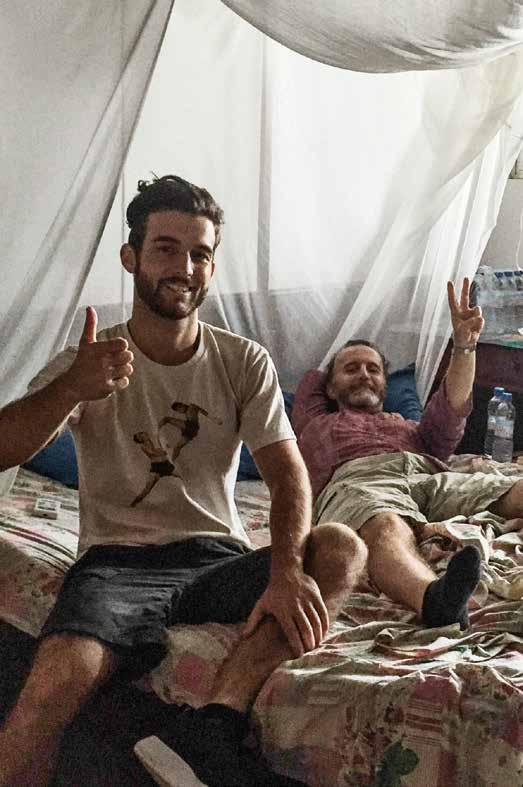
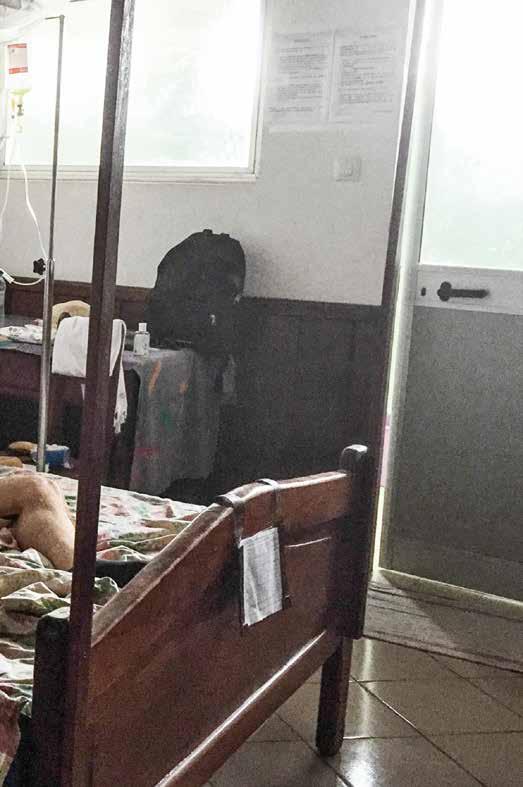
I walk on a waste carpet. Every now and then I turn around to look at Matteo there’s no need for words. It’s better to keep our mouths shut. I cross a boy wearing a ripped tee shirt which has: Never give up written on it. We are on our way into one of the slums, actually the most famous mountain on earth: Smokey Mountain. Try picturing a small city made up of waste, rubbish, trash trucks reach the gates of this smoky city and the fastest kids climb up in order to be the first ones. Everyone here has their task, an impossible mission, to live or better to survive, rummaging, dividing, choosing, discarding waste through waste. Columns of poisonous smoke follow like an optical illusion of a long colonnade, bare foot children covered in scabs wander looking for a gift. A brave nun precedes us wearing her immaculate uniform. If you breathe with your nose it burns. There’s an indescribable smell, I ask myself why I still feel good. To find an answer my mind quickly backtracks, it opens a door that takes me back to one of my first memories in my life, which was when Roberta my oldest sister would ask me to accompany her to the bathroom, as soon as I’d enter I’d go and quietly crouch between the window and the door. She’d start telling me a story, my luck back then was her slow intestine. It might also be my luck nowadays. The inspiration, my inspiration never
grows on a sterilised set or under a beautiful beach with palm trees. In a nutshell, to me a story that needs to be told must always smell of shit.
A little piece of my heart is missing, and I know where I’ve lost it.
On the Andes, in Ecuador, while we were filming “Sei proprio un bambino” for Unicef. Sometimes when the left side of my chest aches I sit in front of the screen and start the video and press pause every time I know where that piece of my heart might be.
In the tall grown grass where the girl played with the wind and the pink umbrella, in the dusty square in front of the church where the drunk newlywed and guests danced as if there was no tomorrow, or running away down the slope at breathtaking speed from skittish bulls, or between the lined up children who followed Miguel playing cymbals, or in the back of an old truck while driving uphill surrounded by small quiet Indio girls, miniature women wearing shawls and a hat. Or “Higher! Higher!!” over 3.000 metres, where I was sure the light would have been awesome, and where the light certainly was.
I am in Chorillo the infamous Chorillo in Panama City. The writing on the wall says: “I’m not on Facebook, my life is for real”
Dakka is a huge ant heap. Ants walking in line, carrying burdens that are three times bigger than them, in they go out they come, up they go down they come following a mysterious order a crazed strategy. At one point Dacca goes insane it’s as if a naughty boy starts kicking that ant heap. Logics and strategies go fuck off and you are also fucked if you are unlucky enough to find yourself in the middle. Right there, in the middle after a whole day spent in a brick factory in the stifling heat surrounded by working children with leather like skin and chimneys as tall as the neon ceiling. A day with slim alleys just like Mahatma, where you’ve scraped past the walls. And behind those walls, in pitch black restricted warehouses, built lofts as a way to use every little squared centimetre these invisible slaves of our enlightened century work. I saw the white of their eyes and I cannot forget. Then there’s the station, a trap for young girls
kidnapped and taken God knows where. Clouds of mosquitoes with the first evening lights whisper the Latin names of different malaria. There you are sweaty, dirty but you feel unreasonably happy. You jump on the van that has the duty to take all of this exhausted crew to bed and instead of finding yourself on a flying carpet you are dreaming of you find yourself in the pulsing heart of an insane ant heap. And you become part of this overall insanity. Three hours and a half to drive through 5 or 6 kilometres you laugh, then curse the whole world you talk, you keep quiet but then you save yourself by pressing play in your mind those colourful images of those dances enriched with twirls and elegant hands towards the sky of those orphaned girls that you’d just filmed only the day before but to you it feels like eternity.
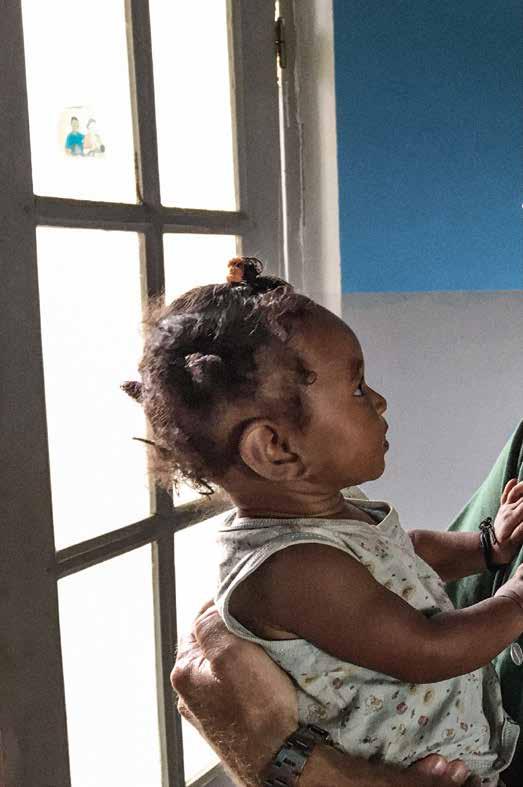
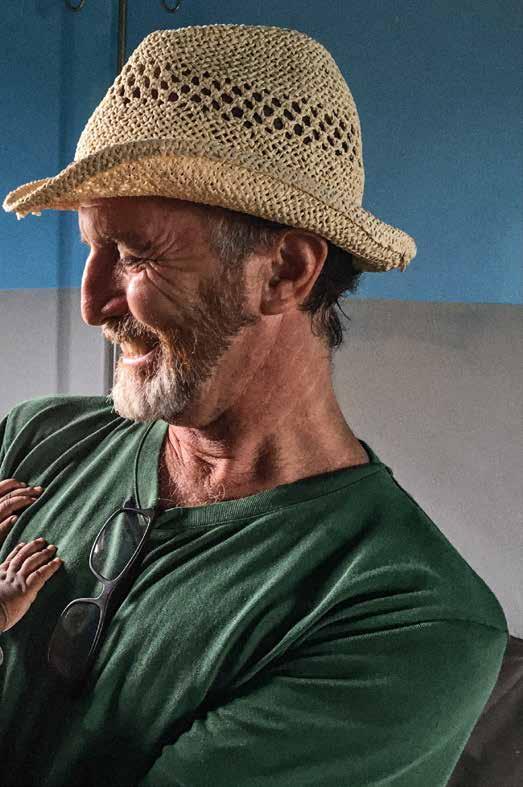
After I did that job for Unicef, my need to take pictures returned and not only with my Iphone. I must have stated this somewhere, I don’t take pictures. And vice versa. That’s how it has been and until now that’s all that is left from my solitary trip to Malaysia and Singapore; a number of photos, visual notes A Hindi party on the Isle of Penang and that smile that was worth the whole trip, a beer and a skewer after a 14 km walk, ancient colonial homes in Georgetown, ginger flowers, thief monkeys in the huge holy cave outside Kuala Lumpur, a women’s dress left on a bench to dry that looks more like a sleeping ghost, Buddhist temples right next to Hindi temples the latter next to Mosques, the runways between skyscrapers as tall as trees, skyscrapers shaped like trees in the park facing the ocean in Singapore. One hour meditation with a few seconds of real meditation huge sierras and Chinese chess players, an old lady’s gaze holding banknotes following, we then see a man with shiny black hair in the market stalls, his head leaning down lost in his unknown thoughts. And then there’s my curiosity, my solitude and one of Marco Aurelio’s quote echoing.
I’ve lost my jotting book, with all of my notes of my days spent in Madagascar. But strangely enough when I came back I tweeted my mood that read something like this: I liked everything in Madagascar even my night at the hospital. “at last”, having witnessed for years and years every single member of my crew being hit by all kinds of syndromes, infections, illness and sickness it was my turn in the Grande Terre. Actually it was our turn, Mattia and myself. There’s a picture that shows evidence of it. I love that picture. The day before was amazing, we had filmed immersed in an ocean of children. With them I did the same the wind does with the waves. The waves had reached the very top. Screaming, sweat and energy at it’s best and happiness. That same night retching, vomiting and a fever. Shit Africa, you always do this to me. A fine line between happiness and pain, but as I’d tweeted that night did not delete the dawns and the sunrise, the holy tree, the women with pineapples on their heads my first African swim ever, children who’d undergone surgery running with their feet not as crooked towards the sea, the old colourful Renalut 4, fighters triumphantly held under the Sunday light, five Italians with their grey hair who quietly watch the
sun and their lives go down the crazy music and my new friends’ insane dancing, the flash on the dogs masters of the beach surprising almond shaped eyes on black girls. I’ll return, to look for a wife. Fedor Dostoevskij used to say: “Beauty will save the world”. I hope it saves me.
During the winter, I went to Korea. I flew from Bangkok. I left the heat and a smile I really liked and still can’t explain why. It was cold in Seoul, the light in the sky reminded me of the neon lights of a waiting room and the smiles, if there were any were hidden behind the surgical masks. It looks like the beginning of a bitter confession of a tragic mistake. It is not Seoul’s fault but mine. While I wandered for hours through the gardens and streets, while eating at the market standing or laying down in my hotel room, while spying on other people’s lives and capturing that moment behind their back I didn’t quite understand that what I’d left behind was the beauty in a moment which I would have never found again.
Under the mosquito net of my single bed in chambre vingt-quatre of the Hotel de Paris in Kaolack, I’m writing the first and probably the last lines of this trip to Senegal. Only those who have been to Kaolack and have had the luck and the opportunity of staying here might understand the genius and imagination of the human being who gave this hotel its name.
Four years ago we landed at the new Airport of Dakar. It had been launched the day before. Unloaded luggage had been running, two hours and twenty minutes later, suitcase in hand we exited towards the sunlight. Our new friend Mamadou was out there waiting for us. L’harmattan an old acquaintance of mine was also waiting. That wind I met in Burkina Faso for the first time almost twenty years ago. After we spent the night in the outskirts of the capital we left for Kaolack. Half an hour into our journey when our truck stops, like a stubborn or frightened donkey on the railway. We push it away before the train comes. We then wait, negotiate and load our luggage onto another vehicle. Holy mother!
Senegalese women who royally sway their curvy figures. There’s no veil that can hide, nor poverty that can humiliate such evident femininity. We are here scouting, I’ll be filming the story on the “talibé”,
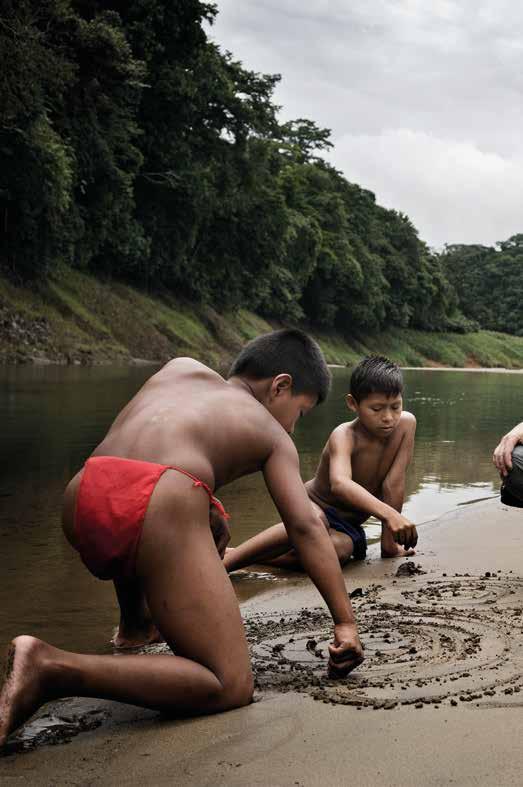

which means disciple. Children from poor families that are sent away to study the Koran but are often used by the Marabouts as beggars. The Sacred Heart is an all girl’s school in the posh area of Parioli in Rome known for the young girls that attend who are a little let us call them easy… While here it is an extraordinary reality that gives more than 500 children the opportunity to study and grow far from the streets and its misery. Kaolack is a small city five hours away from Dakar it offers one of the biggest markets in West Africa. No tourists. Or backpackers. Dust, sandy roads, rundown buildings, carts pulled by donkeys but smartphones and new supermarkets as well.
Senegal’s development financed by foreign capitals shows its new figure here. I dance at Father Pascal’s party I then take pictures of their smiles and the future which is all strictly made in Africa. Tomorrow is our first day filming and I know I won’t be writing anymore. Not even about Goré, the small island we’ll be visiting before we leave.
The open door that leads to the sea where seven million human beings were taken on board and turned into slaves, I will not forget.
If I explain the title, I’d be giving the story away. During our recce among rocks and baobabs, a kid holding a monkey arrived. All along I shot with the same setting I took the photos with. Black and white, hard contrast, flash and a 50 centimetre focus. Malawi to me, is going to be that very first shot. A surprised monkey with eyes wide open, his owner’s dark figure and in the background the branches of a thousand - year old trees. You might never see that monkey, but should you have time to waste and you start looking deep into my wrinkly eyes or risk going into my unexplored website you’ll surely find that picture somewhere. That’s right, that photoflash of the monkey comes first. Even before the swim at dawn in that perfect copy of the sea that is Lake Malawi. With the kids, Mattia, Francesca, Manuele and the Schistosomiasis parasites. Yes, before anything else. Even before those wonderful heart breaking songs sang by the prisoners at the Zomba Prison, and before the breath taking landscape we thoroughly enjoyed from the plateau. Yes, it is however true that the wood cutters we crossed at night with their godlike weight on their heads or on their stoic black bicycles have also found a place inside me. Just like those 700 gr human beings fast asleep in the life saving incubators at the Saint Joseph Hospital, they’ll also have a place in my mind. Or the girls with
the crucifix on their necks and their dark green uniform while they cross the area struck by our camera’s viewfinder. Or the village’s nutcase who listed all of the kings of Malawi whose photo I took while he was pointing up at a small cloud in the sky. Yes, I’ll also remember that small cloud. And the prehistoric minerals sold by young teenagers as well as the freezing mountain waterfall that made me shiver from the cold and happiness. When someone will talk about Malawi I won’t be able not to think about the colour purple of the jacaranda flowers. I will. But only after having thought about my photoflash and about that monkey. Yes, because those surprised eyes, actually those stunned eyes must have been the same ones she saw when she looked at me.
Since I was a child and then a teenager I have always been at war a war that has been fought in my head. At times on the streets I felt or better I wanted to feel out of place. I didn’t want to give into any trend I was in searching something more. Then Mattia was born and I started finding that reason. In his name then in Francesco’s and then Margherita’s I am in no way saying that I became a different person, or that I lost my deepest nature but their smiles, tears, their sudden growth their torments have turned me into a man of answers. It was my duty to show them every blessed day the face of this damned earth. Now that they’ve moved I find myself trying to come to terms with my recklessness that I had then I look for peace in my solitary trips and as may you may have understood, at time I find it and other times, I don’t.
IF YOU SAY LONELINESS TO ME, THE FIRST IMAGE THAT COMES TO MIND IS A MAN, NO LONGER YOUNG, NOT YET OLD. A HANDSOME GUY.
In a laundromat at The Mission, in San Francisco, California. The laundry machine has finished its job and he now folds up with care, or rather with know-how, his spotless clothes.
I WAS THERE, SURROUNDED BY MY CHILDREN WHO STILL BREATHED EVERY BREATH IN UNISON WITH ME.
I was there, with a young and beautiful woman with black hair and a permanent declaration of love for me.
KNOW WHAT? I TELL YOU THAT LONELINESS STRIKES THOSE WHO ARE COURAGEOUS. You aren’t afraid of it. You don’t let it decide things for you. You say, either all of love or the most female of women or the friend who’s a brother or the life most like life, or nothing. And when the nothing comes, you are there on the street, alone, waiting for it. You extend your hand to welcome it and you don’t know that you will never again raise a hand to wave it goodbye.
AND YET THAT MAN FOLDING THOSE TEE SHIRTS, THOSE WORK PANTS, THOSE PAIRS OF UNDERWEAR, I REMEMBER HIM WELL. THERE WAS NO ONE AT HOME WAITING FOR HIM, I COULD HAVE BET MY HOME ON IT. NO ONE WOULD HAVE IRONED HIS SHIRTS, THAT’S WHY HE FOLDED THEM CAREFULLY. AT LEAST HE WOULDN’T HAVE FELT THAT THING MISSING.
ALESSANDRA WAS MY WIFE. SHE HAD A SISTER, ENRICA, I HAD KNOWN HER SINCE WE WERE KIDS. CANCER LITERALLY CONSUMED HER. Despite her firm intention to remain on this earth. The last book she read, amid atrocious pain and useless tranquilizers, was mine. Alessandra told me that, on one of the last nights, she woke up screaming. She was aghast, she was dying. Then, as she struggled to regain her breath, she told her she was afraid, afraid.
I WASN’T THERE. BUT I SWEAR TO YOU THAT, IN THE DAYS THAT FOLLOWED, I WOULDN’T HAVE BEEN ABLE TO SWEAR TO IT. IT WAS AS IF I HAD LISTENED TO THOSE WORDS WITH MY OWN EARS. AND SEEN THAT TERROR WITH MY OWN EYES.
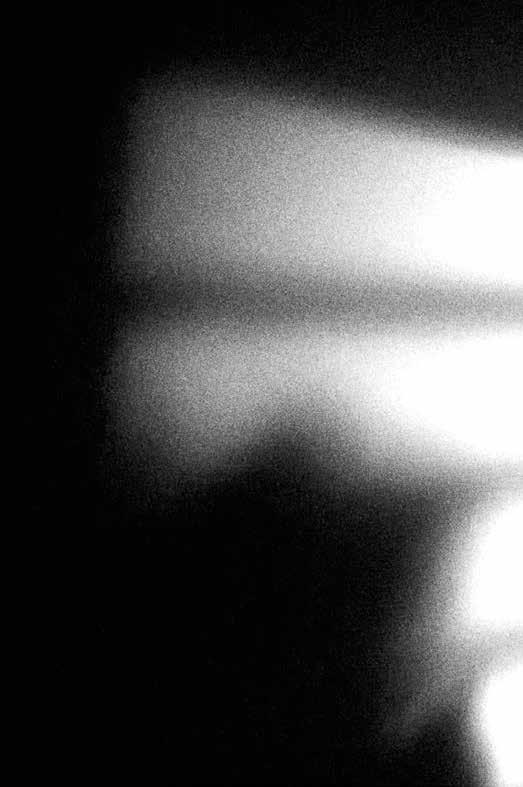

I DON’T KNOW WHAT IS HAPPENING TO ME, BUT I THINK IT HAS TO DO WITH A DEARTH OF KISSES. I THINK IT HAS TO DO WITH THAT MAN IN THE LAUNDROMAT AT THE MISSION, IN SAN FRANCISCO, CALIFORNIA.
It moved back and forth, then left to right as if wanting to erase its traces from someone pursuing her. I was literally glued to her. For minutes on end.
Had you been following me for these ninety days, through forests, streams, fields and paths trying to understand my mission you would have also lost.
We’ve been listening to Murder most foul, Bob Dylan’s new never ending song, for at least nine hundred never ending times.
One day at a time the woods have revealed its most intimate part like the most expert of the geishas. I’ll remove all doubt, yes we made love. Every single day was slightly different from the day before, but always enough to be unique and unrepeatable. My zen master was the only one to be still and eternal: a squared stone in the middle of the path, three baby like smooth faces and the moss green north face.
The appearance of tiny leaves on the cold branches. The mysterious fog. At times I’d go back. But I’d also push myself forward like never before. The river dressed up like a stream said its prayers, and I my poetry. My senses developed faster than my calf muscles did. Through the wind I learnt to recognize the smell of the coming rain and the fleeing boars.
One stormy insomniac night I shaved my head like a happy monk that watches over my bedside table. The morning after I found branches and hair on the ground but I also found a new smile reflected on the mirror.
the nest of a woodpecker on an olive tree trunk, my body between rocks inside the freezing transparent water, a dancing fox, in the most unnatural silence, in the most natural solitude. I slipped one step after the next as if they were rosary beads, Tibetan Malas beads, the stars of an endless constellation. I inhaled good night and exhaled good morning every single night and every blessed morning.
I LEFT MY TRACES NEXT TO THEIRS AND TRIED TO GET LOST, WITH THE HOPE TO FIND ALL HUMANITY AGAIN. OR AT LEAST THAT ANT.
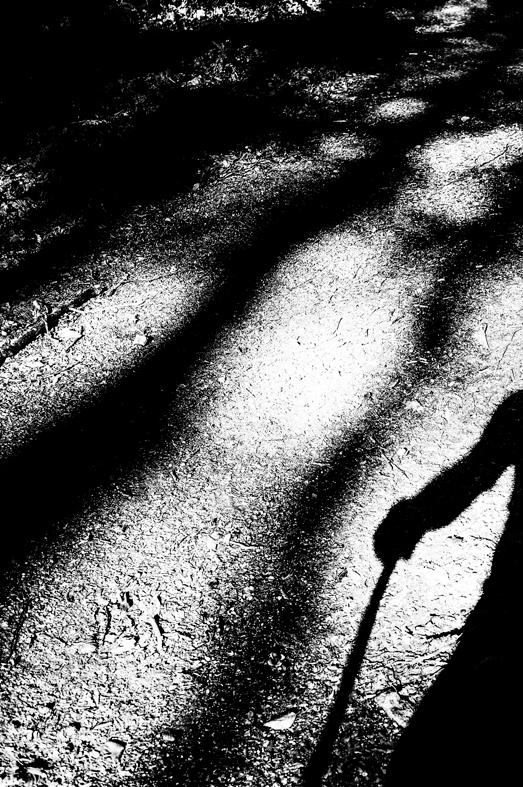

Forsaken by normal life. By life as they had taught us to consider it. Because when I am in that outside made of darkness and favelas, mud and slums, markets and sweat, I make great deals. I give one smile and in exchange I get ten, sometimes one hundred of them.
SO, WHEN I COME BACK and cross the streets of my city, I look at my face reflected in the windows of the cars of men and women that are stopped in the traffic and I see a beggar. I feel like a poor person. I walk about in the same state of amazement and confusion as a beggar who was wealthy only a short while ago.
I can fail to eat, or do so only once a day, like a monk. I can fail to sleep, or do so only for a few hours a day, like a hermit doing penance. In this way all my senses are alerted and open doors of existences to me that were unknown to me only a few instants before.
I LEARNED IT IN LOVE: to understand one another, one doesn’t need to speak the same language. On the contrary, without that shortcut everything becomes more spontaneous and smiling and mysterious.
BUT THERE IS A CHARGE TO BE PAID. AND THERE ISN’T CASH OR CREDIT CARD THAT CAN COME TO YOUR AID. IT’S A CHARGE THAT ACCRUES WITH EACH NEW TRIP, EACH NEW ADVENTURE.
LIKE AN UNREPENTANT ALCOHOLIC, for years I had kept on saying: «Put it on my bill, I’ll pay it next time.» For a while I got away with it, but in the end they came looking for me, dragged me out of bed. The faces of the countless ones with whom I have crossed paths, glances and hearts in these last fifteen years of my life.
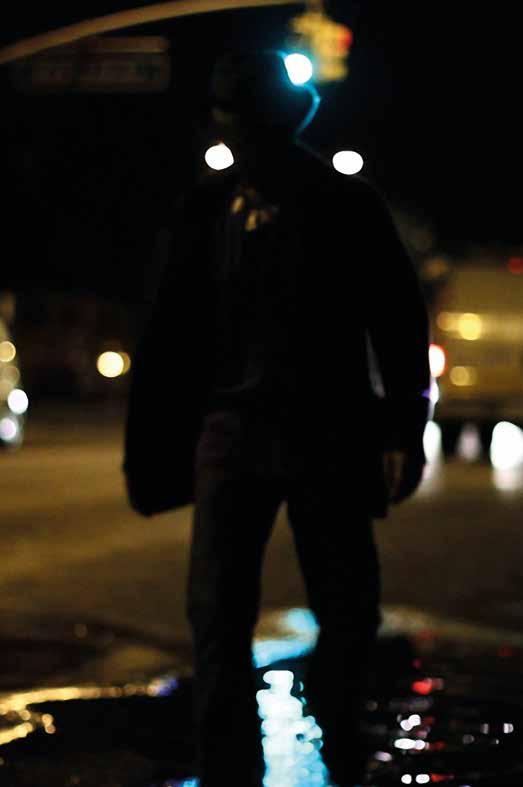
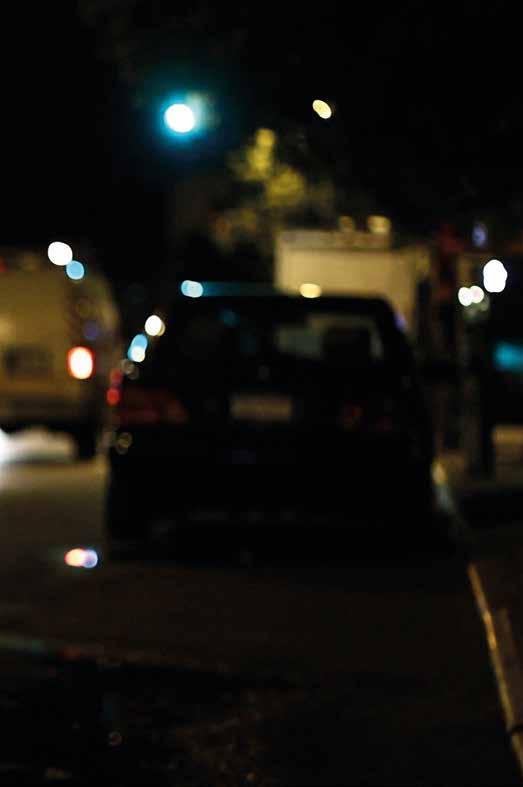
I
Concept: SMP+
Texts: Stefano Maria Palombi
Editor: Valentina Palombi
Images: Francesco Zizola, Gianmarco Elia, Erasto Truijo, Mattia Palombi, Bernardo Notargiacomo, Paolo Marchetti, Francesco Ferrari.
Translations: Lyrical Translations www.lyrical-translations.com www.stefanopalombi.com
forgot about my face